| ID |
Date |
Author |
Subject |
|
291
|
Tue Jun 7 19:19:34 2016 |
CG, TD, DK, AE | Wednesday 8th June | (4 mm Al mask was put upstream of AIDA near 20:20 on 7 June)
01.15 Run R1219 started on neutron rich setting.
Temps ok. Leakage currents ok.
Plate with holes in front of AIDA , after F11 plastic. F11 plastic count rate ~700cps.
Keeps getting 'Attempting resychronisation' message in merger terminal window.
driver 0 10205 consuming almost 100% of CPU. Merger ~20% and data links ~1%
See attachments 1-4
02.15 Run R1220 n-rich setting (BigRIPS run 1218, EURICA off)
EURICA team retires for the night and cannot get it up and running
Biases and leak shown as attachments 5-6
Merger info is shown in attachments 7-9
CPU Load in attachment 10
Timestamps against the ADCs and also SYNCS, respectively, attachments 11 and 12
3:31: Run stopped for the operator to tune the beam
F11 plastic rate was 700 cps (~heavy ion injection rate)
3:43 Run R1221 n-rich setting (BigRIPS 1219, no EURICA)
4 mm Al mask was removed.
Pause calls vs. Timestamp is attachment 13
Merger screenshots are shown as attachments 14-16
F11 plastic rate is 850 or 900 cps after retune
ADC v Timestamp is shown as attachment 17. It can be seen the rate was roughly constant before the operators stopped (corresponding to a long gap of no hits, but now we go up and down quite a lot in a rather ugly way
CPU stats (driver to write to HDD in green, merger in red) as attachment 18
At the time of ~90 in attachment 18, the linkers start to consume all available CPU resources, shown as attachment 19
04:35 Run R1222 n-rich setting (BigRIPS 1219 / 1220)
Ask the operators to reduce the beam intensity by "1/2" -> F11 plastic rate goes from 850 cps to 170 cps, so more like 1/4 effectively
Merger stats are shown as attachments 20, 21, 22.
nnaida1 and nnaida24 seemed to often show pauses (among other ones)
trying to understand what's going on with the display in Midas, because it has looped around to time zero and is putting new data on to the old data...?
It seems this condition is much better than before, though
05:33 stop the run
05:38 R R1223 n-rich setting (BigRIPS 1221)
Ask the operators to resume the previous beam intensity. (Now like 600 to 800 cps at the F11 plastic)
attachment 23 shows the beam coming on near time zero. within <100 seconds, the driver has to fight with many link64 instances and cannot operate correctly
we understood how to clear the midas histograms so that we can make sense of things. attachment 24 is ADC, and attachment 25 is pause.
you can see some data come smoothly until the system locks down
06.11 R1223 stopped.
06.30 Started run R1224.
Moved Pb bricks downstream of F11 plastic inwards, from a separation of 15cm, to 4cm in an effort to reduce rate in AIDA.
F11 plastic rate ~900cps.
No change to vis scalar rates and data still being dropped.
06.45 Stopped run R1224.
MIDAS plot of ADC vs Timestamp (attachment 26) shows characteristic behaviour.
Upon writing to disk, for the first minute or so link64 processes consume minimal CPU power. But then very quickly they ramp up consumption and ultimately choke the merger (it seems).
This is reflected in the ADC v TS plot. Continuous ADC data for first ~1min.
06.54 Moved Pb bricks to separation of 2cm. Started run R1225.
AIDA vis scalar rates reduced slightly, but no change to CPU usage and usual happens - data lost, link64 CPU usage spikes and chokes merger (seemingly).
F11 plastic rate ~900cps.
07.00 Run R1225 stopped.
SYNCs stopped being produced. Lost contact with nnaida1.
07.25 Pb bricks moved to 1cm apart. Run R1226 started.
No change to CPU usage (link64 still hogging everything). MIDAS online monitor lost in power cycle so cant view in real-time, but anticipate same outcome.
Sopped producing SYNCs 07.39. Run 1226 stopped.
08.20 Some trouble restarting DAQ and merger.
As nnaida19 has lost the 'H' for histogramming on the run control page, nnaida21 has now lost the 'X' for data transfer (see attachment 27).
Removed nnaida21 from merger and normal state of play resumed.
4mm holey plate + the one attached to it we installed dowstream of F11 plastic.
08.50 Run R1227 started.
CPU usage by link64 ~1% and driver ~70%, much more reasonable. When reloading merger web page, channels flash between bright green and olive. Good.
09.09 Changed to reference mass setting. Run R1227 stopped.
09.12 Run R1228 started on reference setting with holey plate still in place.
R1228 stopped 10.32 (for B2F/F11 entry)
|
| Attachment 1: merge_rate_resync.png
|
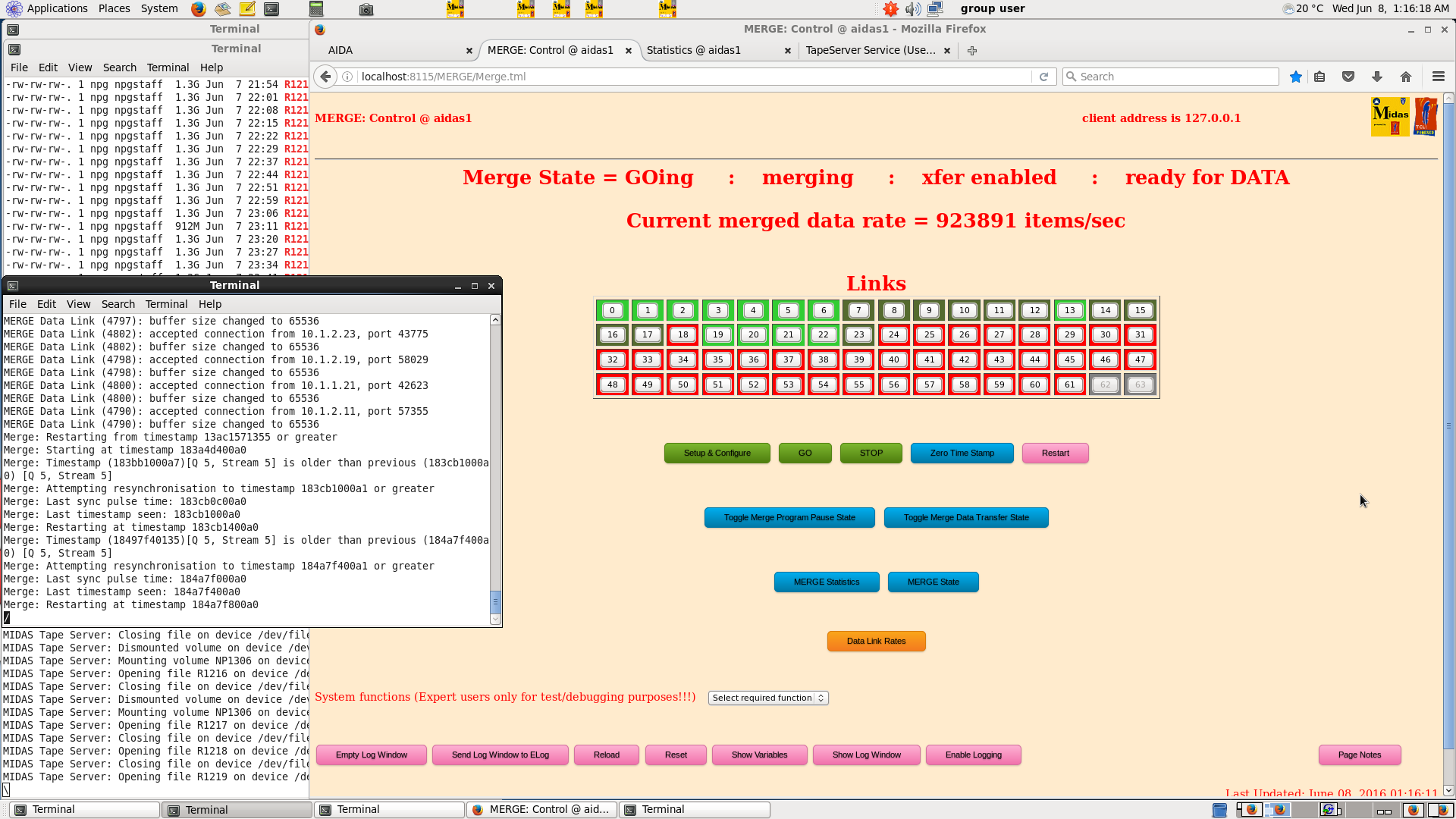
|
| Attachment 2: merge_resync.png
|
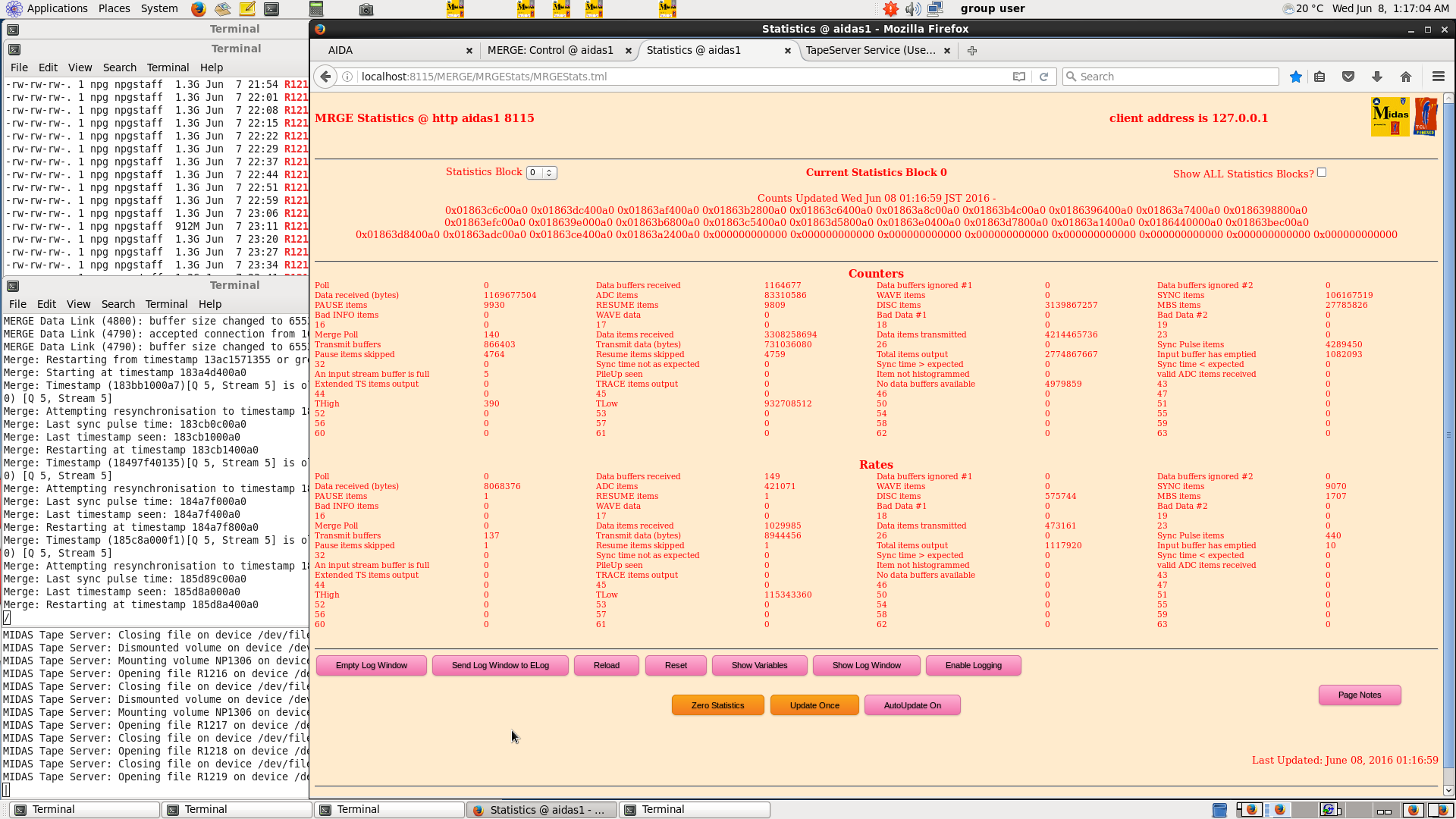
|
| Attachment 3: tape_resync.png
|
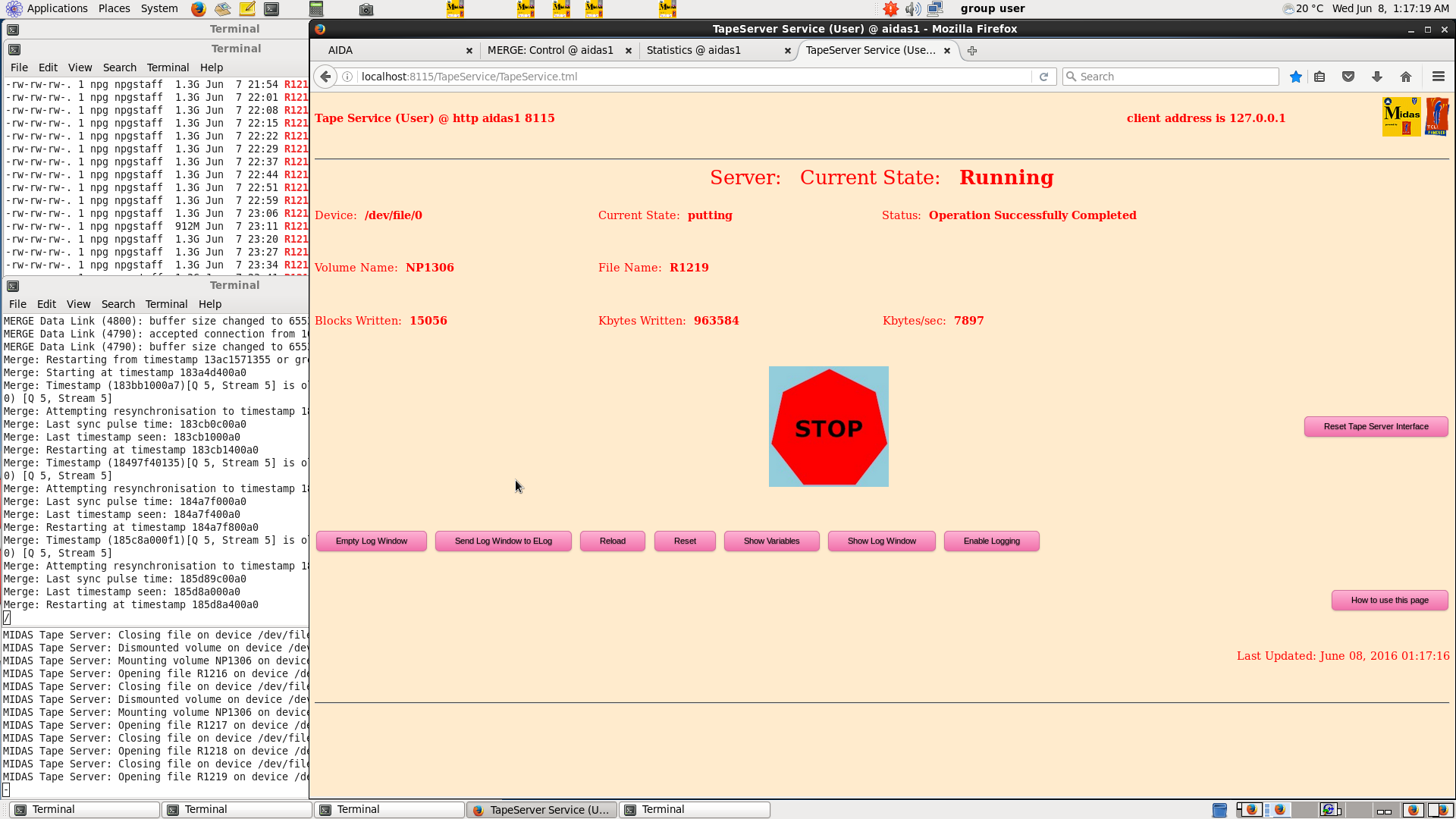
|
| Attachment 4: disk_driver_CPU_usage.png
|
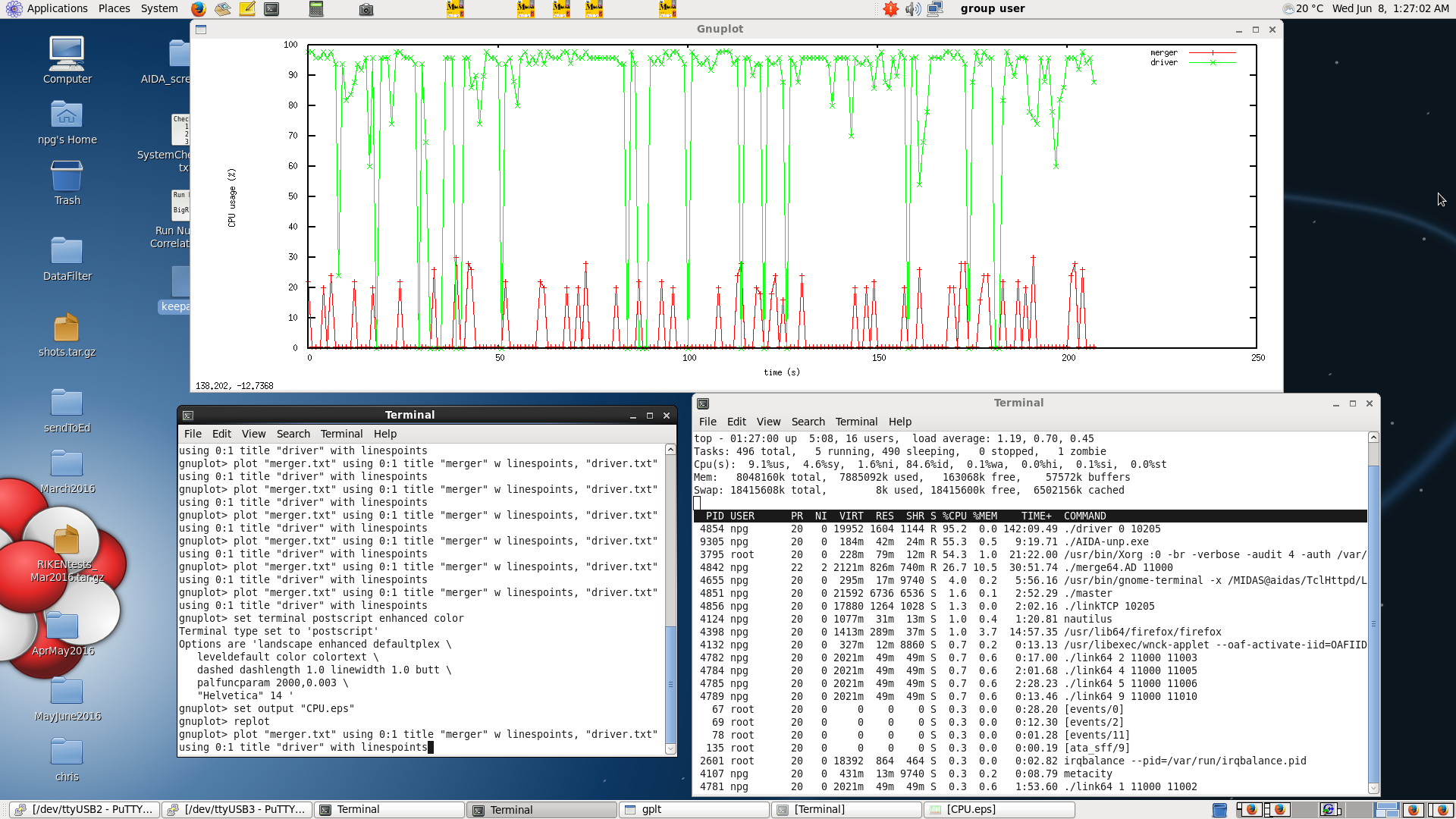
|
| Attachment 5: bias1_R1220_0806-03.10.png
|
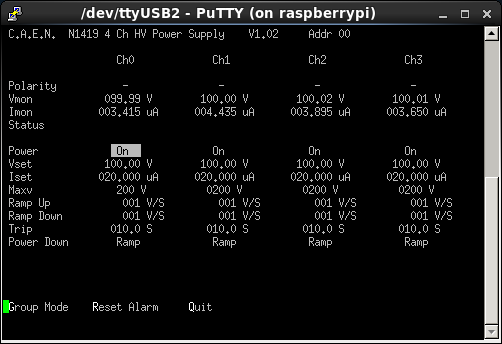
|
| Attachment 6: bias2_R1220_0806-03.10.png
|
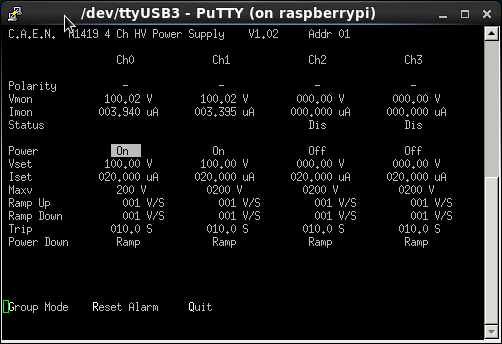
|
| Attachment 7: R1220_MergeControl_0806-03.12.png
|
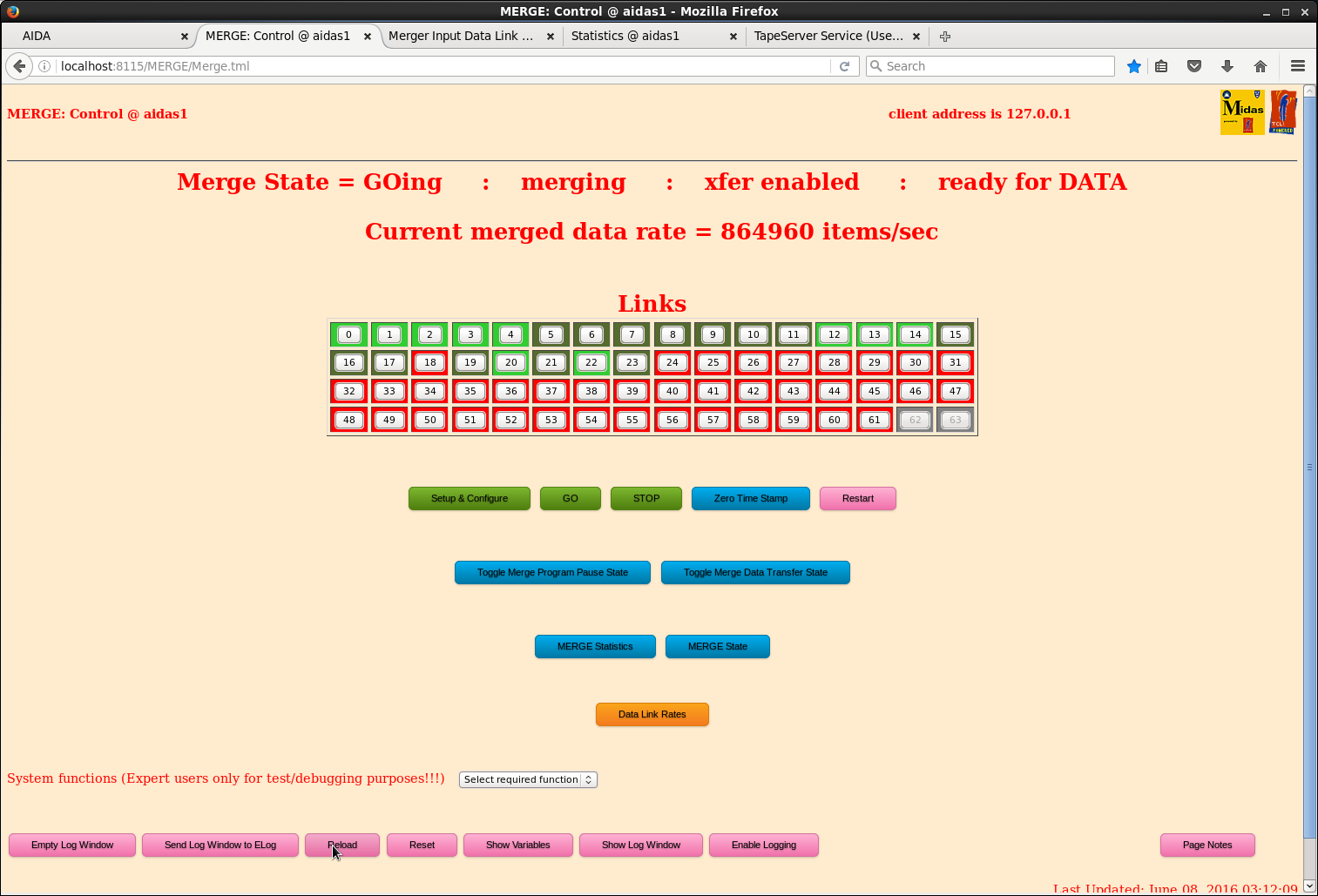
|
| Attachment 8: MergerLinkRates_R1220_0806-03.13.png
|
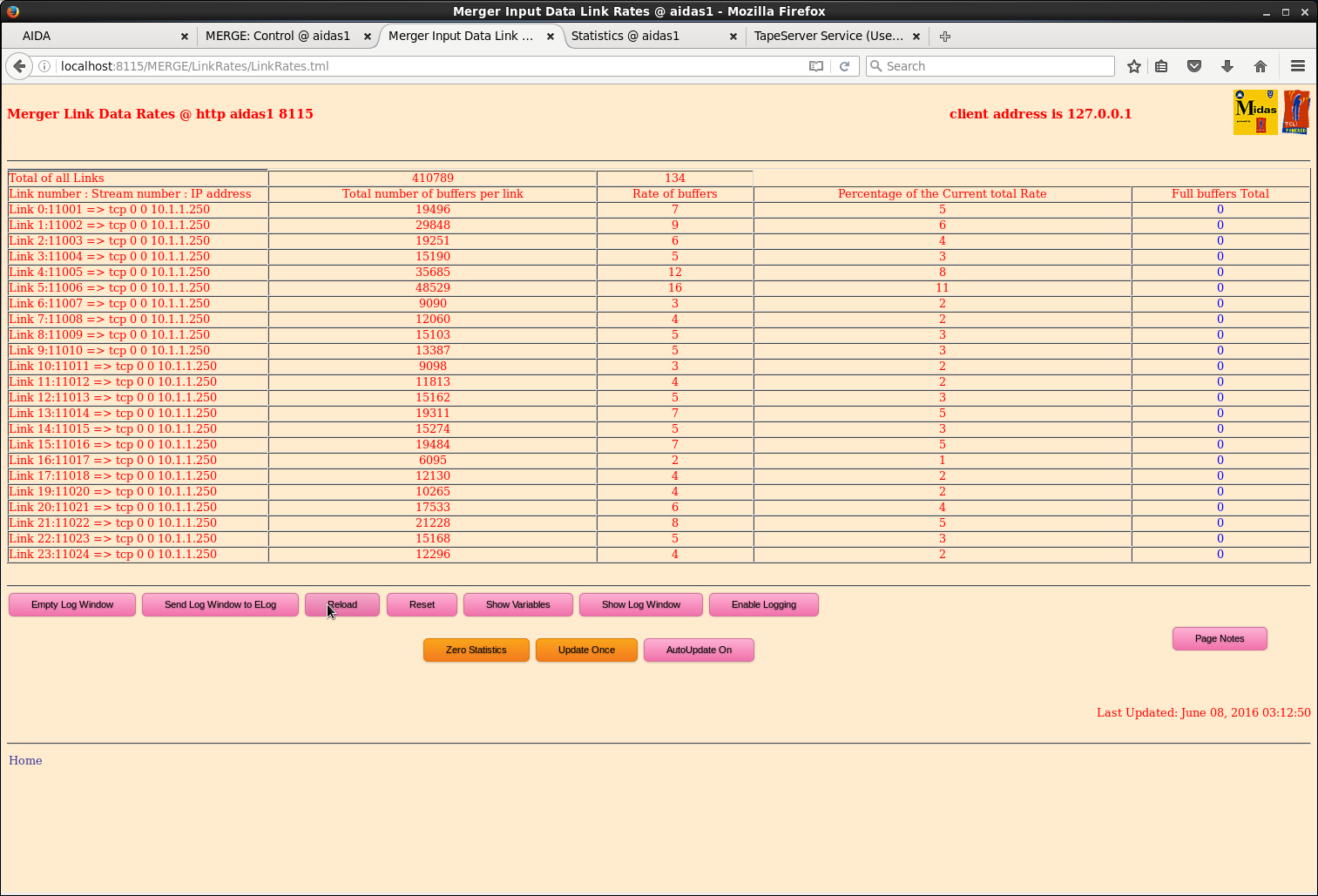
|
| Attachment 9: MergerStats_R1220_08-6-03.13.png
|
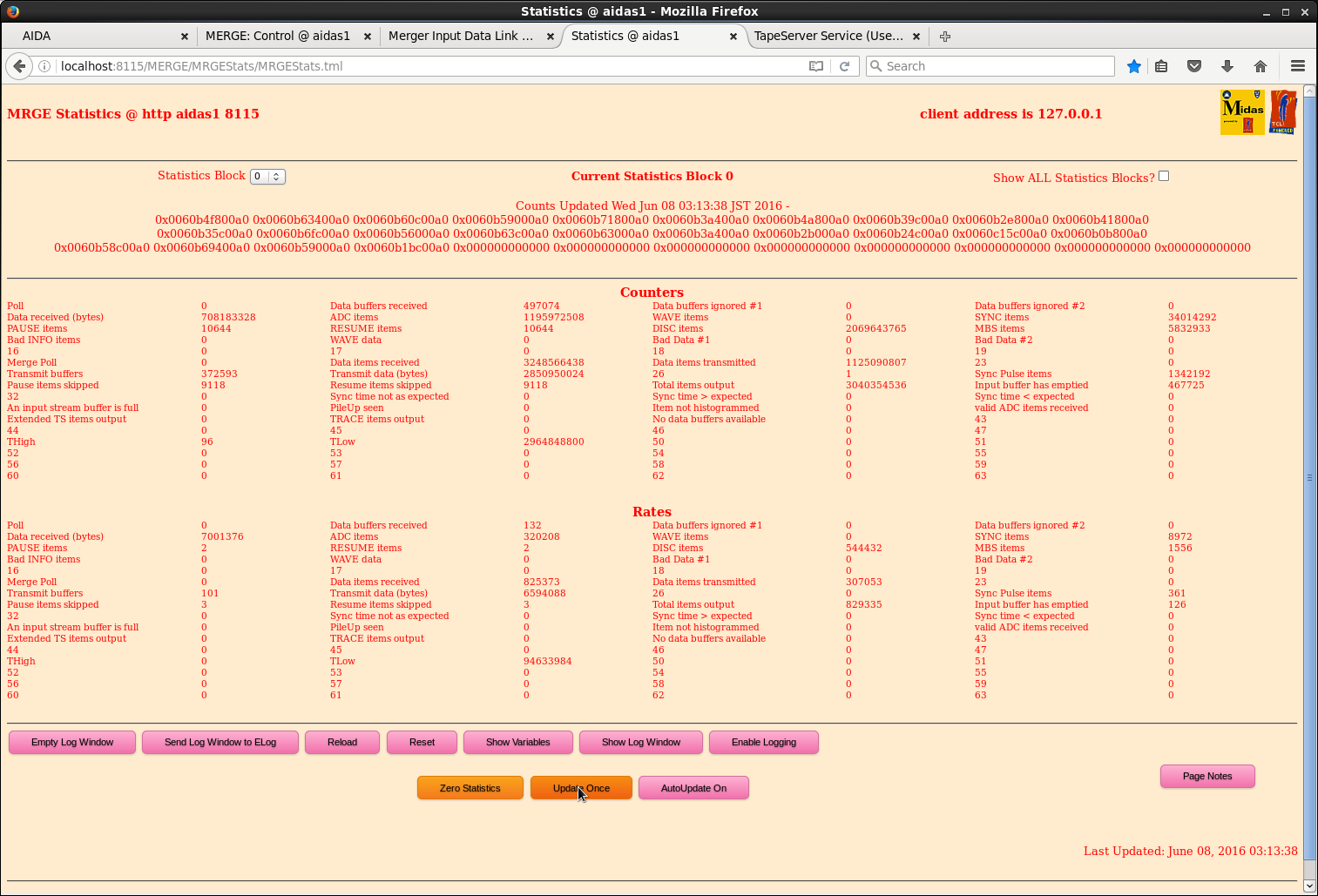
|
| Attachment 10: cpuload_R1220_0806-03.16.png
|
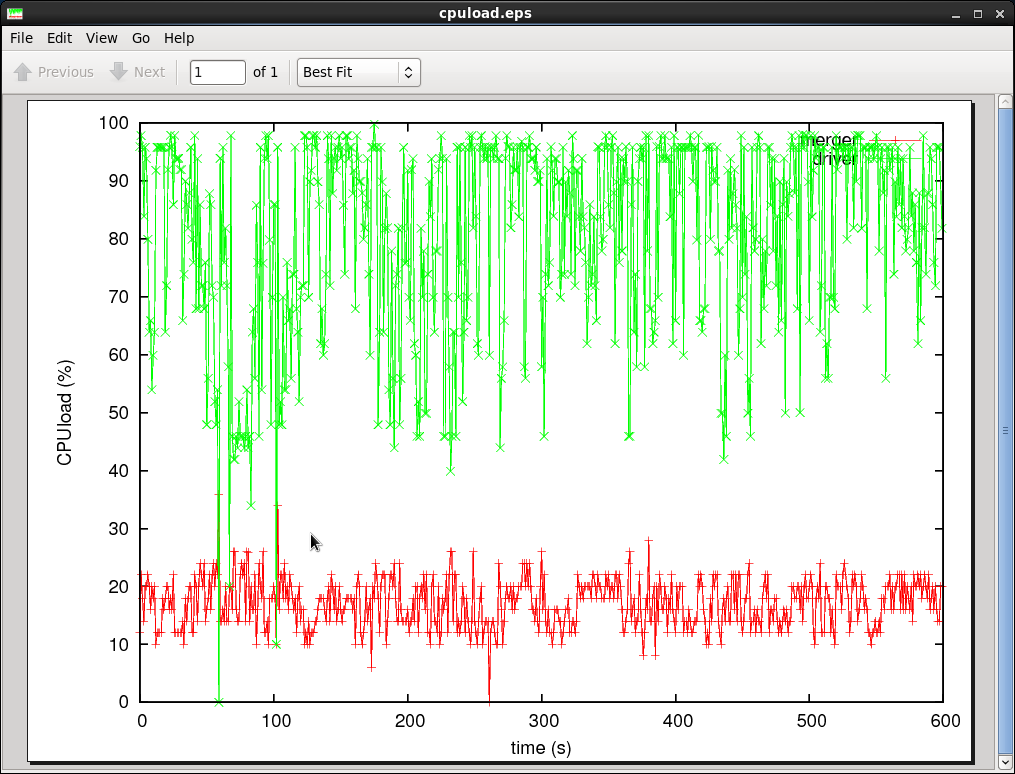
|
| Attachment 11: ADCvTimestamp_R1220_0806-03.17.png
|
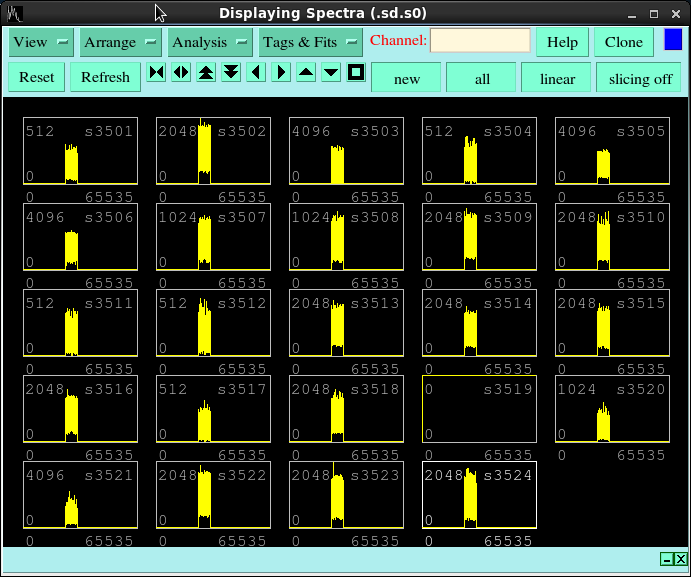
|
| Attachment 12: SYNCSvTimestamp_R1220_0806-03.18.png
|
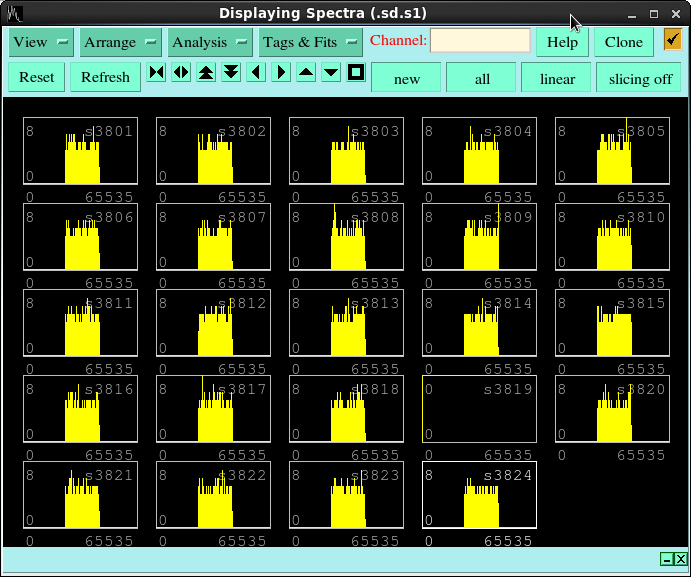
|
| Attachment 13: PauseVTimestamp_R1221_0806_03.51.png
|
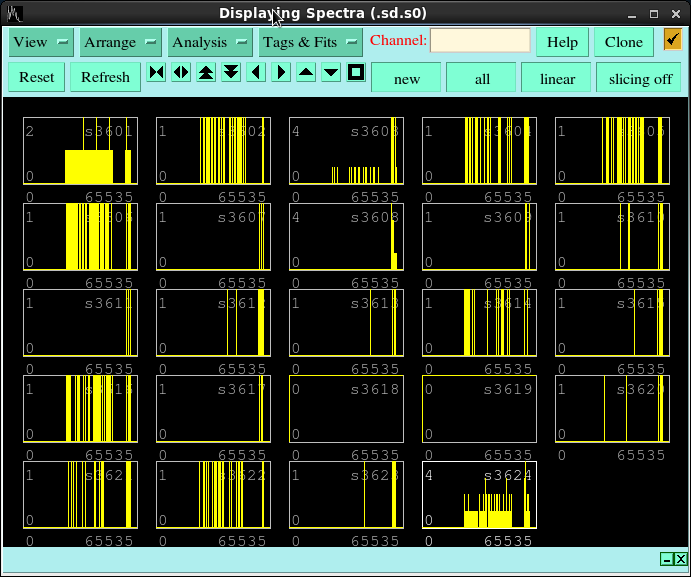
|
| Attachment 14: MergeControl_R1221_0806_03.50.png
|
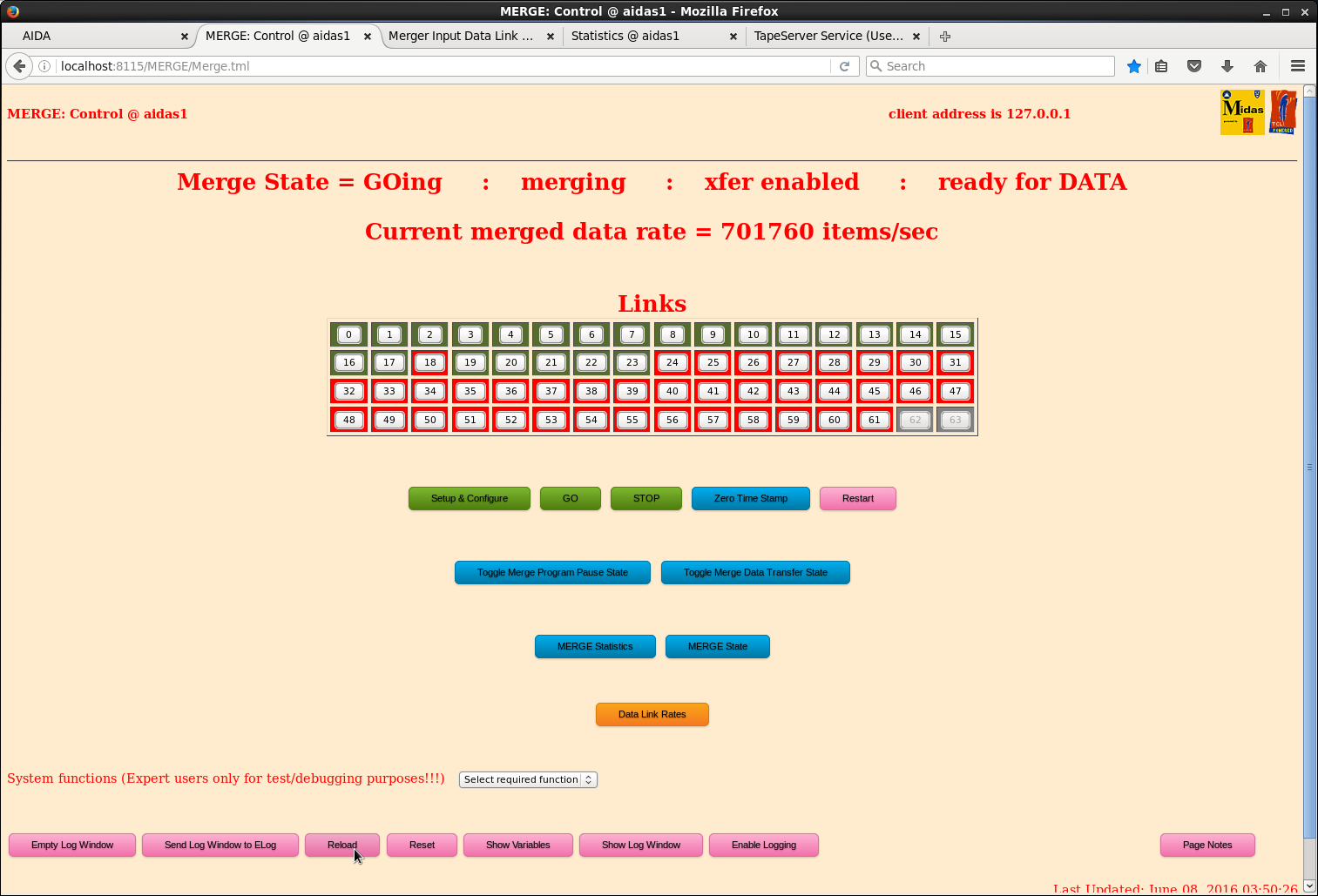
|
| Attachment 15: MergerStats_R1221_0806_03.50.png
|
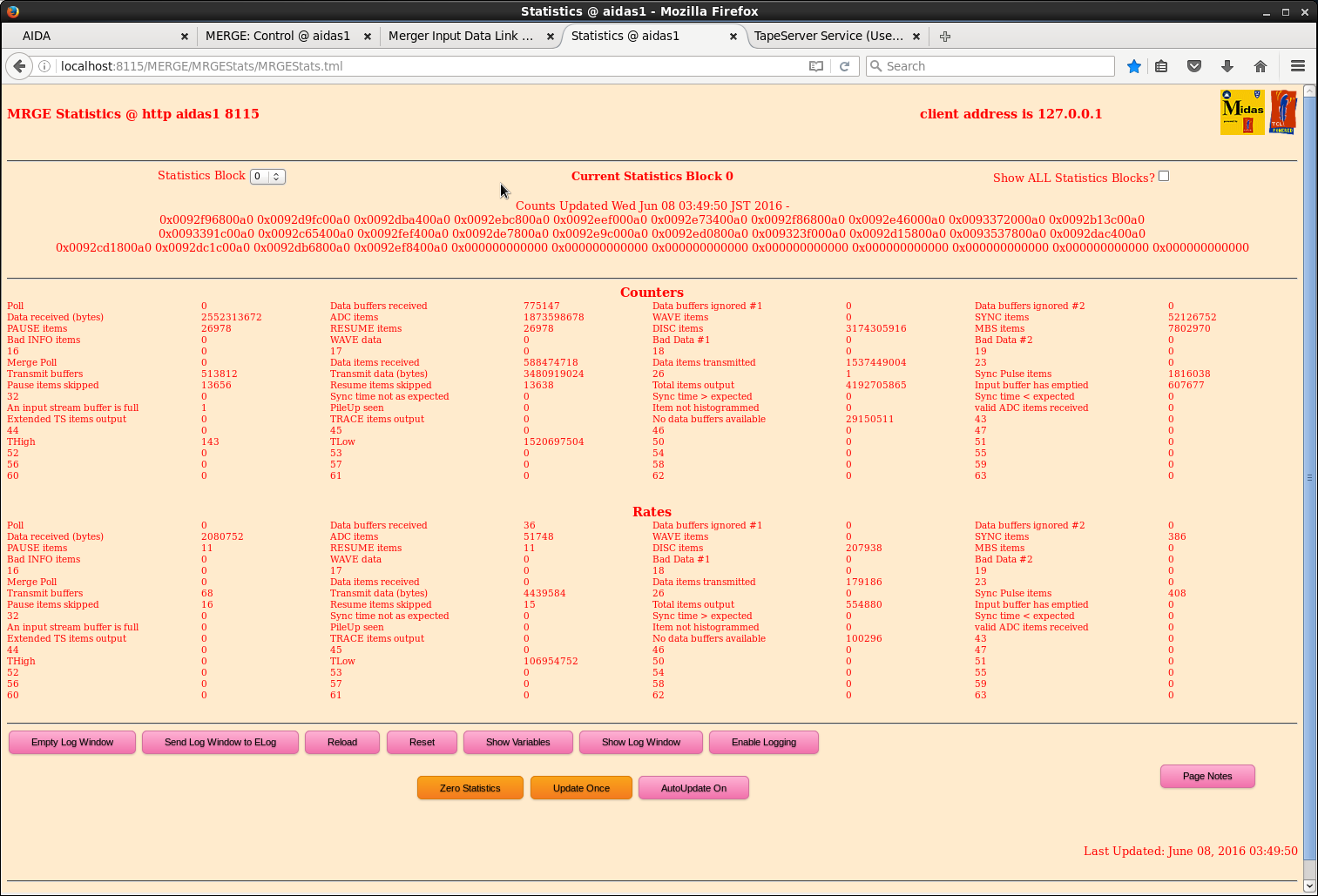
|
| Attachment 16: MergerRates_R1221_0806_03.49.png
|
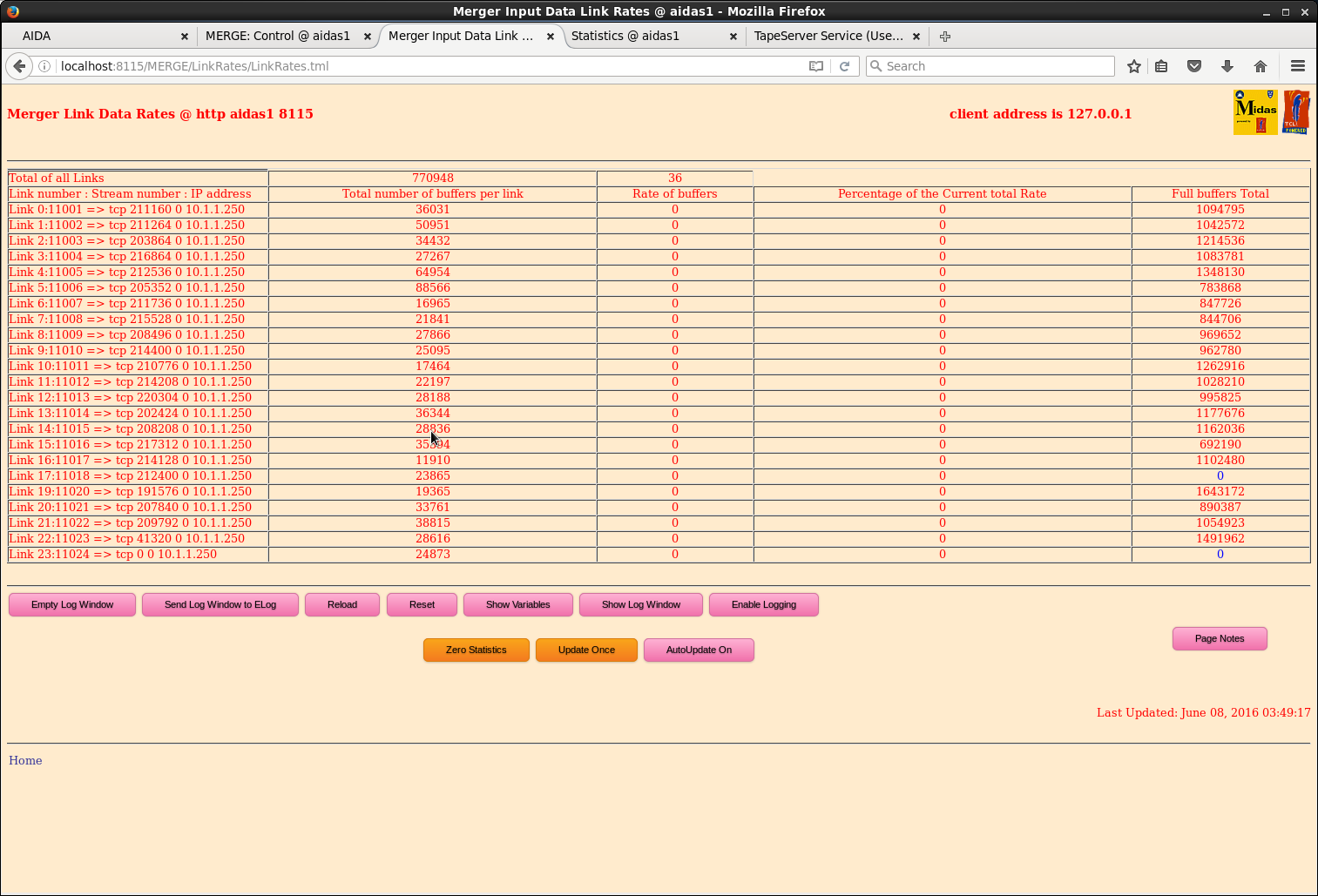
|
| Attachment 17: ADCvT_R1221_0806_04.02.png
|
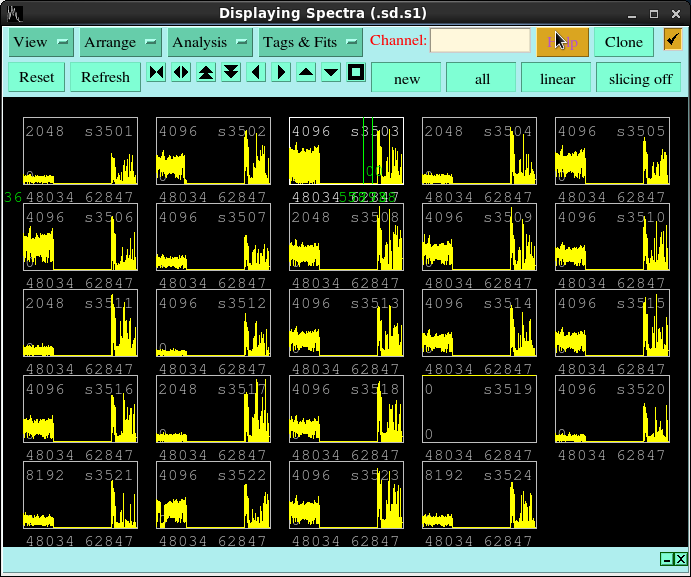
|
| Attachment 18: CPULoad_R1221_0806_04.06.png
|
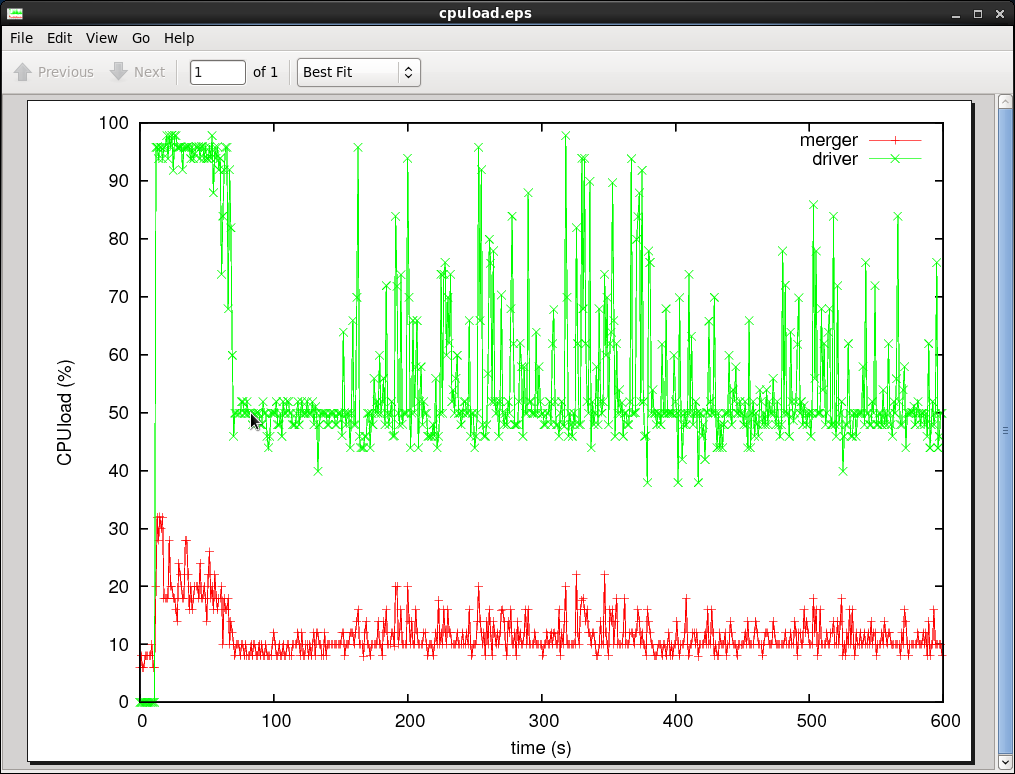
|
| Attachment 19: TOP_R1221_0806_04.16.png
|
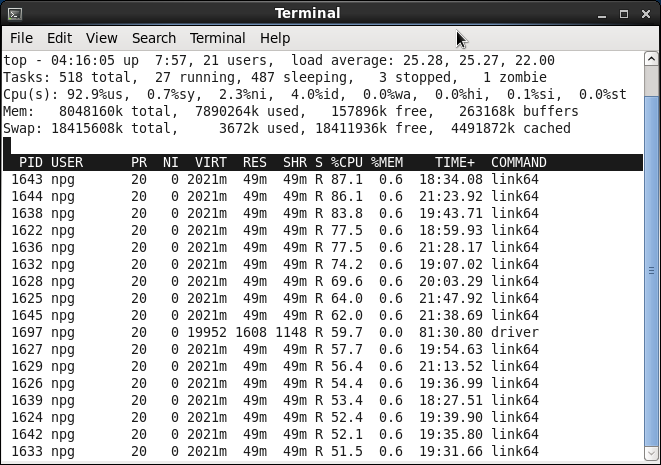
|
| Attachment 20: Merger_R1222_0807-04.59.png
|
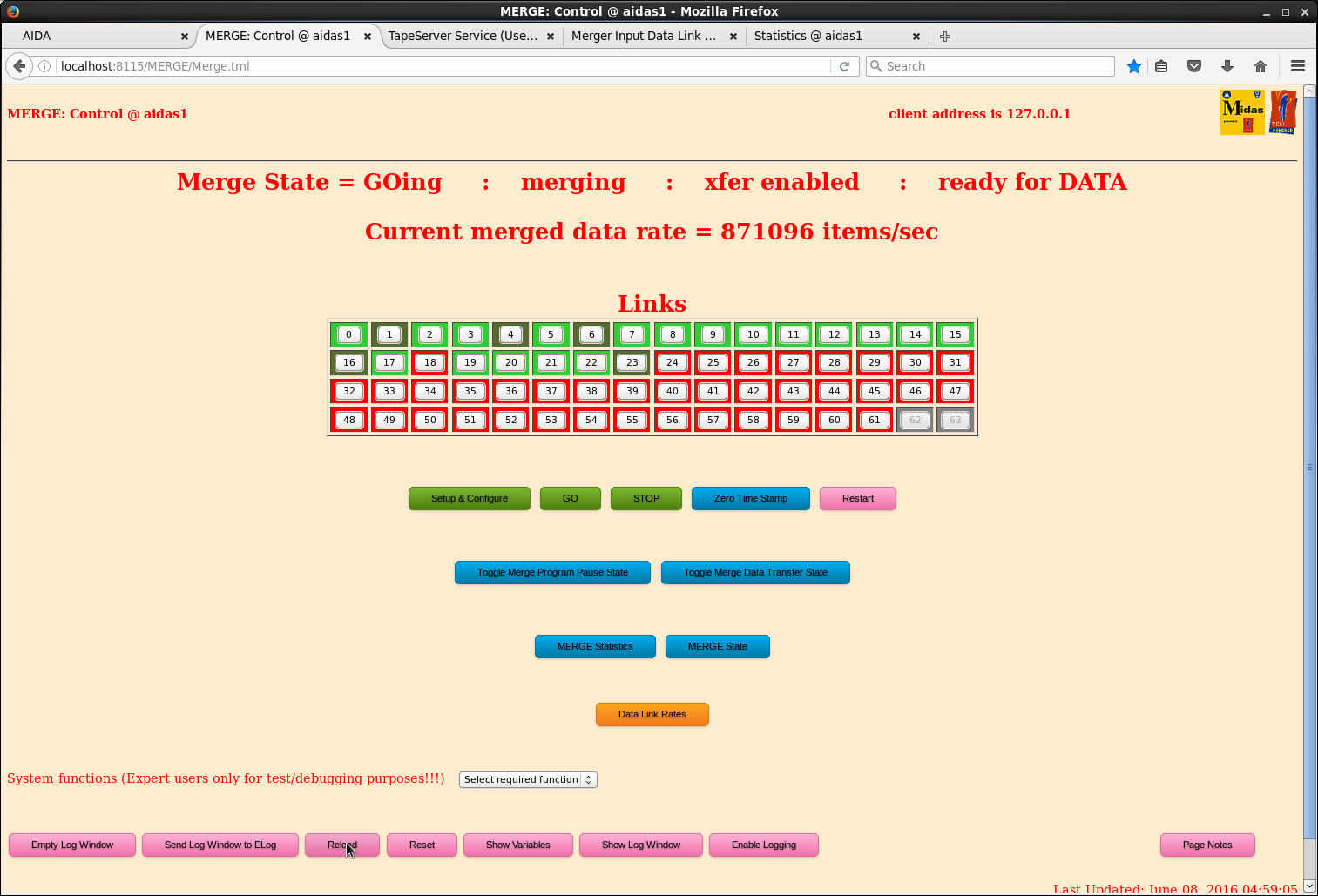
|
| Attachment 21: MergerStats_R1222_0806-05.00.png
|
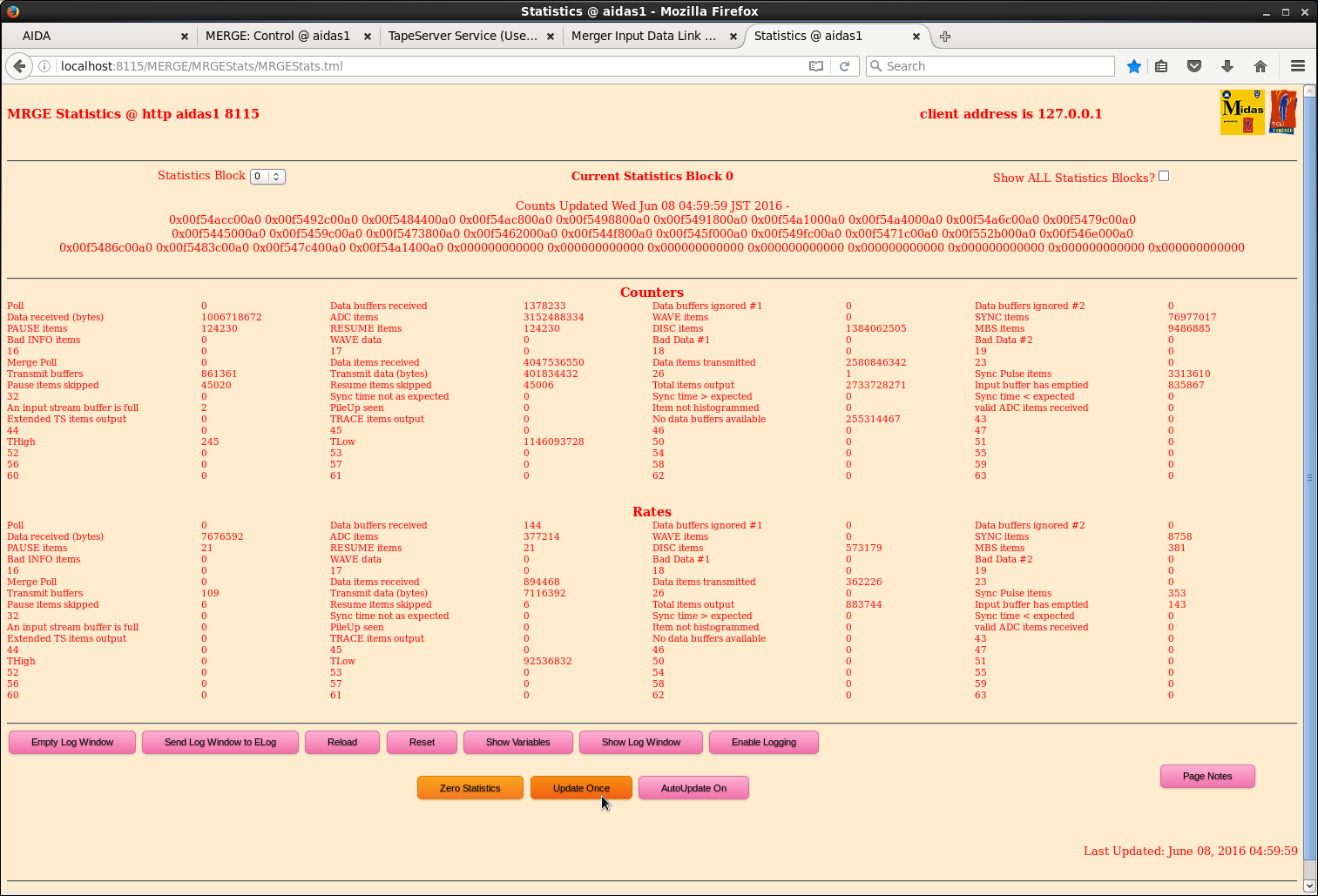
|
| Attachment 22: MergerLink_R1222_0806-04.59.png
|
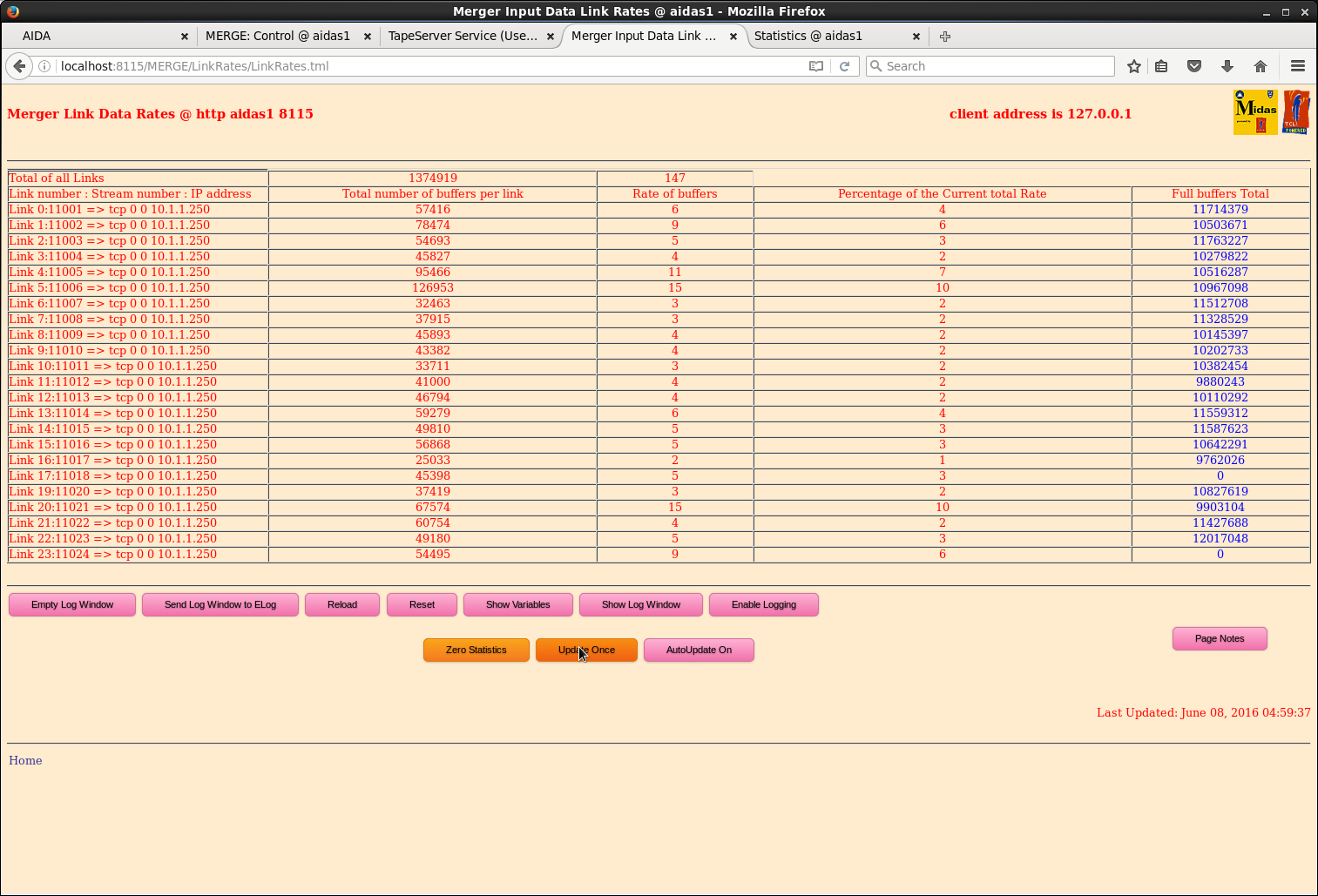
|
| Attachment 23: CPUStat_R1223_0806-05.58.png
|
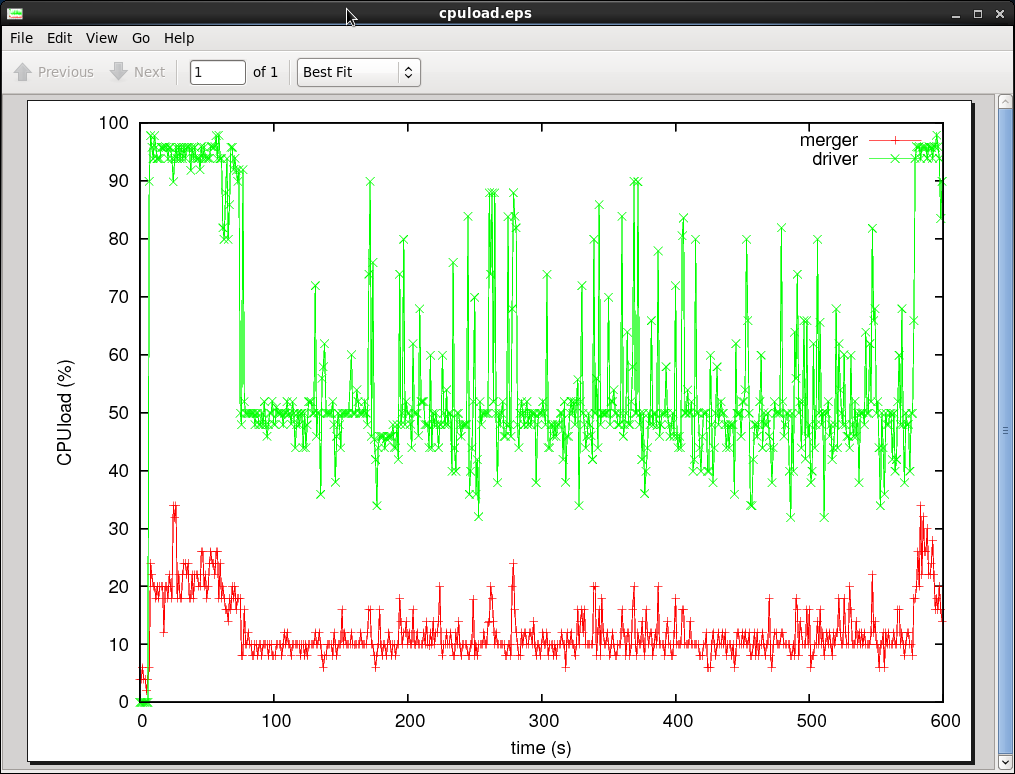
|
| Attachment 24: ADC_v_T_R1223_0806-06.03.png
|
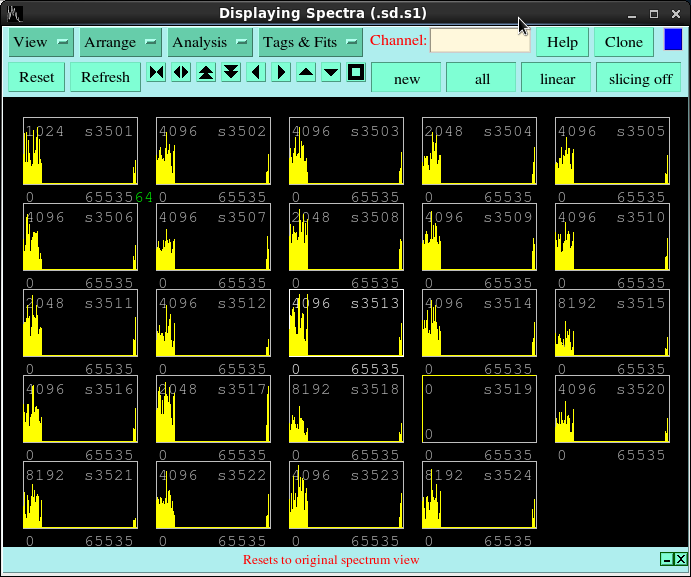
|
| Attachment 25: Pause_v_T_R1223_0806-06.04.png
|
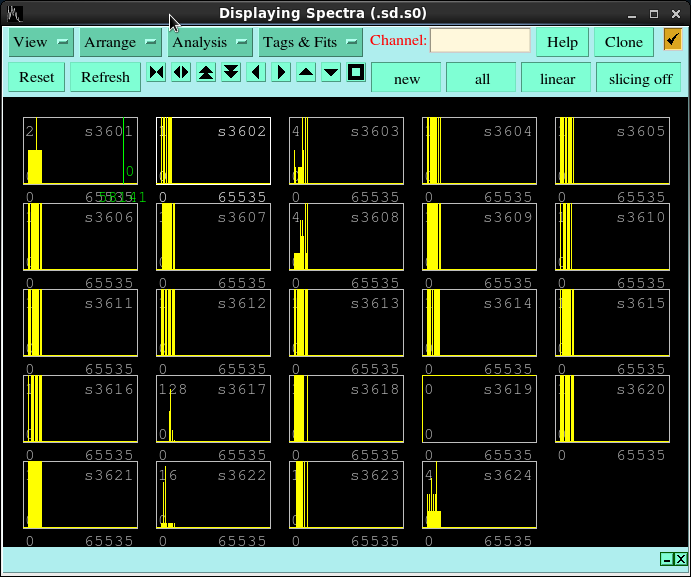
|
| Attachment 26: ADCvTS_R1224_0639.png
|
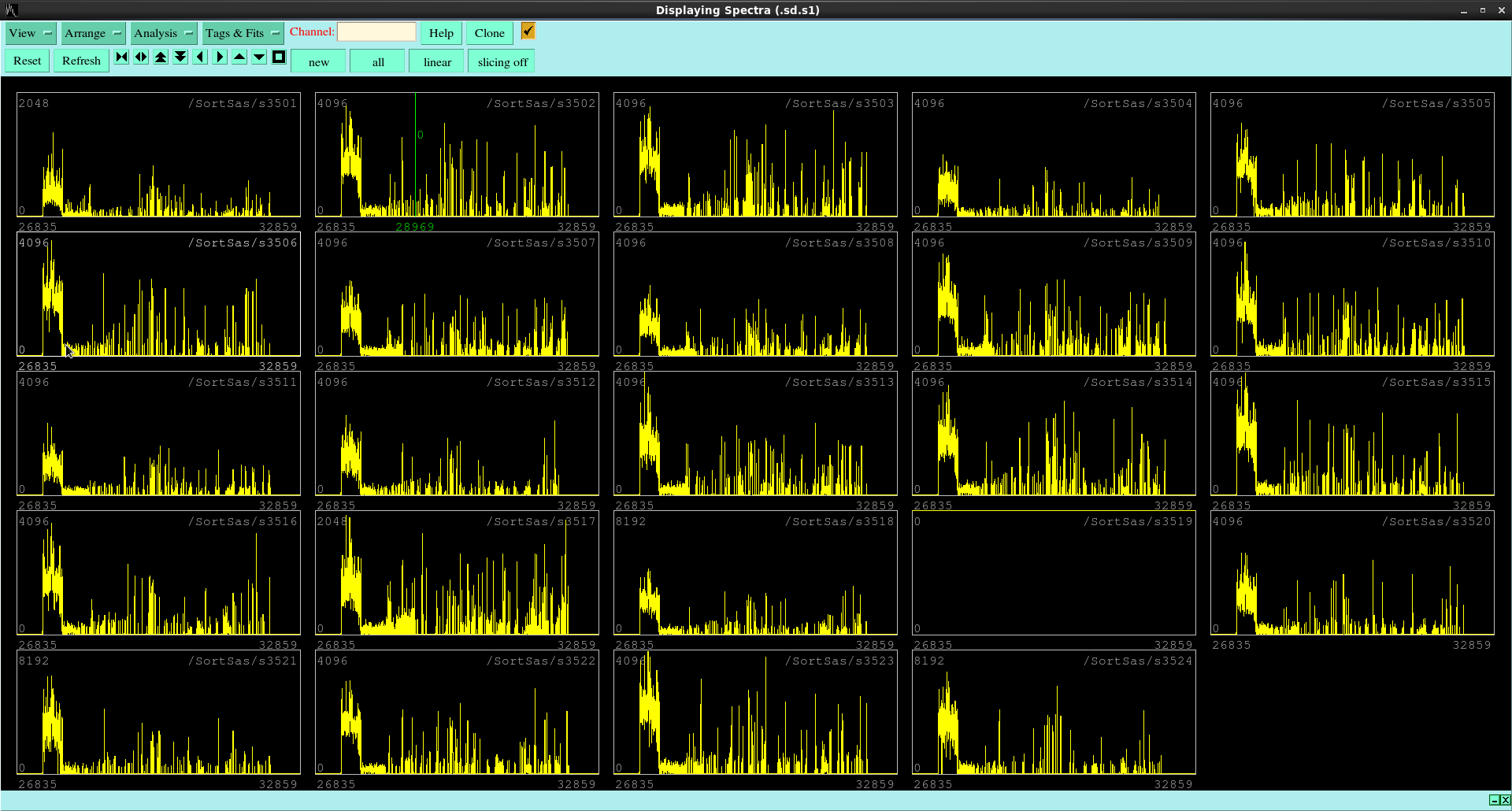
|
| Attachment 27: nnaida21_noDataXfer.png
|
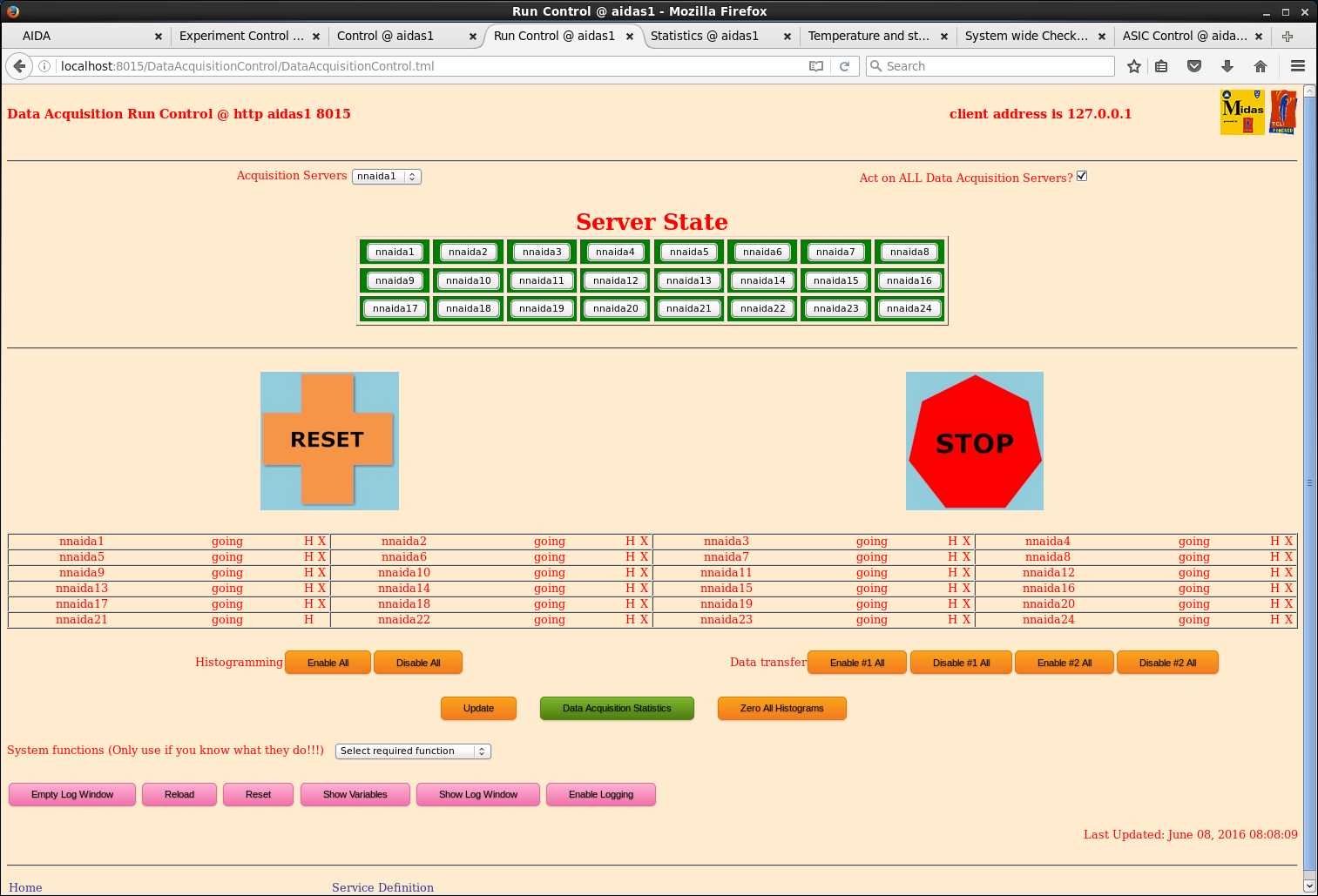
|
|
173
|
Wed Mar 9 12:16:01 2016 |
TD | Wednesday 9 March | MSL type BB18(DS)-1000 serial 2998-22
Bias +200V, I_L +=6.505uA, ambient temperature +19.8 deg C
DSSSD - AIDA adaptor PCB cabling
4 off LH Coupler (Kapton PCB, 5cm), 2x 34-way Samtec ribbon cable (45cm), RH coupler(Kapton PCB, 10cm)
+ 3M 1245 1.4mil copper foil screen ribbon cables + RH coupler only (i.e. not LH coupler)
+ drain wires -> gold-plated Lemo-00 test input connectors
nnaida 11 & 12 AIDA adaptor PCB rev B
nnaida 13 & 14 AIDA adaptor PCB rev C (LK1 fitted)
ground links LK3 & LK7 fitted to nnaida11-14 AIDA adaptor PCBs
Heavy duty copper cable connects copper front end frames of FEE modules
Nitto 5011N conductive gasket between FEE module and front end frames
Standard ASIC settings
nnaida 11 & 12 - negative input
nnaida 13 & 14 - positive input
Pulser BNC PB-5
Fall time 1.0ms
Rate 100Hz
Delay 250ns
Ampl 5.00000V
Polarity +
Pulse top Tail
Atten 10x
Clamp ON
- polarity via Cooknell SA1 Summing Amplifier
207Bi source, approx centred on DSSSD, approx 3cm from DSSSD
AIDA FEE firmware version 8
File R43
shaping time 8uS
slow comparator 10 (dec)
LEC/MEC fast comparator 24 (dec)
start: 12.05 stop: 15.59
spectra saved to disk 16.59 BST (sic)
Pulser OFF |
|
49
|
Wed Feb 25 09:59:28 2015 |
CG, AE | Weds 25th Feb progress | 25/02/15
1200: Swapped out old green power switch for new one from UoE (having previously tested them both yesterday and found them to work fine).
With first switch connected and PuTTY session opened cannot get RPi to connect to it. See (bodged) screen shots below.
Tried many permutations of trying to connect using ttyUSB0/1/2 with various permissions set, none yielded any results other than the error messages below.
1500: Swapped 1st UoE power switch out for the second. Plugged it straight in and it works... ???
Later unplugged it and when reconnected saw the same errors as before. We got rid of these by plugging in the USB cable once the unit was powered on. Does this make any sense, or was it just luck?
Carried out pulser walkthrough to file R22_0. Use same "best" settings as yesterday.
Changed polarity of detector bias (from -100V to +100) and observed a similar leakage current as previously (11.5uA) and normal rates/spectra for each detector. No obvious changes from -ve bias polarity. GOOD.
1830: Looked at effect of supplying each FEE64 from various power supplies (as per request PC-S email on Sun 22nd Feb).
Original configuration : | 1 2 | 4 3 | 5 7 | 8 6 | (all in one PSU)
Changed to: | 1 - | - - | - - | - - | PSU#1
| 3 - | - - | - - | - - | PSU#2
| 6 - | - - | - - | - - | PSU#3
| 8 - | - - | - - | - - | PSU#4
with PSUs #3+4 completely unplugged apart from nnaida6+8. In PSUs #1+2, the remainder of the slots were connected as previously (apart from for nnaida3,6,8, in which case they were swapped for another FEE64 at random).
Initially all PSUs were plugged into one half of the power switch, but the fuse blew. We replaced it with a spare fuse from the unused supply and distributed the PSUs 2 to each half of the switch.
This configuration yielded larger FWHM than original set up ---> worsened performance.
|
| Attachment 1: 2015-02-25_14.25.40.jpg
|
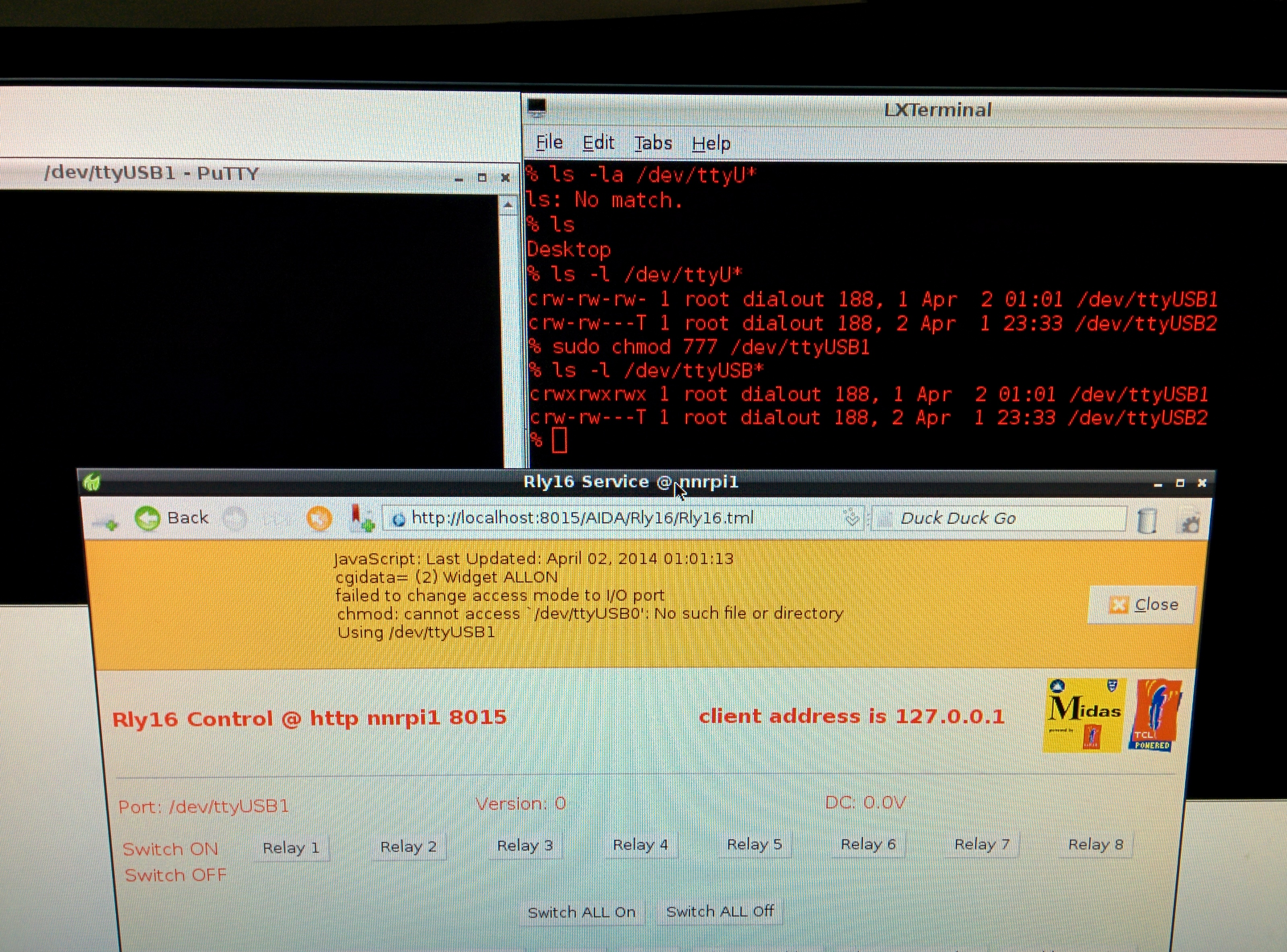
|
| Attachment 2: 2015-02-25_14.38.43.jpg
|
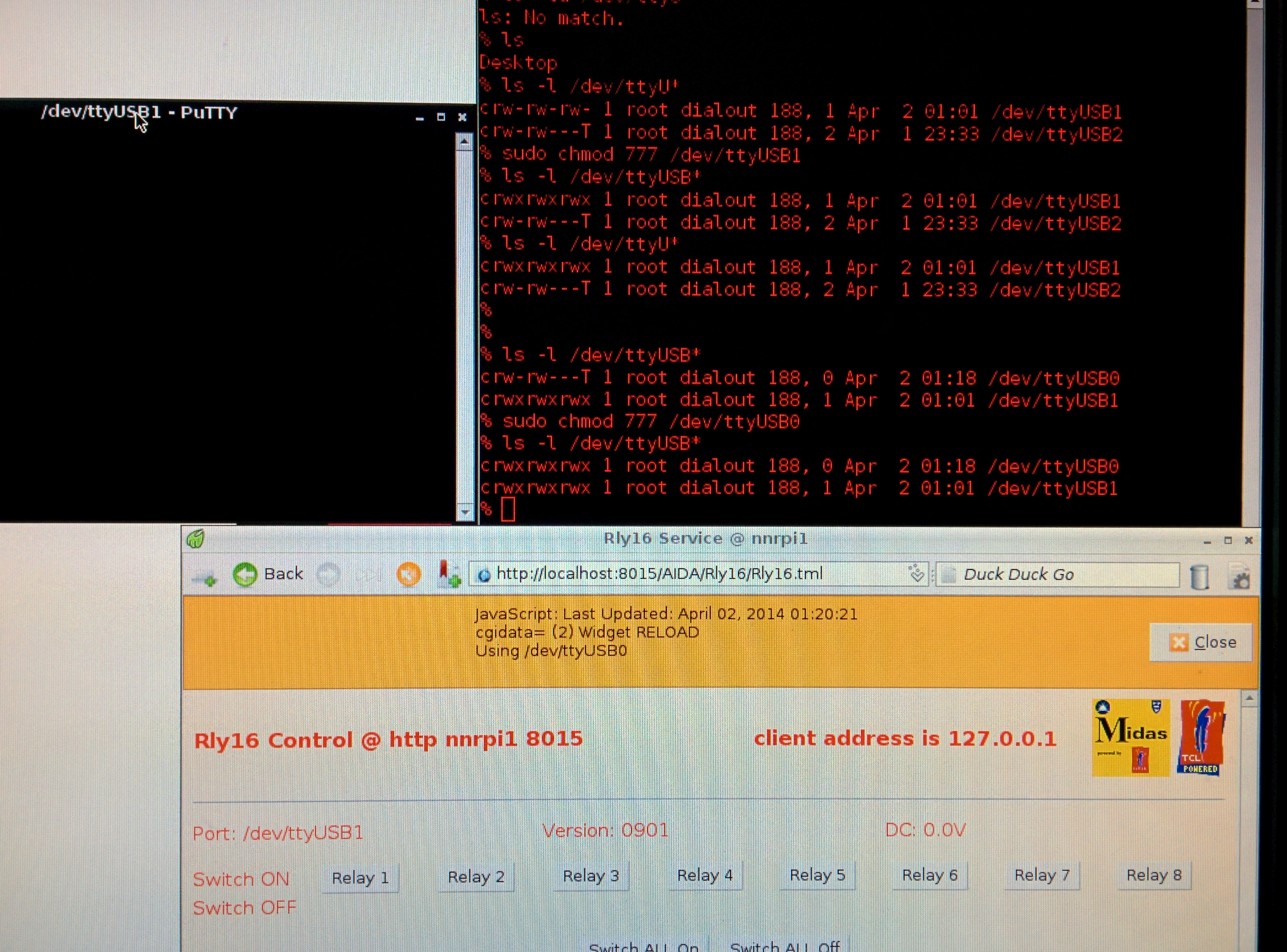
|
| Attachment 3: 25Feb_Rly16error.png
|
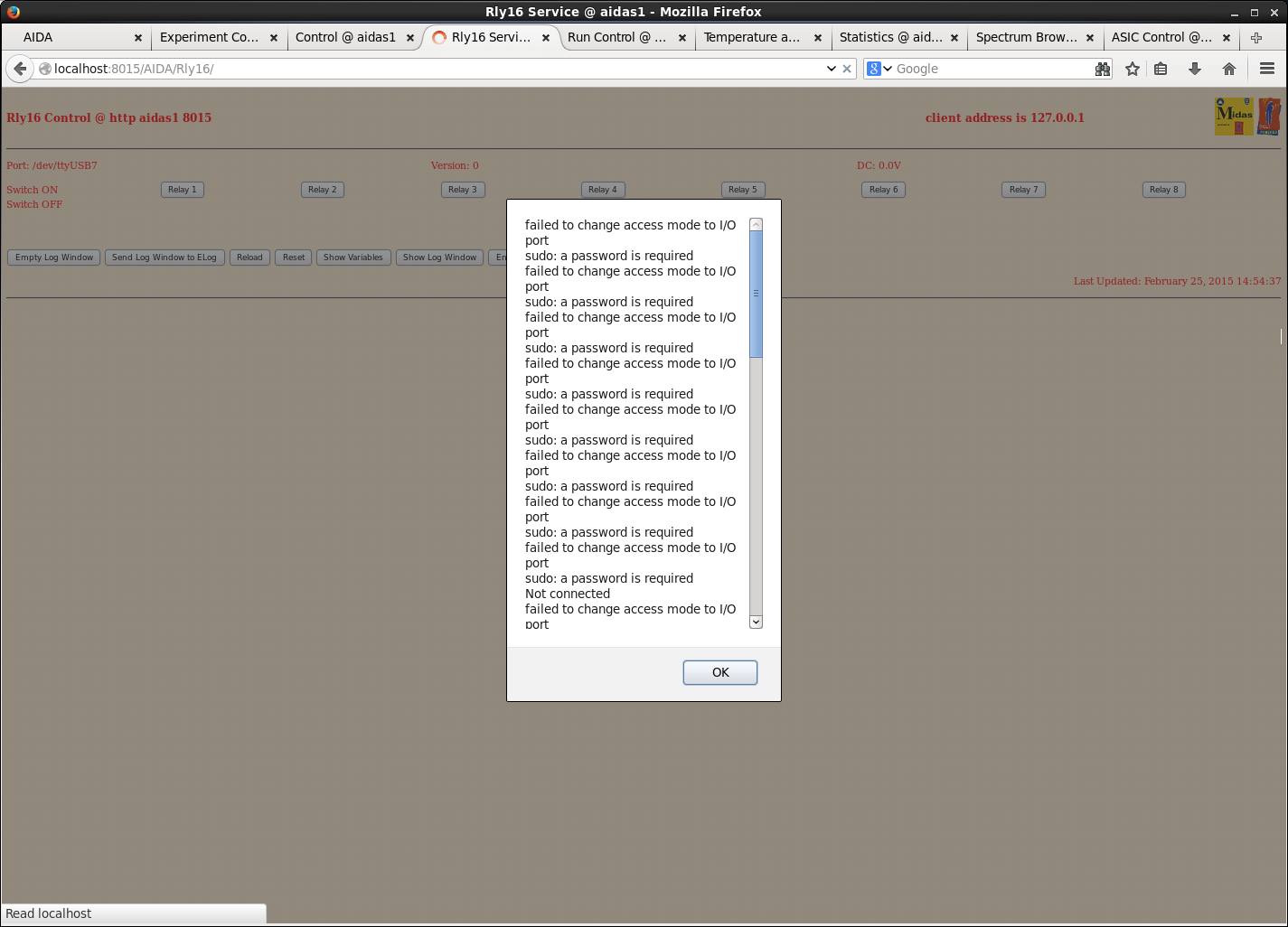
|
|
1
|
Wed Sep 10 08:42:03 2014 |
Tom Davinson | Welcome to the AIDA Elog | The AIDA Elog is now operational and can be found at
https://elog.ph.ed.ac.uk/AIDA/ |
|
29
|
Mon Feb 9 11:52:52 2015 |
Patrick Coleman-Smith | [ How To ] Integrating AIDA with other systems | This document details how to integrate AIDA with other systems. |
| Attachment 1: Integrating_AIDA_with_other_Acquisition_Systems.pdf
|
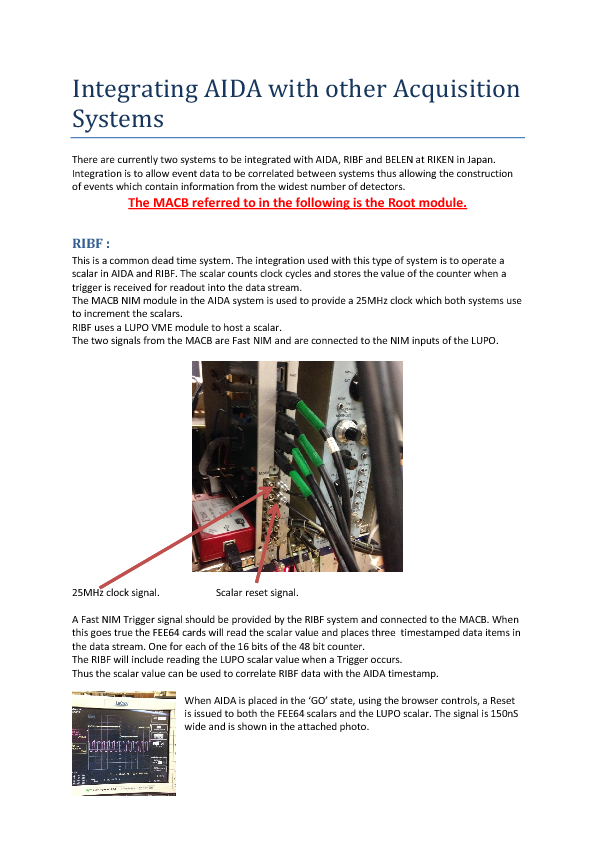
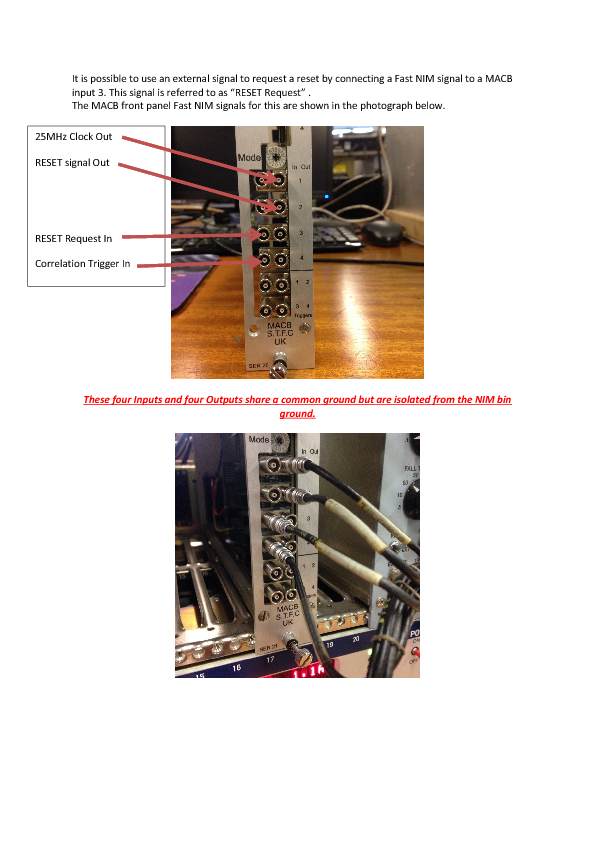
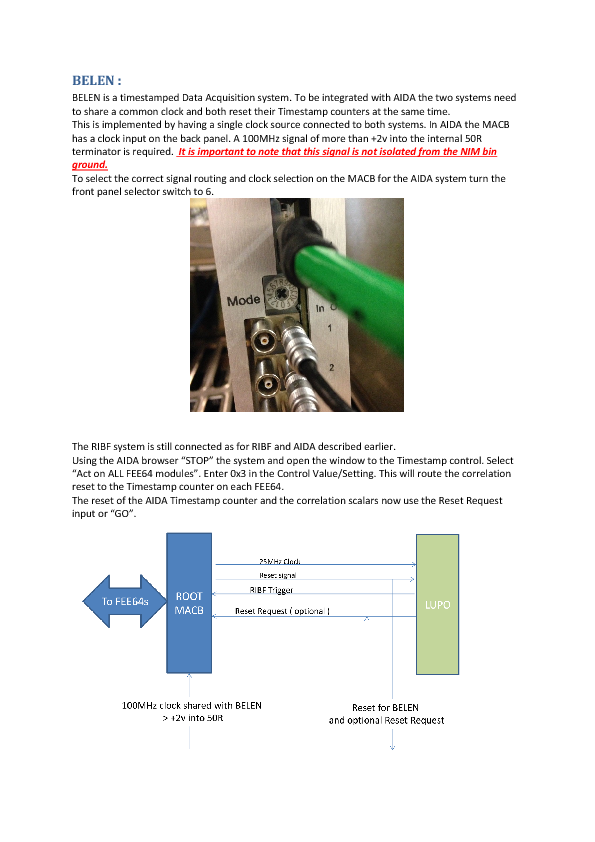
|
|
465
|
Wed Nov 23 14:50:59 2016 |
Patrick Coleman-Smith | [ Info ] What does the System Wide Clock check mean when it fails. | The System Wide check called "Check Clock Status" reads the status register from the FEE64 units in the system and compares the value of each bit against a template depending if the FEE64 is Master or not.
The bit fields have the following meaning :-
- clkd_ld1_pin. This is the "locked" status of the PLL in clock distribution chip LMK03200 #1. The clocks are used for the Waveform ADCs. ADCs 1 to 4 and FPGA Waveform decode logic.
- clkd_ld2_pin. This is the "locked" status of the PLL in clock distribution chip LMK03200 #2. The clocks are used for the Waveform ADCs. ADCs 5 to 8 and the Master SYNC PLL in the FPGA.
- aq_clock_locked. This is the "locked" status of the PLL in the FPGA. The clock is used for all data aquisition functions. If this isn't true ('1') then the module is not going to work as part of the system.
- sync_locked. This is the "locked" status of the PLL in the FPGA which provides a 200MHz clock to the SYNC pulse alignement logic. This is only used in the Master.
- to 31 read as '0'
The System Wide Check will only report the state of bits 0 to 2 but by opening the "Local Controls" browser window the status value can be seen ( after a reload ) at offset 1.
|
|
28
|
Fri Jan 30 15:27:35 2015 |
Alfredo Estrade | [Analysis] 207Bi source (R61): check of monitor spectra |
A first look at the data from the 207Bi source (run described in previous elog entry, ID 27)
The main conclusions are (see description of spectra further bellow):
- NNAIDA11 and NNAIDA13 were running stable, even though NNAIDA11 had one channel with very high rate.
NNAIDA12 and 14 were running unstably with frequent instances of Pause/Resume. A possible explanation is
their higher data rates (due to a bad channel and noise, respectively).
- I think using only a window in time will not be sufficient to identify electron signals in the data.
This is a particular issue for the data of NNAIDA14, where there is a high noise and a energy threshold,
or some more ingenious condition, is likely required.
Plots were generated with the script in /Home/aestrade/AIDA/analysis/loopAIDAsort.cpp
Only a fraction of the 207Bi data was processed (corresponding to file R62_2).
+ Distribution of time-stamps
R61part_ts_dist_adc_hit.png: The spectra show the difference between the
time-stamp of a given ADC hit (ts_i) and the time-stamp of subsequent ADC
hits (ts_i+n):
Delta ts(i+n,i) = ts_(i+n) - ts(i)
So the first plot, for Delta ts(i+1,i), is the difference between each ADC
hit and the next ADC hit. The second plot is the ts difference between each
ADC hit and the second to next ADC hit, and so on...
The data mixes the spectra for all FEE cards and all ADC channels. One can
still see a clear structure with a peak at low values of Delta ts, and then
a second distribution up to Delta ts= 30*n usec. These is the time it takes
to loop through all 16 channels of the ADC (2 usec/channel), so is likely
the distribution generated by one channel is firing at a very high rate.
I'll make similar plots with conditions to mask out noisy channels and/or
pulser events to look for a value of the coincidence time-window to use to
reconstruct events.
+ Rates
R61part_rates.png: the spectra shows various rates (in Hz) as a function of
run time and of channel. The plots on the top are the rate of ADC hits (for
low energy range) of each FEE module, and one showing the rate of ADC hits
for the high energy range in all modules combined. The bottom row shows rate
per channel, and the rate of Information type hits.
some conclusions: NNAIDA11 and 13 show a flat rate, and as will be seen from other plots are very stable
during the run. NNAIDA11 has a larger rate than 13, but the difference is mostly due to a very high-rate
channel; the rate in most channels is consistent with a 100 Hz pulser for both.
NNAIDA12 and 14 show the largest rate that can peak at 35kHz, and looks quite unstable. These modules also
have a choppy run of the DAQ (many Pause/Resume). NNAIDA11 actually has similar rate to NNAIDA12 and 14,
but is still stable.
Both NNAIDA11 and 12 have one channel wiht very high rate compared to the
rest (rather than unusually noisy channel, could it be one that is always
above the threshold of the slow discriminator?).
+ ADC Rate with fine granularity
R61part_t1_hits_ts_adc.png: These spectra show the ADC hits (low range) vs time but with a higher binning
of the data (1 ms/bin). The one channel with a very high rate in NNAIDA11 and 12 is seen in red. Also that
the data readout from NNAIDA12 and 14 is frequently halted by Pause/Resume signals.
R61part_t1_hits_ts_adc_zoom.png: The second file hast the same spectra but zoomed in a narrow time window,
and one can see the hits from the pulser 10 ms appart (as vertial lines with hits in all channels for 2D
spectra). In between the pulser signals, as hits in individual channels, are hits from the source or from
noise. For NNAIDA14 this white noise was very high, so at the binning of 1ms/bin this spectra there are
many channels with hits in each time bin. I think it will be difficult to identify electron events from
such spectra using only a time window as requirement for coincidence.
+ Info Codes Rates
R61part_t1_hits_ts_info.png : The spectra show the rates of information words. The first plots are again
for a narrow section of the run (same as previous spectra). One can see the frequent sequence of
Pause/Resume for NNAIDA12 and 14. Also note discriminator data and ADC(high range) hits only come for
NNAIDA12 (we used very high value for discriminator threshold).
R61part_ts_info_fee.png: The figure shows the distribution of the different information codes for each FEE
module, but now for the full lenght of the run.
++ Sorted Root TTree fiels ++
All raw files of run R61 were processed with the 'beta' version of the Root
sort code for event reconstruction (/homes/npg/AIDAsort/ in DL PC), but only
up to the 'Calibration' step (no event reconstructino).
R61_207Bi_2_sort.root used for above plots.
Root tree saved here:
/Disk/ds-sopa-personal/aestrade/rootfiles/AIDA/R61_207Bi_0_calib.root
/Disk/ds-sopa-personal/aestrade/rootfiles/AIDA/R61_207Bi_0_sort.root
/Disk/ds-sopa-personal/aestrade/rootfiles/AIDA/R61_207Bi_1_calib.root
/Disk/ds-sopa-personal/aestrade/rootfiles/AIDA/R61_207Bi_1_sort.root
/Disk/ds-sopa-personal/aestrade/rootfiles/AIDA/R61_207Bi_2_calib.root
/Disk/ds-sopa-personal/aestrade/rootfiles/AIDA/R61_207Bi_2_sort.root
/Disk/ds-sopa-personal/aestrade/rootfiles/AIDA/R61_207Bi_3_calib.root
/Disk/ds-sopa-personal/aestrade/rootfiles/AIDA/R61_207Bi_3_sort.root
/Disk/ds-sopa-personal/aestrade/rootfiles/AIDA/R61_207Bi_4_calib.root
/Disk/ds-sopa-personal/aestrade/rootfiles/AIDA/R61_207Bi_4_sort.root
/Disk/ds-sopa-personal/aestrade/rootfiles/AIDA/R61_207Bi_5_calib.root
/Disk/ds-sopa-personal/aestrade/rootfiles/AIDA/R61_207Bi_5_sort.root
A bug on the Root sort code was identified from this output: the code waits
for a SYNC100 pulse from *each* FEE card to update their corresponding
most-significant bits (MSB) for the timestamp, while one has to use *any*
SYNC100 pulse to update the MSB of all FEE modules. As a consecuence, a
(very small) fraction of the processed hits have the wrong time-stamp (off
by bit 28). |
| Attachment 1: R61part_ts_dist_adc_hit.png
|
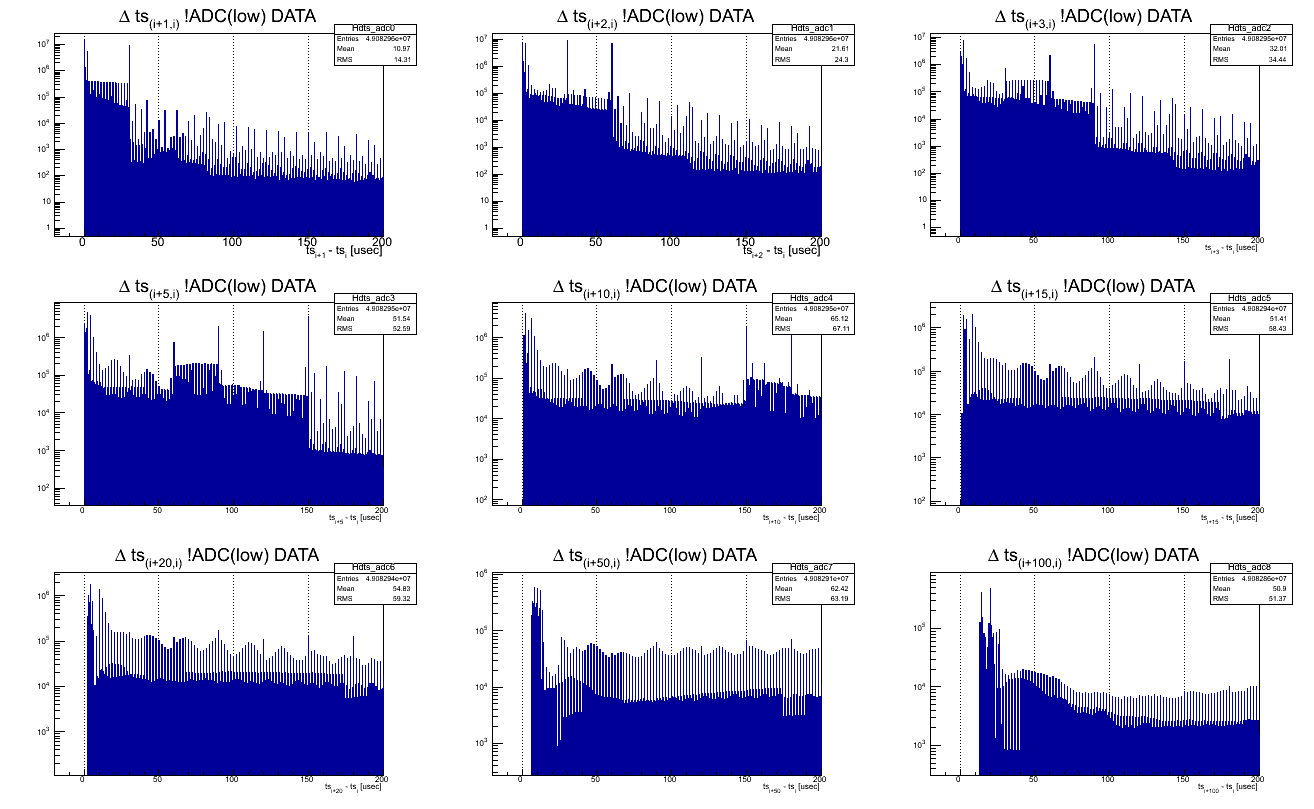
|
| Attachment 2: R61part_rates.png
|
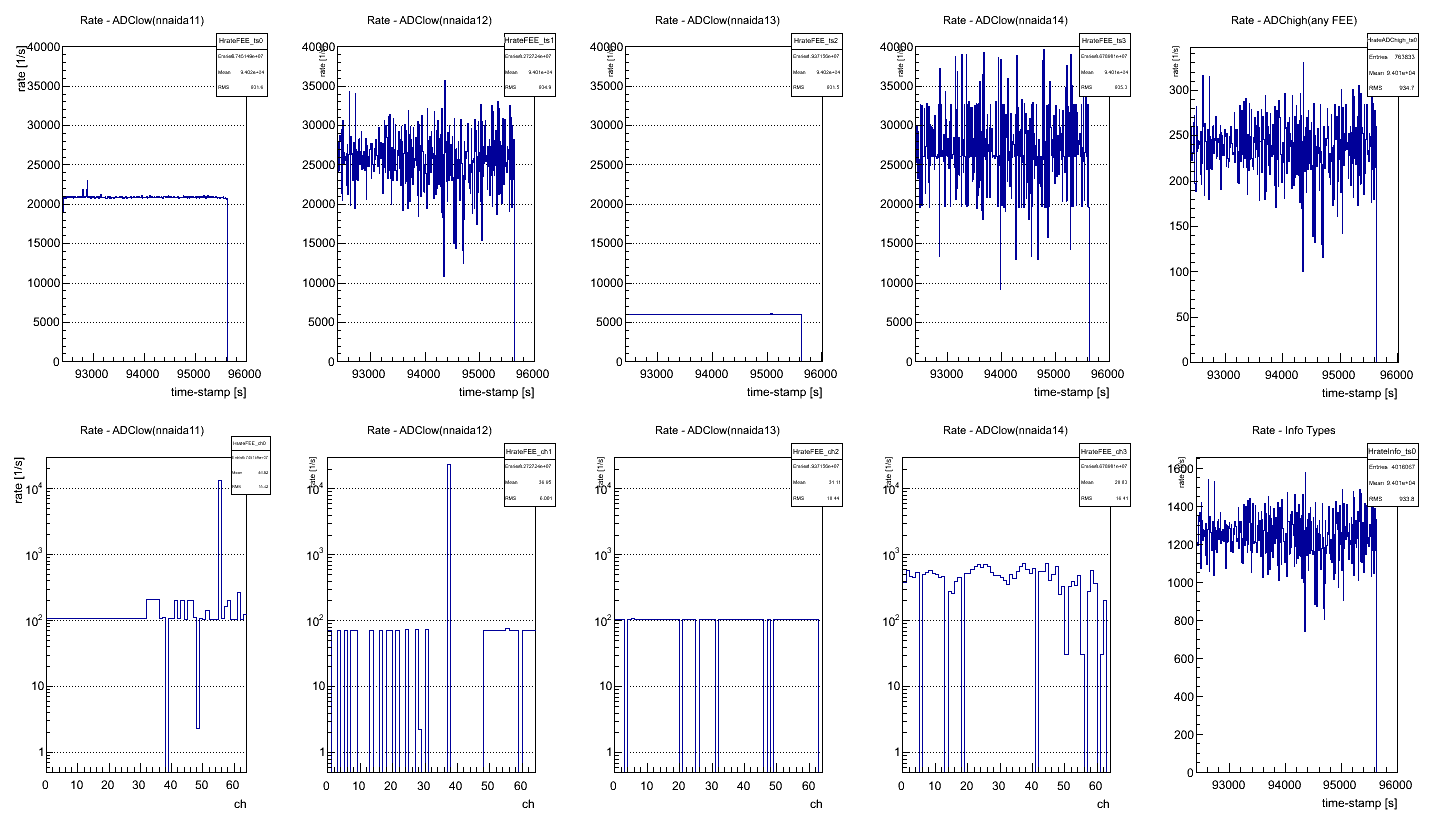
|
| Attachment 3: R61part_t1_hits_ts_adc.png
|
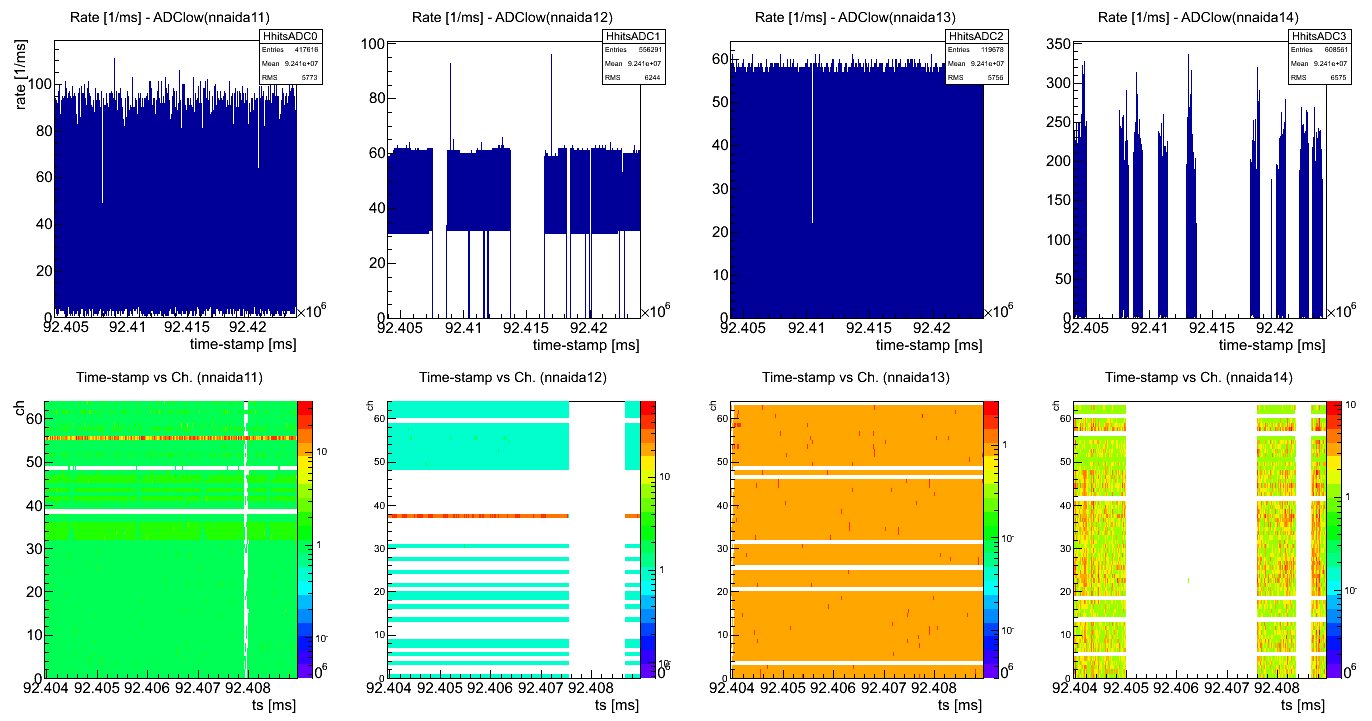
|
| Attachment 4: R61part_t1_hits_ts_adc_zoom.png
|
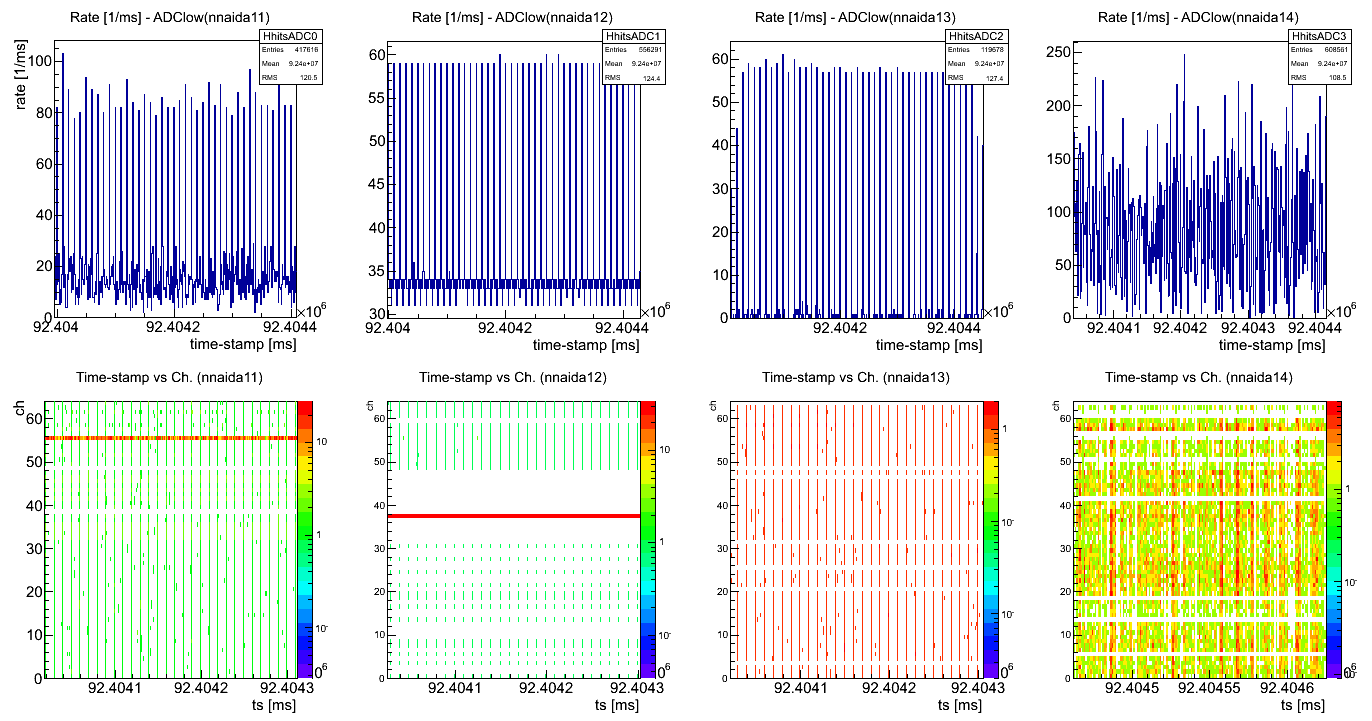
|
| Attachment 5: R61part_t1_hits_ts_info.png
|
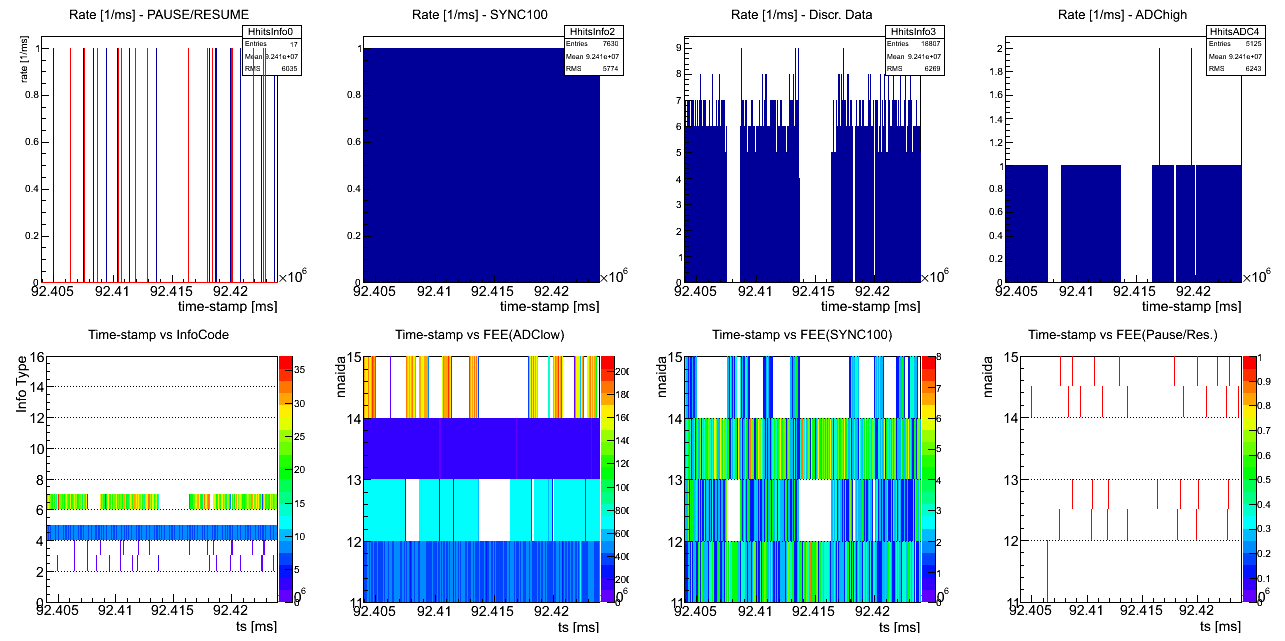
|
| Attachment 6: R61part_ts_info_fee.png
|
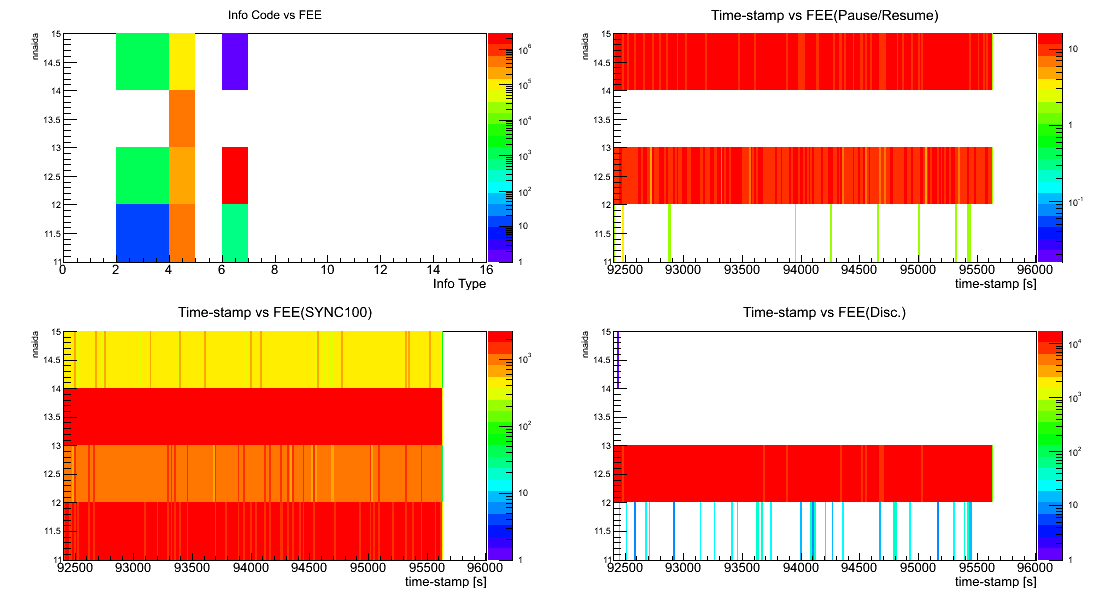
|
| Attachment 7: loopAIDAsort.cpp
|
/*********/
//#include <bitset>
#include <fstream>
#include <iostream>
#include <stdio.h>
#include <sstream>
#include <string>
#include <ctime>
#include <TFile.h>
#include <TTree.h>
#include <TH1I.h>
#include <TH2I.h>
#include <TGraph.h>
#include <TCanvas.h>
//#include "Common.h"
//using namespace std;
/*********/
//ts_0 in usec
void LoopTree(string inFile, int downscale=1, long long n_last= -1, int ts_0=-1, bool b_print=false, bool b_quit_ts=false){
struct struct_entry_sort{
long long tm_stp; //reconstructed timestamp (MSB+LSB)
long long info; //MBS info data (external timestamp), anything else(?)
int mod_id;
int ch_id;
int type; // QQQ: 0= 20 MeV or 1 GeV (decays), 1= 20 GeV (checked pulser data only in type 0)
// type>=10: type = info_code+10 (i.e., PAUSE, RESUME, SYNC100, etc...)
int adc_data;
bool sync_flag; // check SYNC100 pulses received for this module
bool pause_flag; // check Pause signals followed by proper Resume signal: true= SYNC100 paused...
};
//***** histograms! many...
//
//delta ts: any->any [100]
// adc->adc [100]
// adc(feei)->adc(feej) [1]
// adc(sidei)->adc(sidej) [1]
// !adc->!adc [1]
//1,2,3,5,10,15,20,50,100
TH1D *Hdts_any[10];
Hdts_any[0]= new TH1D("Hdts_any0","#Delta ts_{(i+1,i)} !ANY DATA;ts_{i+1} - ts_{i} [usec]",4400,-20,200); //200 us full scale
Hdts_any[1]= new TH1D("Hdts_any1","#Delta ts_{(i+2,i)} !ANY DATA;ts_{i+2} - ts_{i} [usec]",4400,-20,200); //200 us full scale
Hdts_any[2]= new TH1D("Hdts_any2","#Delta ts_{(i+3,i)} !ANY DATA;ts_{i+3} - ts_{i} [usec]",4400,-20,200); //200 us full scale
Hdts_any[3]= new TH1D("Hdts_any3","#Delta ts_{(i+5,i)} !ANY DATA;ts_{i+5} - ts_{i} [usec]",4400,-20,200); //200 us full scale
Hdts_any[4]= new TH1D("Hdts_any4","#Delta ts_{(i+10,i)} !ANY DATA;ts_{i+10} - ts_{i} [usec]",4400,-20,200); //200 us full scale
Hdts_any[5]= new TH1D("Hdts_any5","#Delta ts_{(i+15,i)} !ANY DATA;ts_{i+15} - ts_{i} [usec]",4400,-20,200); //200 us full scale
Hdts_any[6]= new TH1D("Hdts_any6","#Delta ts_{(i+20,i)} !ANY DATA;ts_{i+20} - ts_{i} [usec]",4400,-20,200); //200 us full scale
Hdts_any[7]= new TH1D("Hdts_any7","#Delta ts_{(i+50,i)} !ANY DATA;ts_{i+50} - ts_{i} [usec]",4400,-20,200); //200 us full scale
Hdts_any[8]= new TH1D("Hdts_any8","#Delta ts_{(i+100,i)} !ANY DATA;ts_{i+100} - ts_{i} [usec]",4400,-20,200); //200 us full scale
TH1D *Hdts_adc[10];
Hdts_adc[0]= new TH1D("Hdts_adc0","#Delta ts_{(i+1,i)} !ADC(low) DATA;ts_{i+1} - ts_{i} [usec]",4400,-20,200); //200 us full scale
Hdts_adc[1]= new TH1D("Hdts_adc1","#Delta ts_{(i+2,i)} !ADC(low) DATA;ts_{i+2} - ts_{i} [usec]",4400,-20,200); //200 us full scale
Hdts_adc[2]= new TH1D("Hdts_adc2","#Delta ts_{(i+3,i)} !ADC(low) DATA;ts_{i+3} - ts_{i} [usec]",4400,-20,200); //200 us full scale
Hdts_adc[3]= new TH1D("Hdts_adc3","#Delta ts_{(i+5,i)} !ADC(low) DATA;ts_{i+5} - ts_{i} [usec]",4400,-20,200); //200 us full scale
Hdts_adc[4]= new TH1D("Hdts_adc4","#Delta ts_{(i+10,i)} !ADC(low) DATA;ts_{i+10} - ts_{i} [usec]",4400,-20,200); //200 us full scale
Hdts_adc[5]= new TH1D("Hdts_adc5","#Delta ts_{(i+15,i)} !ADC(low) DATA;ts_{i+15} - ts_{i} [usec]",4400,-20,200); //200 us full scale
Hdts_adc[6]= new TH1D("Hdts_adc6","#Delta ts_{(i+20,i)} !ADC(low) DATA;ts_{i+20} - ts_{i} [usec]",4400,-20,200); //200 us full scale
Hdts_adc[7]= new TH1D("Hdts_adc7","#Delta ts_{(i+50,i)} !ADC(low) DATA;ts_{i+50} - ts_{i} [usec]",4400,-20,200); //200 us full scale
Hdts_adc[8]= new TH1D("Hdts_adc8","#Delta ts_{(i+100,i)} !ADC(low) DATA;ts_{i+100} - ts_{i} [usec]",4400,-20,200); //200 us full scale
TH1D *Hdts_fee[1];
Hdts_fee[0]= new TH1D("Hdts_fee0","#Delta ts_{(i+1,i)} !ADC(low), diff. FEE;ts_{i+1} - ts_{i} [usec]",4400,-20,200); //200 us full scale
TH1D *Hdts_side[2];
Hdts_side[0]= new TH1D("Hdts_side0","#Delta ts_{(i+1,i)} !ADC(low), side0->1;ts_{i+1} - ts_{i} [usec]",4400,-20,200); //200 us full scale
Hdts_side[1]= new TH1D("Hdts_side1","#Delta ts_{(i+1,i)} !ADC(low), side1->0;ts_{i+1} - ts_{i} [usec]",4400,-20,200); //200 us full scale
TH1D *Hdts_info[1];
Hdts_info[0]= new TH1D("Hdts_info0","#Delta ts_{(i+1,i)} !info DATA;ts_{i+1} - ts_{i} [usec]",4400,-20,200); //200 us full scale
TH1D *Hdts_ooo[1];
Hdts_ooo[0]= new TH1D("Hdts_ooo0","#Delta ts_{(i+1,i)} !out-of-order!;ts_{i+1} - ts_{i} [usec]",15000,-3e6,0); //500 us full scale
TH1D * Hts[2];
Hts[0]= new TH1D("Hts0","Time-stamp;ts [usec]",2000,0,27e5);
Hts[1]= new TH1D("Hts1","Time-stamp;ts [usec]",2000,91e9,97e9);
//Rate hitograms
TH1D * HrateFEE_ts[4];
TH1D * HrateFEE_ch[4];
TH1D * HrateADChigh_ts[1];
TH1D * HrateInfo_ts[1];
TH1I * HhitsADC[5];
TH1I * HhitsInfo[4];
TH2I * HtsFEE[3];
TH2I * HtsInfo[1];
TH2D * HtsCh[4];
TH2I * HInfoFEE[4];
double max_bin;
if(n_last>0) max_bin= n_last;
else max_bin= 1.e7;
TH2I * HtsEvent[2];
//HtsEvent[0]= new TH2I("HtsEvent0","Time-stamp vs entry;entry #;ts [usec]",200,0,max_bin,1000,0,27e5);
HtsEvent[1]= new TH2I("HtsEvent1","Time-stamp vs entry;entry #;ts [usec]",500,0,max_bin,500,92e9,97e9);
//sEvent[1]= new TH2I("HtsEvent1","Time-stamp vs entry;entry #;ts [usec]",500,0,max_bin,500,92.4e9,92.44e9);
// variables for distribution of time-stamp differences
double dts;
double ts100_any[101];
double ts100_adc[101];
// long long tsinide01;
// long long ts_side10;
// long long ts_fee;
double ts_info= -1;
int index_adc=0;
int index_any=0;
int index_prev;
int last_side, this_side;
int last_fee, this_fee;
int step_back[9]={1,2,3,5,10,15,20,50,100};
int steps;
double ts;
for(int i=0;i<101;i++){
ts100_any[i]= -1;
ts100_adc[i]= -1;
}
int Nooo=0;
int info_code_prev, mod_id_prev, type_prev;
//logfile
ofstream logfile("outputLoop_R61_5.txt");
time_t t_start; //, t_stop;
TFile* input_file;
input_file = new TFile(inFile.data(),"read");
if (input_file != 0){
input_file->ls();
TTree * input_tree;
input_tree= (TTree*) input_file->Get("AIDA_sort");
if(input_tree !=0) input_tree->Print();
else {
cout << "\n WARNING@ could not assign AIDA_sort Tree...." << endl;
exit(0);
}
//tree from Converter step will data in a struct_entry_midas structure
struct_entry_sort entry_1;
input_tree->SetMakeClass(1);
input_tree->SetBranchAddress("entry_sort",&entry_1,0);
input_tree->SetBranchStatus("entry_sort",1);
//number of data points in TTree
long long n_entries;
n_entries = input_tree->GetEntries();
cout << "\nNumber of entries in input tree= " << n_entries << ", in file " << inFile << endl;
logfile << "\nNumber of entries in input tree= " << n_entries << ", in file " << inFile << endl;
//get run time... properly...
long long time_first, time_last;
time_first= 0;
for(long long i=0; i<=100000; i++){
input_tree->GetEntry(i);
if(entry_1.sync_flag){
time_first= entry_1.tm_stp;
i=100000+1;
}
}
if(time_first<=0){
cout << "\n\n**** WARNING: Couldn't find Synchronized data in first 100K entries of file! ****\n" << endl;
time_first=0;
}
input_tree->GetEntry(n_entries-1);
time_last= entry_1.tm_stp;
cout << "\n----------------------------------------------------------------------------"
<< "\n Inititial time stamp= " <<time_first;
cout << "\n Lenght of run= "<<time_last-time_first <<" tm-stp= "<<(time_last-time_first)/1.e8 <<" sec"<<endl;
//Define histograms that need to know run lenght....
double ts_low, ts_up; //in usc
double ts_sec;
// int ts_0;
//in msec units!
if(ts_0<0) ts_0 = time_first/100000; // 10x ns -> ms
cout << " .... using ts_0= " << ts_0;
//and this in usec units!
ts_low= ts_0*1000.;
ts_up= ts_low+20.e6;
cout << "msec, ts_low= " << ts_low << " usec, ts_up= " << ts_up << " usec" << endl<<endl;
int fee_index;
bool b_ts_window;
//Rate histograms
int ts_0_sec= int(1.*time_first/1e8);
//2 hrs, 10sec/bin
HrateFEE_ts[0]= new TH1D("HrateFEE_ts0","Rate - ADClow(nnaida11);time-stamp [s];rate [1/s]",360,ts_0_sec,ts_0_sec+3600);
HrateFEE_ts[1]= new TH1D("HrateFEE_ts1","Rate - ADClow(nnaida12);time-stamp [s];rate [1/s]",360,ts_0_sec,ts_0_sec+3600);
HrateFEE_ts[2]= new TH1D("HrateFEE_ts2","Rate - ADClow(nnaida13);time-stamp [s];rate [1/s]",360,ts_0_sec,ts_0_sec+3600);
HrateFEE_ts[3]= new TH1D("HrateFEE_ts3","Rate - ADClow(nnaida14);time-stamp [s];rate [1/s]",360,ts_0_sec,ts_0_sec+3600);
HrateFEE_ch[0]= new TH1D("HrateFEE_ch0","Rate - ADClow(nnaida11);ch; rate [1/s];time-stamp [s]",64,0,64);
HrateFEE_ch[1]= new TH1D("HrateFEE_ch1","Rate - ADClow(nnaida12);ch; rate [1/s];time-stamp [s]",64,0,64);
HrateFEE_ch[2]= new TH1D("HrateFEE_ch2","Rate - ADClow(nnaida13);ch; rate [1/s];time-stamp [s]",64,0,64);
HrateFEE_ch[3]= new TH1D("HrateFEE_ch3","Rate - ADClow(nnaida14);ch; rate [1/s];time-stamp [s]",64,0,64);
HrateADChigh_ts[0]= new TH1D("HrateADChigh_ts0","Rate - ADChigh(any FEE);time-stamp [s];rate [1/s]",360,ts_0_sec,ts_0_sec+3600);
HrateInfo_ts[0]= new TH1D("HrateInfo_ts0","Rate - Info Types;time-stamp [s];rate [1/s]",360,ts_0_sec,ts_0_sec+3600);
//Info types for different FEEs (sum and vs time)
HInfoFEE[0]= new TH2I("HInfoFEE0","Info Code vs FEE;Info Type;nnaida",16,0,16,4,11,15);
HInfoFEE[1]= new TH2I("HInfoFEE1","Time-stamp vs FEE(Pause/Resume);time-stamp [s];nnaida",240,ts_0_sec,ts_0_sec+3600,4,11,15);
HInfoFEE[2]= new TH2I("HInfoFEE2","Time-stamp vs FEE(SYNC100);time-stamp [s];nnaida",240,ts_0_sec,ts_0_sec+3600,4,11,15);
HInfoFEE[3]= new TH2I("HInfoFEE3","Time-stamp vs FEE(Disc.);time-stamp [s];nnaida",240,ts_0_sec,ts_0_sec+3600,4,11,15);
//hist vs time
HhitsADC[0]= new TH1I("HhitsADC0","Rate [1/ms] - ADClow(nnaida11);time-stamp [ms]",20000,ts_0,ts_0+20000);
HhitsADC[1]= new TH1I("HhitsADC1","Rate [1/ms] - ADClow(nnaida12);time-stamp [ms]",20000,ts_0,ts_0+20000);
HhitsADC[2]= new TH1I("HhitsADC2","Rate [1/ms] - ADClow(nnaida13);time-stamp [ms]",20000,ts_0,ts_0+20000);
HhitsADC[3]= new TH1I("HhitsADC3","Rate [1/ms] - ADClow(nnaida14);time-stamp [ms]",20000,ts_0,ts_0+20000);
HhitsADC[4]= new TH1I("HhitsADC4","Rate [1/ms] - ADChigh;time-stamp [ms]",20000,ts_0,ts_0+20000);
HhitsInfo[0]= new TH1I("HhitsInfo0","Rate [1/ms] - PAUSE/RESUME;time-stamp [ms]",20000,ts_0,ts_0+20000);
HhitsInfo[1]= new TH1I("HhitsInfo1","Rate [1/ms] - RESUME TS;time-stamp [ms]",20000,ts_0,ts_0+20000);
HhitsInfo[2]= new TH1I("HhitsInfo2","Rate [1/ms] - SYNC100;time-stamp [ms]",20000,ts_0,ts_0+20000);
HhitsInfo[3]= new TH1I("HhitsInfo3","Rate [1/ms] - Discr. Data;time-stamp [ms]",20000,ts_0,ts_0+20000);
HtsFEE[0]= new TH2I("HtsFEE0","Time-stamp vs FEE(ADClow);ts [ms];nnaida",1000,ts_0,ts_0+20000,4,11,15);
HtsFEE[1]= new TH2I("HtsFEE1","Time-stamp vs FEE(SYNC100);ts [ms];nnaida",1000,ts_0,ts_0+20000,4,11,15);
HtsFEE[2]= new TH2I("HtsFEE2","Time-stamp vs FEE(Pause/Res.);ts [ms];nnaida",1000,ts_0,ts_0+20000,8,11,15);
// HtsFEE[0]= new TH2I("HtsFEE0","Time-stamp vs FEE\# (ADClow);ts [msec];nnaida\# ",2000,ts_0,ts_0+20000,4,10.5,14.5);
HtsInfo[0]= new TH2I("HtsInfo0","Time-stamp vs InfoCode;ts [ms];Info Type",1000,ts_0,ts_0+20000,16,0,16);
HtsCh[0]= new TH2D("HtsCh0","Time-stamp vs Ch. (nnaida11);ts [ms];ch",5000,ts_0,ts_0+5000,64,0,64);
HtsCh[1]= new TH2D("HtsCh1","Time-stamp vs Ch. (nnaida12);ts [ms];ch",5000,ts_0,ts_0+5000,64,0,64);
HtsCh[2]= new TH2D("HtsCh2","Time-stamp vs Ch. (nnaida13);ts [ms];ch",5000,ts_0,ts_0+5000,64,0,64);
HtsCh[3]= new TH2D("HtsCh3","Time-stamp vs Ch. (nnaida14);ts [ms];ch",5000,ts_0,ts_0+5000,64,0,64);
t_start= time(0); //lets count how long it takes to loop through tree
//now looping only over first 99 events, or up to n_entries, whatever is less
if(n_last<1 || n_last>n_entries) n_last= n_entries;
// input_tree->GetEntry(0);
for(long long i=0; i<n_last; i=i+downscale){
//
// do stuff...
//
// entry_0.tm_stp= entry_1.tm_stp;
// entry_0.type= entry_1.type;
// entry_0.info= entry_1.info;
... 343 more lines ...
|
|
113
|
Thu Jul 16 15:10:34 2015 |
Patrick Coleman-Smith | [DAQ and VHDL] Changes to the Discriminator Information data item | I have attached a document describing the new format of the Discriminator Information data item used in Version 8 |
| Attachment 1: Changes_to_the_Discriminator_Info_word_for_Version_8_of_the_AIDA_and_LYCCA_DAQ_and_firmware.pdf
|
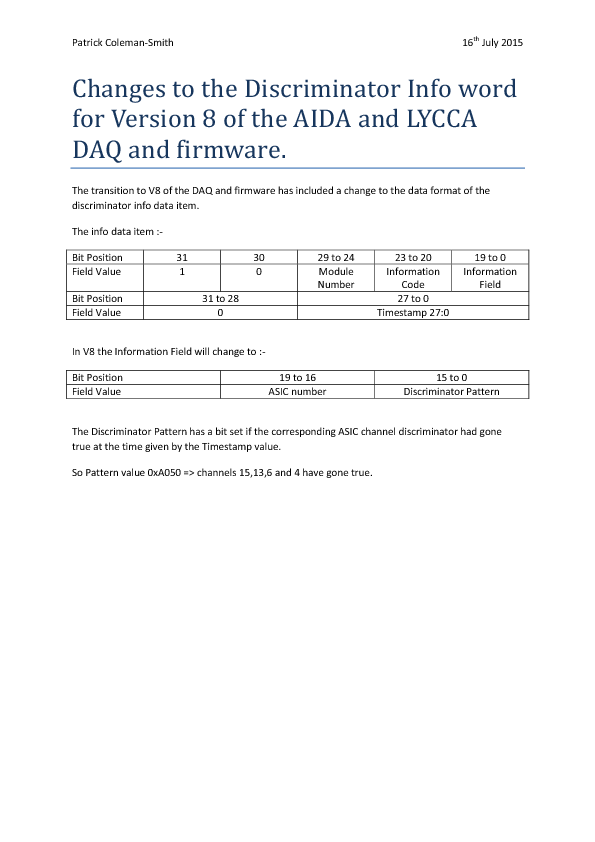
|
|
23
|
Thu Jan 22 14:26:10 2015 |
Alfredo and Tom | [DATA] R49: alpha background radioactivity | Jan20-21, 2015
R49_* are a set of files corresponding to an overnight background measurement, with goal of detecting alphas
from uranium decay chain contaminants.
The settings of ASICs are attached as a screenshot. The low comparator thresholds are (see previous entry):
nnaida#11= 0x16
nnaida#12= 0x40
nnaida#13= 0x20
nnaida#14= 0x16
For a significant fraction of the measurement, NNAIDA12 and NNAIDA13 were not generating good data. We
didn't
invest much time in solving the issue, as it's recurrent problem with NNAIDA12, but it seems some ASICS went
back to normal behavior overnight.
Due to limited storage space, data in external drive (/media/data/TapeData/Test100/), and backued up
temporarly
in Edinburhg (/Disk/ds-sopa-personal/aestrade/data/AIDA/).
A pulser walkthrough for this setting is available in runs R61-R65 (see next elog entry).
++ DATA ANALYSIS ++
A fraction of the runs (R49_1, R40_10-14) were analysed with the 'beta' version of the Root sort code for
event
reconstruction (/homes/npg/AIDAsort/). The code creates events from data bits that fall within a window of
50usec, and included the additional requirement that the calibrated energy of each ADC hit should be E>1500
keV.
Output from Root sort code saved here:
aestrade: AIDA $ pwd
/Disk/ds-sopa-personal/aestrade/rootfiles/AIDA
aestrade: AIDA $ ls R49_alpha_bckgr*
R49_alpha_bckgr_10_calib_log.txt R49_alpha_bckgr_13_calib.root
R49_alpha_bckgr_10_calib.root R49_alpha_bckgr_13_event_log.txt
R49_alpha_bckgr_10_event_log.txt R49_alpha_bckgr_13_event.root
R49_alpha_bckgr_10_event.root R49_alpha_bckgr_14_calib_log.txt
R49_alpha_bckgr_11_calib_log.txt R49_alpha_bckgr_14_calib.root
R49_alpha_bckgr_11_calib.root R49_alpha_bckgr_14_event_log.txt
R49_alpha_bckgr_11_event_log.txt R49_alpha_bckgr_14_event.root
R49_alpha_bckgr_11_event.root R49_alpha_bckgr1_calib_log.txt
R49_alpha_bckgr_12_calib_log.txt R49_alpha_bckgr1_calib.root
R49_alpha_bckgr_12_calib.root R49_alpha_bckgr1_event_log.txt
R49_alpha_bckgr_12_event_log.txt R49_alpha_bckgr1_event.root
R49_alpha_bckgr_12_event.root R49_alpha_bckgr1_sort_log.txt
R49_alpha_bckgr_13_calib_log.txt R49_alpha_bckgr1_sort.root
A few plots from these data:
R49few_a_bckgrnd_multiplicity.png: Shows the multiplicity of reconstructed events. Peaks corresponding to
multiples of 64 are clear from pulser (64 ch/asic, although one FEE has some channels off so peaks shifted).
There is also peak at low multiplicity where gate to search for events can be placed. The events with very
high
multiplicity indicate the time window used is too large, so we get random coincidences or high count from
noisy
channels. The lower plots show how the energy sum increases linearly with the multiplicity of the event
R49few_a_bckgrnd_xy.png: Plots for the calculated mean strip for hits on each side (<x>: nnaida#11 and #12,
<y>:
nnaida#13 and #14). The different plots have different condition applied. Top left only requires
multiplicity on
x and y greater than zero (i.e., a hit for each side). The others require low multiplicity, or low spread of
the
timestamp of the hits included (spread dts<10usec), and also mask out hits with x value of 18 or 101 (very
high
count channels)
R49few_a_bckgrnd_dt_event.png: The difference of the time-stamp for hits with lowest and highest time-stamp
within each event. 50 usec is the event window considered (so highest possible value). Note that events with
multiplicity 2 (1 hit in x, and 1 hit in y) have almost exclusively a spread of very few clock cycles.
R49few_a_bckgrnd_EfEb.png: Energy front vs energy back spectra, with some of the conditions described above
(e.g. low multiplicity, or multi=2, low spread in time-stamp). All have hits with x=78 and 102 excluded. The
most clean spectra is top-right (one hit in x, one hit in y), but shows only a couple of hits with good
energy
in both sides. |
| Attachment 1: ASIC_settings_Jan20_2015.png
|
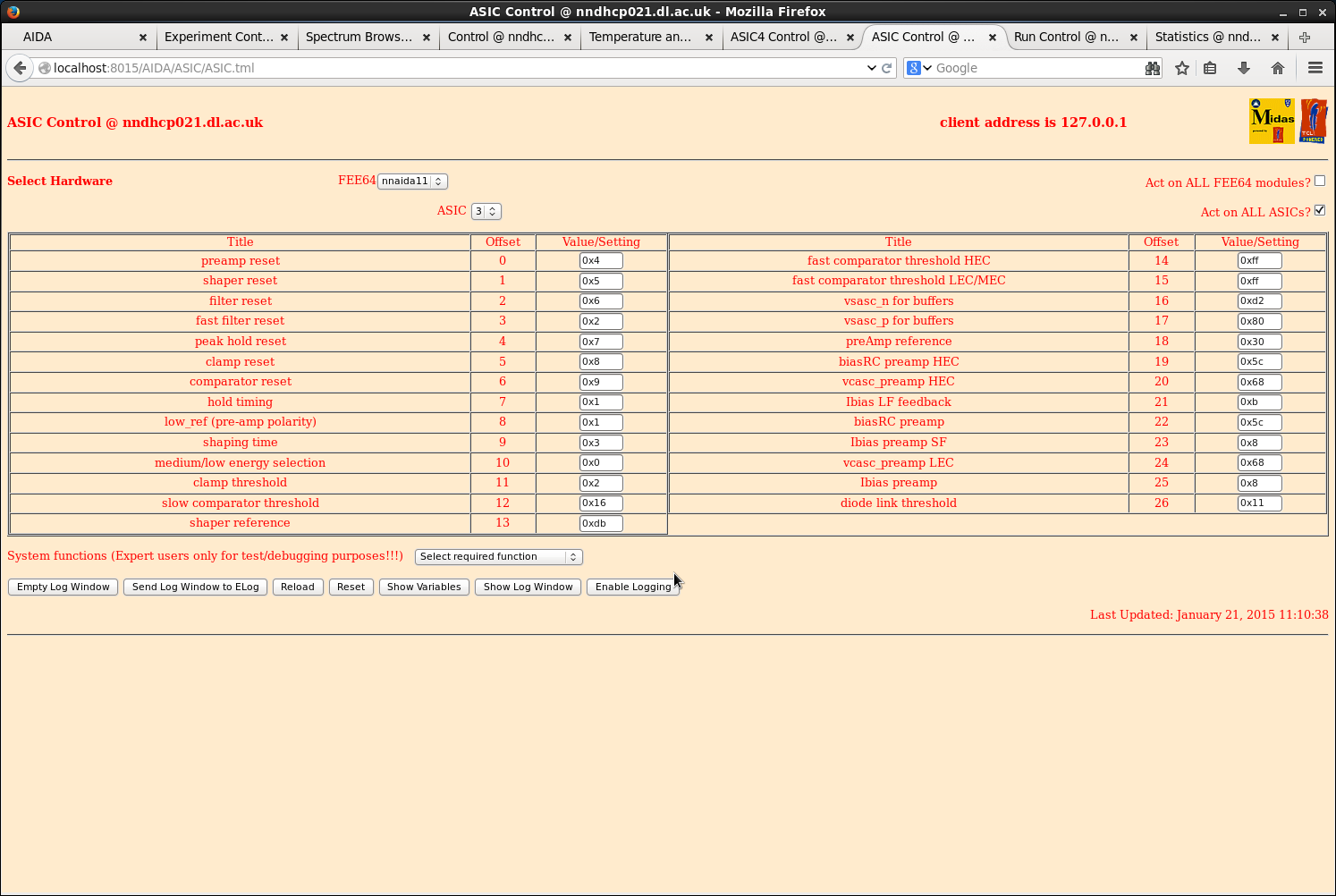
|
| Attachment 2: R49few_a_bckgrnd_multiplicity.png
|
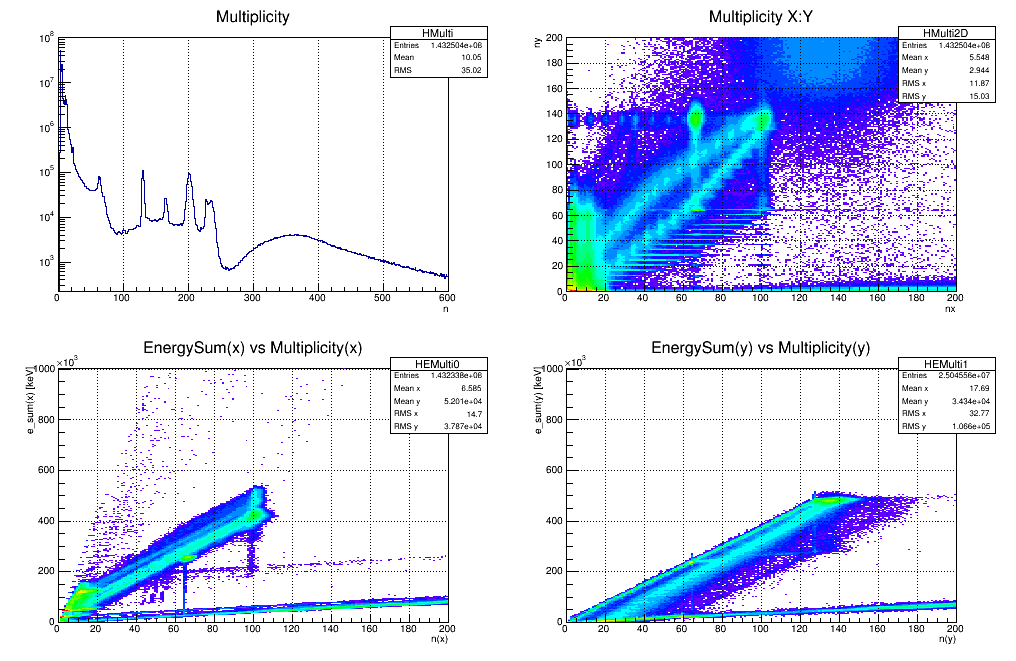
|
| Attachment 3: R49few_a_bckgrnd_xy.png
|
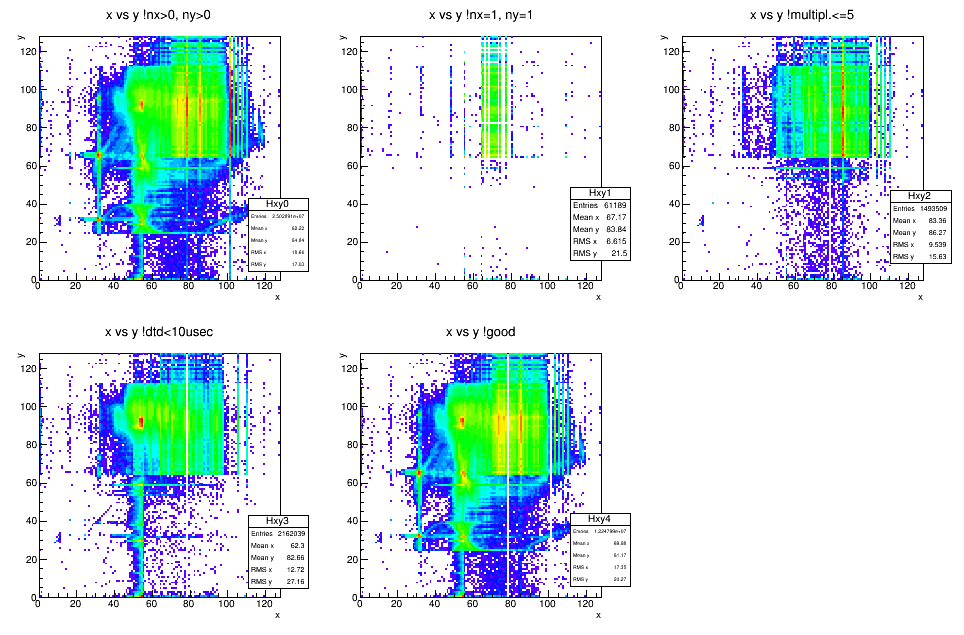
|
| Attachment 4: R49few_a_bckgrnd_dt_event.png
|
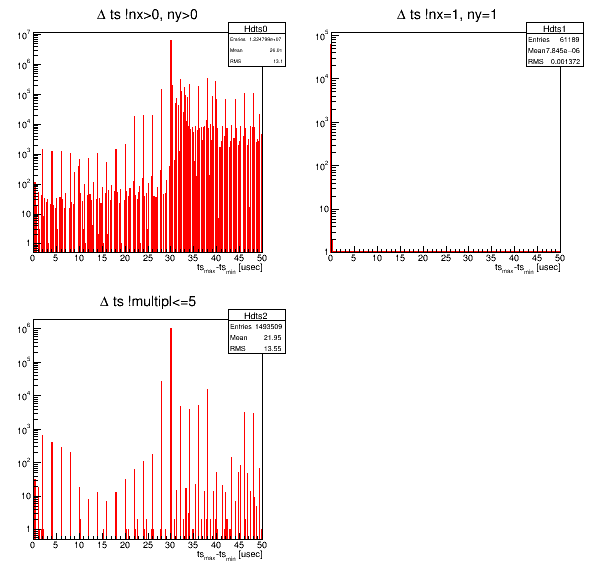
|
| Attachment 5: R49few_a_bckgrnd_EfEb.png
|
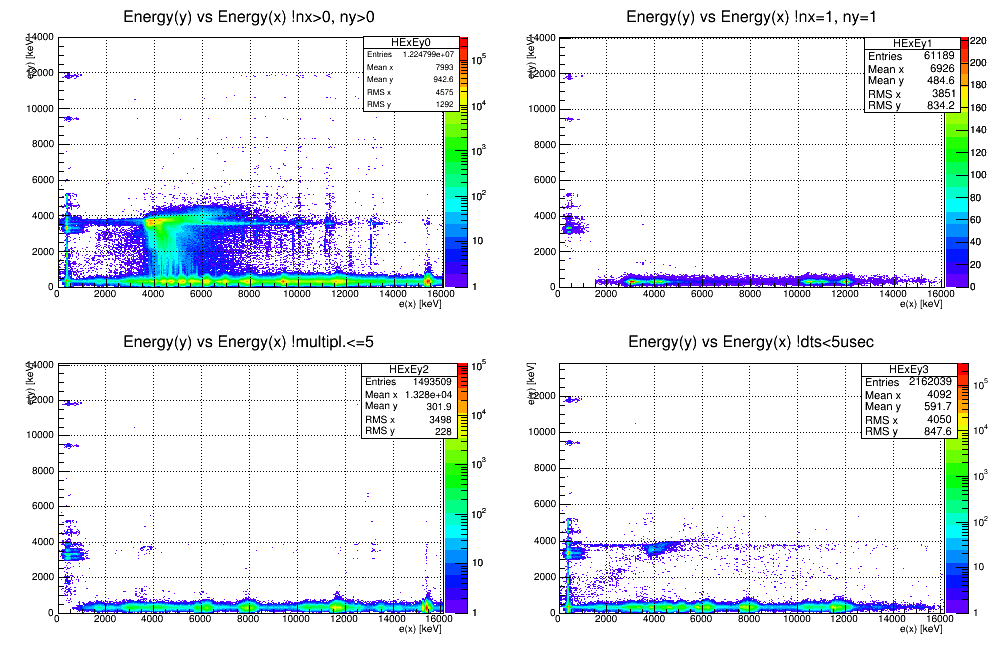
|
|
115
|
Fri Jul 17 17:28:35 2015 |
AE | [Data Analysis] Correlation Scaler 100Kr data (go4_30**.root) | Plots of corr-scaler vs event number in Root files for 100Kr(?) setting: go4_40XX.root.
Same script, and plot description, as in the ELOG entry for go4_30XX.root files: https://elog.ph.ed.ac.uk/AIDA/112
These are accumulated events for each run (to map event# -> run number):
Number of entries in PID tree= 2606359 for file /Disk/ds-sopa-group/np/RIKEN/May2015/PID_data/go4_4001.root
(accumulated= 2606359)
Number of entries in PID tree= 2609120 for file /Disk/ds-sopa-group/np/RIKEN/May2015/PID_data/go4_4002.root
(accumulated= 5215479)
Number of entries in PID tree= 2607343 for file /Disk/ds-sopa-group/np/RIKEN/May2015/PID_data/go4_4003.root
(accumulated= 7822822)
Number of entries in PID tree= 2603241 for file /Disk/ds-sopa-group/np/RIKEN/May2015/PID_data/go4_4004.root
(accumulated= 10426063)
Number of entries in PID tree= 2602664 for file /Disk/ds-sopa-group/np/RIKEN/May2015/PID_data/go4_4005.root
(accumulated= 13028727)
Number of entries in PID tree= 2597915 for file /Disk/ds-sopa-group/np/RIKEN/May2015/PID_data/go4_4006.root
(accumulated= 15626642)
Number of entries in PID tree= 2606679 for file /Disk/ds-sopa-group/np/RIKEN/May2015/PID_data/go4_4007.root
(accumulated= 18233321)
Number of entries in PID tree= 2604197 for file /Disk/ds-sopa-group/np/RIKEN/May2015/PID_data/go4_4008.root
(accumulated= 20837518)
Number of entries in PID tree= 2604402 for file /Disk/ds-sopa-group/np/RIKEN/May2015/PID_data/go4_4009.root
(accumulated= 23441920)
Number of entries in PID tree= 2604980 for file /Disk/ds-sopa-group/np/RIKEN/May2015/PID_data/go4_4010.root
(accumulated= 26046900)
Number of entries in PID tree= 2608074 for file /Disk/ds-sopa-group/np/RIKEN/May2015/PID_data/go4_4011.root
(accumulated= 2608074)
Number of entries in PID tree= 2609093 for file /Disk/ds-sopa-group/np/RIKEN/May2015/PID_data/go4_4012.root
(accumulated= 5217167)
Number of entries in PID tree= 2608080 for file /Disk/ds-sopa-group/np/RIKEN/May2015/PID_data/go4_4013.root
(accumulated= 7825247)
Number of entries in PID tree= 2605479 for file /Disk/ds-sopa-group/np/RIKEN/May2015/PID_data/go4_4014.root
(accumulated= 10430726)
Number of entries in PID tree= 2598820 for file /Disk/ds-sopa-group/np/RIKEN/May2015/PID_data/go4_4015.root
(accumulated= 13029546)
Number of entries in PID tree= 2603066 for file /Disk/ds-sopa-group/np/RIKEN/May2015/PID_data/go4_4016.root
(accumulated= 15632612)
Number of entries in PID tree= 2605692 for file /Disk/ds-sopa-group/np/RIKEN/May2015/PID_data/go4_4017.root
(accumulated= 18238304)
Number of entries in PID tree= 2611812 for file /Disk/ds-sopa-group/np/RIKEN/May2015/PID_data/go4_4018.root
(accumulated= 20850116)
Number of entries in PID tree= 2607623 for file /Disk/ds-sopa-group/np/RIKEN/May2015/PID_data/go4_4019.root
(accumulated= 23457739)
Number of entries in PID tree= 2607970 for file /Disk/ds-sopa-group/np/RIKEN/May2015/PID_data/go4_4020.root
(accumulated= 26065709)
Number of entries in PID tree= 2609207 for file /Disk/ds-sopa-group/np/RIKEN/May2015/PID_data/go4_4021.root
(accumulated= 2609207)
Number of entries in PID tree= 2602567 for file /Disk/ds-sopa-group/np/RIKEN/May2015/PID_data/go4_4022.root
(accumulated= 5211774)
Number of entries in PID tree= 2613624 for file /Disk/ds-sopa-group/np/RIKEN/May2015/PID_data/go4_4023.root
(accumulated= 7825398)
Number of entries in PID tree= 2612418 for file /Disk/ds-sopa-group/np/RIKEN/May2015/PID_data/go4_4024.root
(accumulated= 10437816)
Number of entries in PID tree= 2615720 for file /Disk/ds-sopa-group/np/RIKEN/May2015/PID_data/go4_4025.root
(accumulated= 13053536)
Number of entries in PID tree= 2615051 for file /Disk/ds-sopa-group/np/RIKEN/May2015/PID_data/go4_4026.root
(accumulated= 15668587)
Number of entries in PID tree= 2610490 for file /Disk/ds-sopa-group/np/RIKEN/May2015/PID_data/go4_4027.root
(accumulated= 18279077)
Number of entries in PID tree= 2608960 for file /Disk/ds-sopa-group/np/RIKEN/May2015/PID_data/go4_4028.root
(accumulated= 20888037)
Number of entries in PID tree= 2599656 for file /Disk/ds-sopa-group/np/RIKEN/May2015/PID_data/go4_4029.root
(accumulated= 23487693)
Number of entries in PID tree= 2611283 for file /Disk/ds-sopa-group/np/RIKEN/May2015/PID_data/go4_4030.root
(accumulated= 26098976)
Number of entries in PID tree= 2597833 for file /Disk/ds-sopa-group/np/RIKEN/May2015/PID_data/go4_4031.root
(accumulated= 2597833)
Number of entries in PID tree= 2574550 for file /Disk/ds-sopa-group/np/RIKEN/May2015/PID_data/go4_4032.root
(accumulated= 5172383)
Number of entries in PID tree= 2592651 for file /Disk/ds-sopa-group/np/RIKEN/May2015/PID_data/go4_4033.root
(accumulated= 7765034)
Number of entries in PID tree= 2598995 for file /Disk/ds-sopa-group/np/RIKEN/May2015/PID_data/go4_4034.root
(accumulated= 10364029)
Number of entries in PID tree= 2605854 for file /Disk/ds-sopa-group/np/RIKEN/May2015/PID_data/go4_4035.root
(accumulated= 12969883)
Number of entries in PID tree= 2603045 for file /Disk/ds-sopa-group/np/RIKEN/May2015/PID_data/go4_4036.root
(accumulated= 15572928)
Number of entries in PID tree= 2596530 for file /Disk/ds-sopa-group/np/RIKEN/May2015/PID_data/go4_4037.root
(accumulated= 18169458)
Number of entries in PID tree= 2582396 for file /Disk/ds-sopa-group/np/RIKEN/May2015/PID_data/go4_4038.root
(accumulated= 20751854)
Number of entries in PID tree= 2573176 for file /Disk/ds-sopa-group/np/RIKEN/May2015/PID_data/go4_4039.root
(accumulated= 23325030)
Number of entries in PID tree= 2579368 for file /Disk/ds-sopa-group/np/RIKEN/May2015/PID_data/go4_4040.root
(accumulated= 25904398)
Number of entries in PID tree= 2576076 for file /Disk/ds-sopa-group/np/RIKEN/May2015/PID_data/go4_4041.root
(accumulated= 2576076)
Number of entries in PID tree= 2571398 for file /Disk/ds-sopa-group/np/RIKEN/May2015/PID_data/go4_4042.root
(accumulated= 5147474)
Number of entries in PID tree= 2561229 for file /Disk/ds-sopa-group/np/RIKEN/May2015/PID_data/go4_4043.root
(accumulated= 7708703)
Number of entries in PID tree= 2555236 for file /Disk/ds-sopa-group/np/RIKEN/May2015/PID_data/go4_4044.root
(accumulated= 10263939)
Number of entries in PID tree= 2550104 for file /Disk/ds-sopa-group/np/RIKEN/May2015/PID_data/go4_4045.root
(accumulated= 12814043)
Number of entries in PID tree= 2617418 for file /Disk/ds-sopa-group/np/RIKEN/May2015/PID_data/go4_4046.root
(accumulated= 15431461)
Number of entries in PID tree= 2625206 for file /Disk/ds-sopa-group/np/RIKEN/May2015/PID_data/go4_4047.root
(accumulated= 18056667)
Number of entries in PID tree= 2619409 for file /Disk/ds-sopa-group/np/RIKEN/May2015/PID_data/go4_4048.root
(accumulated= 20676076)
Number of entries in PID tree= 1540255 for file /Disk/ds-sopa-group/np/RIKEN/May2015/PID_data/go4_4049.root
(accumulated= 22216331) |
| Attachment 1: scaler_r4001_4010.png
|
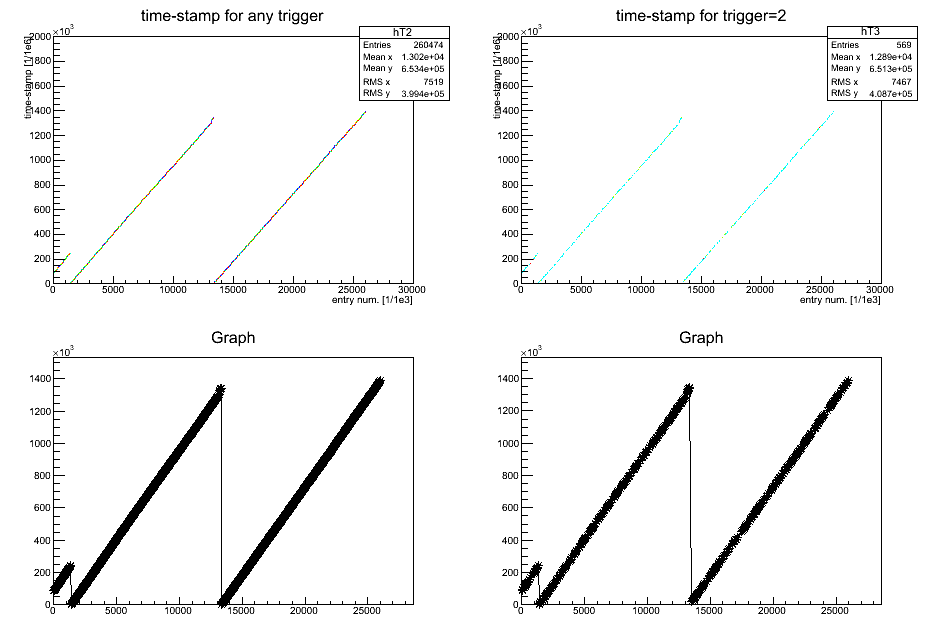
|
| Attachment 2: scaler_r4011_4020.png
|
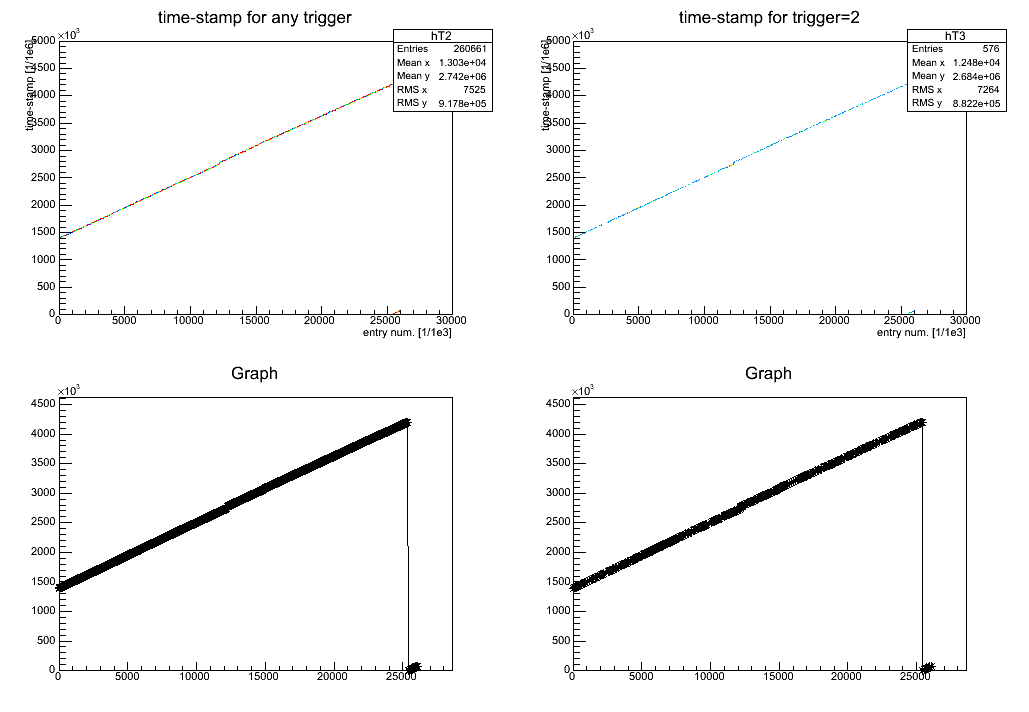
|
| Attachment 3: scaler_r4021_4030.png
|
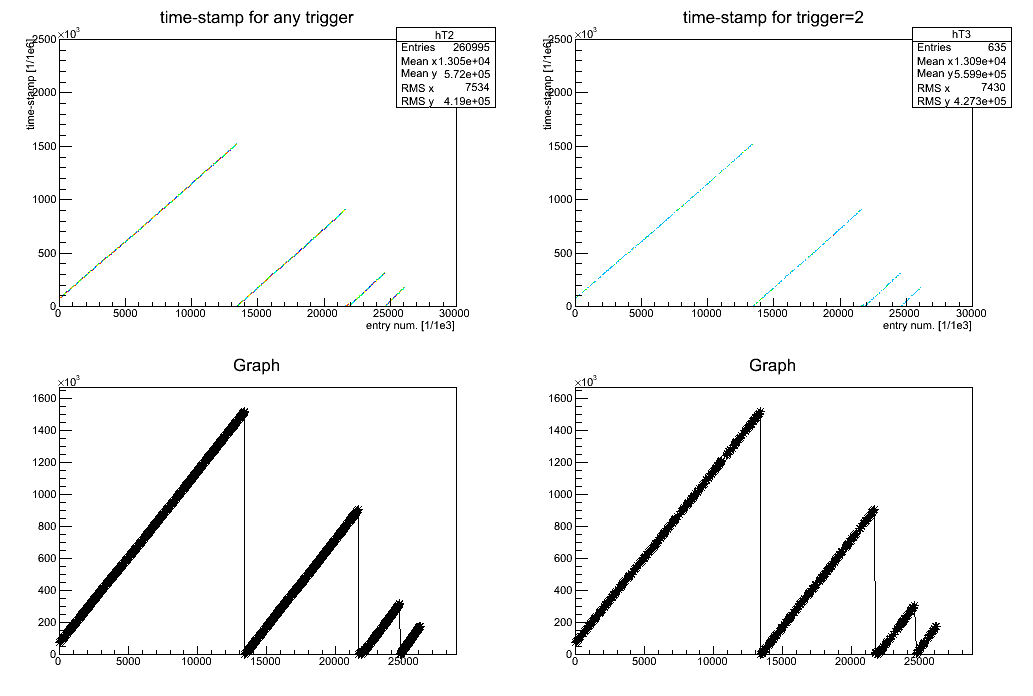
|
| Attachment 4: scaler_r4031_4040.png
|
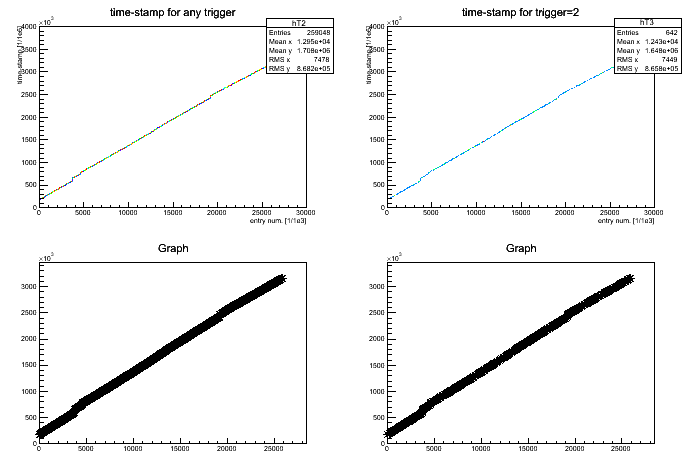
|
| Attachment 5: scaler_r4041_4049.png
|
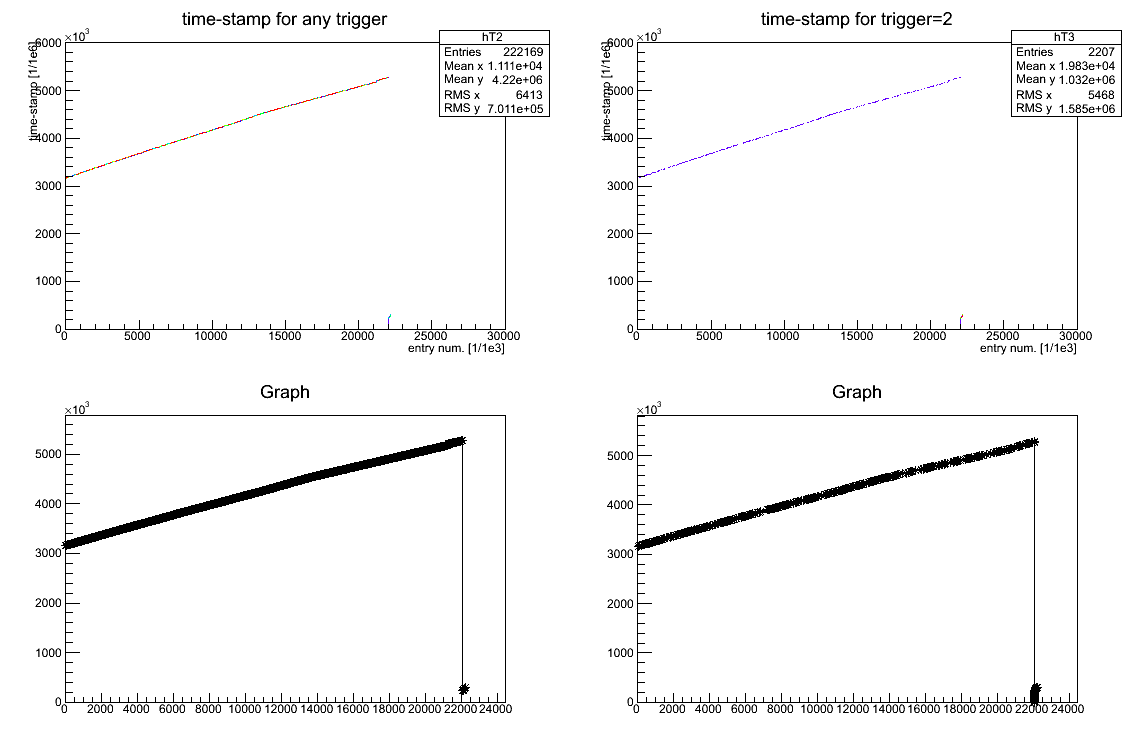
|
|
112
|
Tue Jul 14 18:06:54 2015 |
AE, CG | [Data Analysis] Correlation Scaler timestamp in PID data (go4_30**.root) | The attached plots show the time-stamp data in the EURICA files with PID information (EventInfo.timestamp). The
timestamp value should correspond to the correlation scaler included as info_code==8 in AIDA.
The plots show time-stamp vs entry number in the TTree of the Root file, with the events in groups of about 10
*.root files counted consecutively. To map entry-number to data file use informatino of number of entries per
file in the lines bellow (output of analysis script). NOTE: label for plots in right colume is wrong, trigger
type=3 (pulser) in stead of 2.
The final three plots (pulser_dts_go4_3022*.png) show the time difference between two sequential data points of a
given trigger type (fBit==2 or 3). The value that would correspond to the external scaler (fBit==3) has a peak at
about delta(ts)= 1.7 sec, but also a lot of events with a distribution centered around a smaller value of
delta(ts)~ 10 msec! One can also see the deadtime at about 300 usec at a smaller scale. The units for the
time-stamp are 1-ns.
A plot of a similar distribution for the data in AIDA shows that the peak of the correlation scaler has, in this
case, a very narrow distribution, with a frequency of ~43.5e6 x 40 ns (would agree with Go4 data from EURICA).
When scanning the files the analysis script (attached) skips a given number of entries (~100) to speed up the
analysis.
Number of entries in PID tree= 2592193 for file /Disk/ds-sopa-group/np/RIKEN/May2015/PID_data/go4_3002.root
(accumulated= 2592193)
Number of entries in PID tree= 2570084 for file /Disk/ds-sopa-group/np/RIKEN/May2015/PID_data/go4_3003.root
(accumulated= 5162277)
Number of entries in PID tree= 676355 for file /Disk/ds-sopa-group/np/RIKEN/May2015/PID_data/go4_3004.root
(accumulated= 5838632)
Number of entries in PID tree= 2582203 for file /Disk/ds-sopa-group/np/RIKEN/May2015/PID_data/go4_3005.root
(accumulated= 8420835)
Number of entries in PID tree= 2602541 for file /Disk/ds-sopa-group/np/RIKEN/May2015/PID_data/go4_3006.root
(accumulated= 11023376)
Number of entries in PID tree= 2602681 for file /Disk/ds-sopa-group/np/RIKEN/May2015/PID_data/go4_3007.root
(accumulated= 13626057)
Number of entries in PID tree= 2605726 for file /Disk/ds-sopa-group/np/RIKEN/May2015/PID_data/go4_3008.root
(accumulated= 16231783)
Number of entries in PID tree= 2606264 for file /Disk/ds-sopa-group/np/RIKEN/May2015/PID_data/go4_3009.root
(accumulated= 18838047)
Number of entries in PID tree= 2603841 for file /Disk/ds-sopa-group/np/RIKEN/May2015/PID_data/go4_3010.root
(accumulated= 21441888)
Number of entries in PID tree= 2599770 for file /Disk/ds-sopa-group/np/RIKEN/May2015/PID_data/go4_3011.root
(accumulated= 24041658)
Number of entries in PID tree= 2601002 for file /Disk/ds-sopa-group/np/RIKEN/May2015/PID_data/go4_3012.root
(accumulated= 2601002)
Number of entries in PID tree= 2598946 for file /Disk/ds-sopa-group/np/RIKEN/May2015/PID_data/go4_3013.root
(accumulated= 5199948)
Number of entries in PID tree= 2596582 for file /Disk/ds-sopa-group/np/RIKEN/May2015/PID_data/go4_3014.root
(accumulated= 7796530)
Number of entries in PID tree= 2596506 for file /Disk/ds-sopa-group/np/RIKEN/May2015/PID_data/go4_3015.root
(accumulated= 10393036)
Number of entries in PID tree= 2588772 for file /Disk/ds-sopa-group/np/RIKEN/May2015/PID_data/go4_3016.root
(accumulated= 12981808)
Number of entries in PID tree= 2583160 for file /Disk/ds-sopa-group/np/RIKEN/May2015/PID_data/go4_3017.root
(accumulated= 15564968)
Number of entries in PID tree= 2589905 for file /Disk/ds-sopa-group/np/RIKEN/May2015/PID_data/go4_3018.root
(accumulated= 18154873)
Number of entries in PID tree= 2581979 for file /Disk/ds-sopa-group/np/RIKEN/May2015/PID_data/go4_3019.root
(accumulated= 20736852)
Number of entries in PID tree= 2582410 for file /Disk/ds-sopa-group/np/RIKEN/May2015/PID_data/go4_3020.root
(accumulated= 23319262)
Number of entries in PID tree= 2582181 for file /Disk/ds-sopa-group/np/RIKEN/May2015/PID_data/go4_3021.root
(accumulated= 25901443)
Number of entries in PID tree= 2580798 for file /Disk/ds-sopa-group/np/RIKEN/May2015/PID_data/go4_3022.root
(accumulated= 2580798)
Number of entries in PID tree= 2580669 for file /Disk/ds-sopa-group/np/RIKEN/May2015/PID_data/go4_3023.root
(accumulated= 5161467)
Number of entries in PID tree= 2583346 for file /Disk/ds-sopa-group/np/RIKEN/May2015/PID_data/go4_3024.root
(accumulated= 7744813)
Number of entries in PID tree= 2645673 for file /Disk/ds-sopa-group/np/RIKEN/May2015/PID_data/go4_3025.root
(accumulated= 10390486)
Number of entries in PID tree= 1984963 for file /Disk/ds-sopa-group/np/RIKEN/May2015/PID_data/go4_3026.root
(accumulated= 12375449)
Number of entries in PID tree= 2629453 for file /Disk/ds-sopa-group/np/RIKEN/May2015/PID_data/go4_3027.root
(accumulated= 15004902)
Number of entries in PID tree= 2636095 for file /Disk/ds-sopa-group/np/RIKEN/May2015/PID_data/go4_3028.root
(accumulated= 17640997)
Number of entries in PID tree= 2639067 for file /Disk/ds-sopa-group/np/RIKEN/May2015/PID_data/go4_3029.root
(accumulated= 20280064)
Number of entries in PID tree= 2643485 for file /Disk/ds-sopa-group/np/RIKEN/May2015/PID_data/go4_3030.root
(accumulated= 22923549)
Number of entries in PID tree= 2644457 for file /Disk/ds-sopa-group/np/RIKEN/May2015/PID_data/go4_3031.root
(accumulated= 25568006)
Number of entries in PID tree= 2643522 for file /Disk/ds-sopa-group/np/RIKEN/May2015/PID_data/go4_3032.root
(accumulated= 2643522)
Number of entries in PID tree= 2641053 for file /Disk/ds-sopa-group/np/RIKEN/May2015/PID_data/go4_3033.root
(accumulated= 5284575)
Number of entries in PID tree= 2637280 for file /Disk/ds-sopa-group/np/RIKEN/May2015/PID_data/go4_3034.root
(accumulated= 7921855)
Number of entries in PID tree= 2627822 for file /Disk/ds-sopa-group/np/RIKEN/May2015/PID_data/go4_3035.root
(accumulated= 10549677)
Number of entries in PID tree= 2637326 for file /Disk/ds-sopa-group/np/RIKEN/May2015/PID_data/go4_3036.root
(accumulated= 13187003)
Number of entries in PID tree= 2635601 for file /Disk/ds-sopa-group/np/RIKEN/May2015/PID_data/go4_3037.root
(accumulated= 15822604)
Number of entries in PID tree= 2606912 for file /Disk/ds-sopa-group/np/RIKEN/May2015/PID_data/go4_3038.root
(accumulated= 18429516)
Number of entries in PID tree= 2635101 for file /Disk/ds-sopa-group/np/RIKEN/May2015/PID_data/go4_3039.root
(accumulated= 21064617)
Number of entries in PID tree= 2634932 for file /Disk/ds-sopa-group/np/RIKEN/May2015/PID_data/go4_3040.root
(accumulated= 23699549)
Number of entries in PID tree= 2633415 for file /Disk/ds-sopa-group/np/RIKEN/May2015/PID_data/go4_3041.root
(accumulated= 26332964)
Number of entries in PID tree= 2633892 for file /Disk/ds-sopa-group/np/RIKEN/May2015/PID_data/go4_3042.root
(accumulated= 2633892)
Number of entries in PID tree= 2640264 for file /Disk/ds-sopa-group/np/RIKEN/May2015/PID_data/go4_3043.root
(accumulated= 5274156)
Number of entries in PID tree= 2612700 for file /Disk/ds-sopa-group/np/RIKEN/May2015/PID_data/go4_3044.root
(accumulated= 7886856)
Number of entries in PID tree= 2632762 for file /Disk/ds-sopa-group/np/RIKEN/May2015/PID_data/go4_3045.root
(accumulated= 10519618)
Number of entries in PID tree= 1962430 for file /Disk/ds-sopa-group/np/RIKEN/May2015/PID_data/go4_3046.root
(accumulated= 12482048)
Number of entries in PID tree= 2611491 for file /Disk/ds-sopa-group/np/RIKEN/May2015/PID_data/go4_3047.root
(accumulated= 15093539)
Number of entries in PID tree= 2649244 for file /Disk/ds-sopa-group/np/RIKEN/May2015/PID_data/go4_3048.root
(accumulated= 17742783)
Number of entries in PID tree= 2679210 for file /Disk/ds-sopa-group/np/RIKEN/May2015/PID_data/go4_3049.root
(accumulated= 20421993)
Number of entries in PID tree= 518667 for file /Disk/ds-sopa-group/np/RIKEN/May2015/PID_data/go4_3050.root
(accumulated= 20940660) |
| Attachment 1: scaler_r3002_3011.png
|
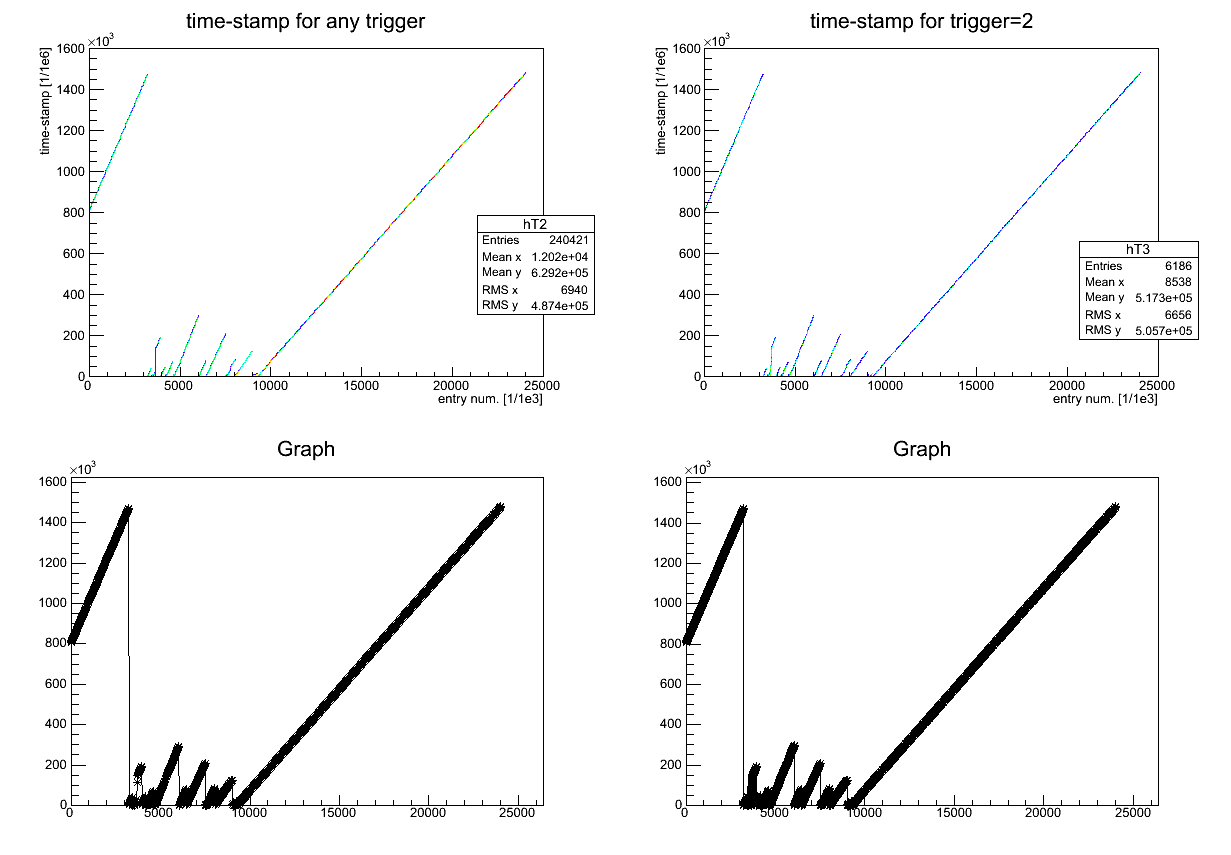
|
| Attachment 2: scaler_r3012_3021.png
|
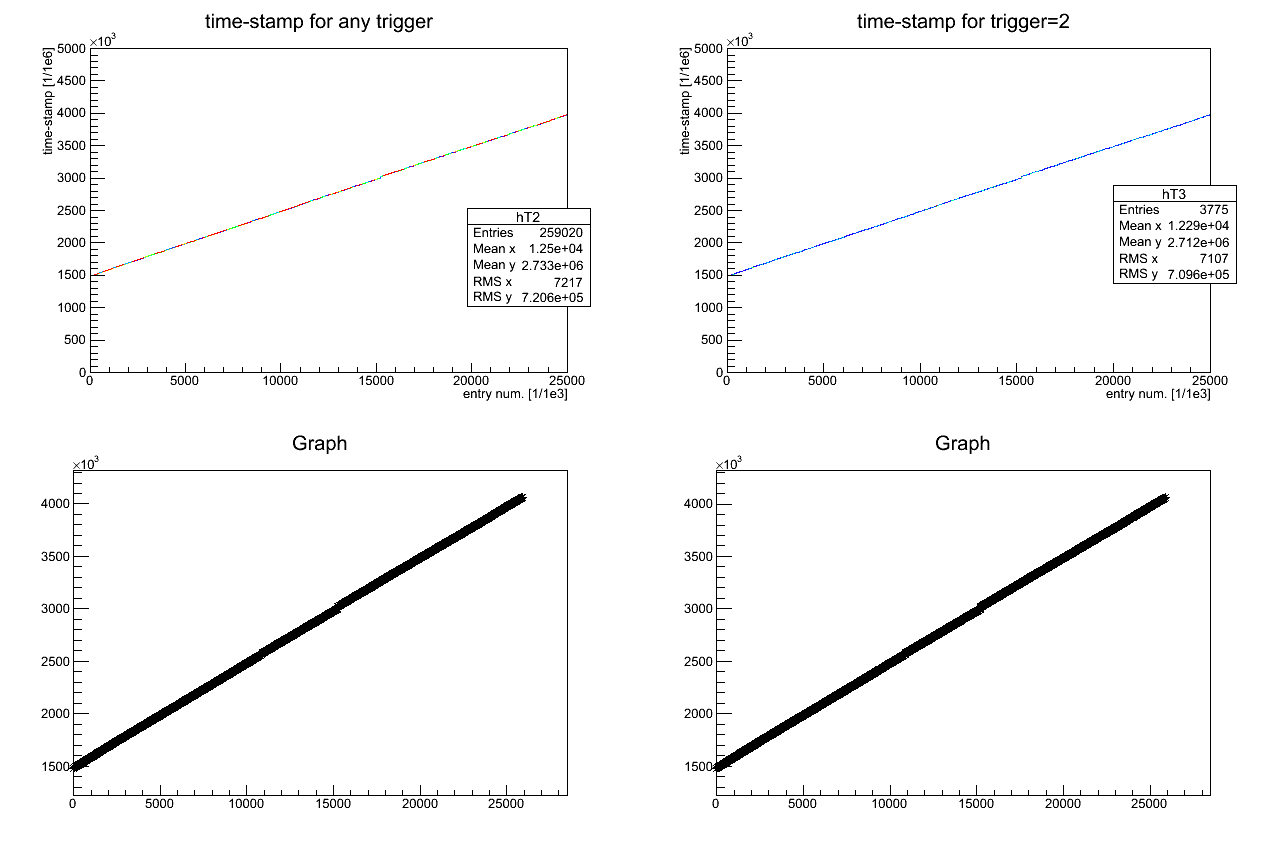
|
| Attachment 3: scaler_r3022_3031.png
|
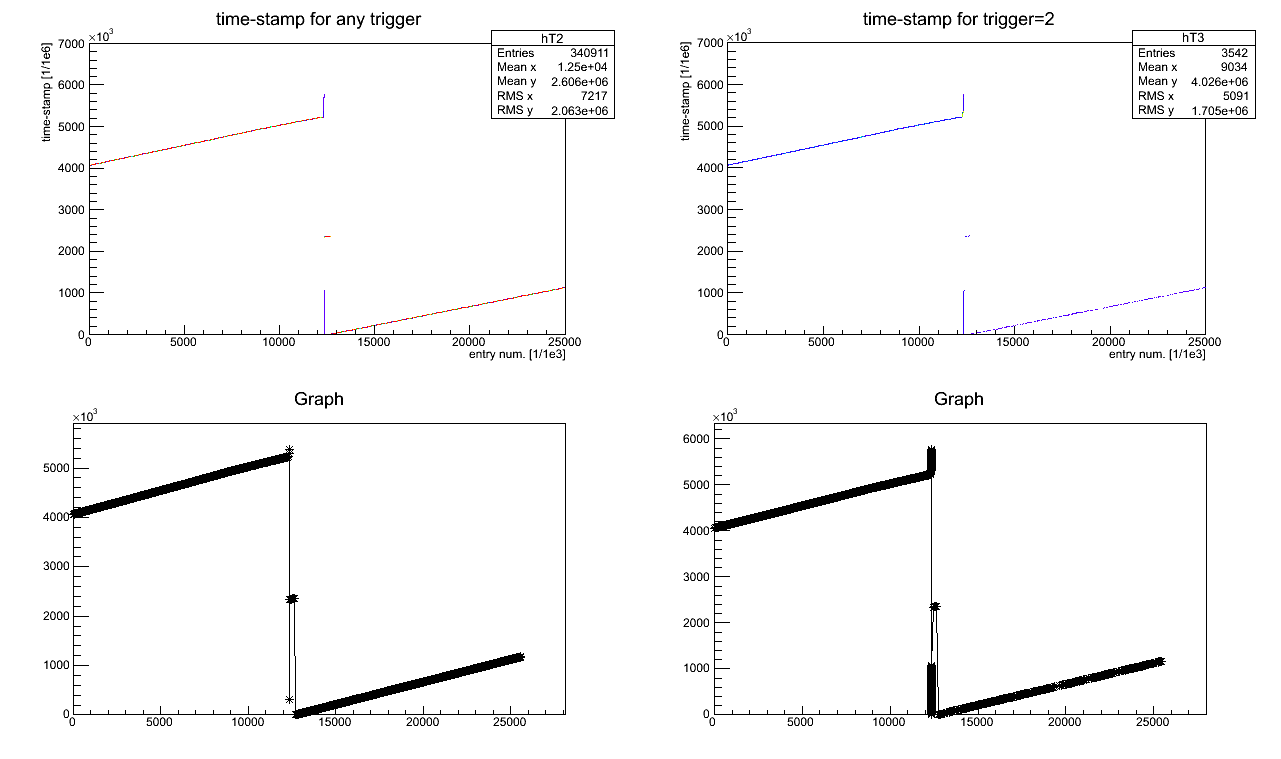
|
| Attachment 4: scaler_r3032_3041.png
|
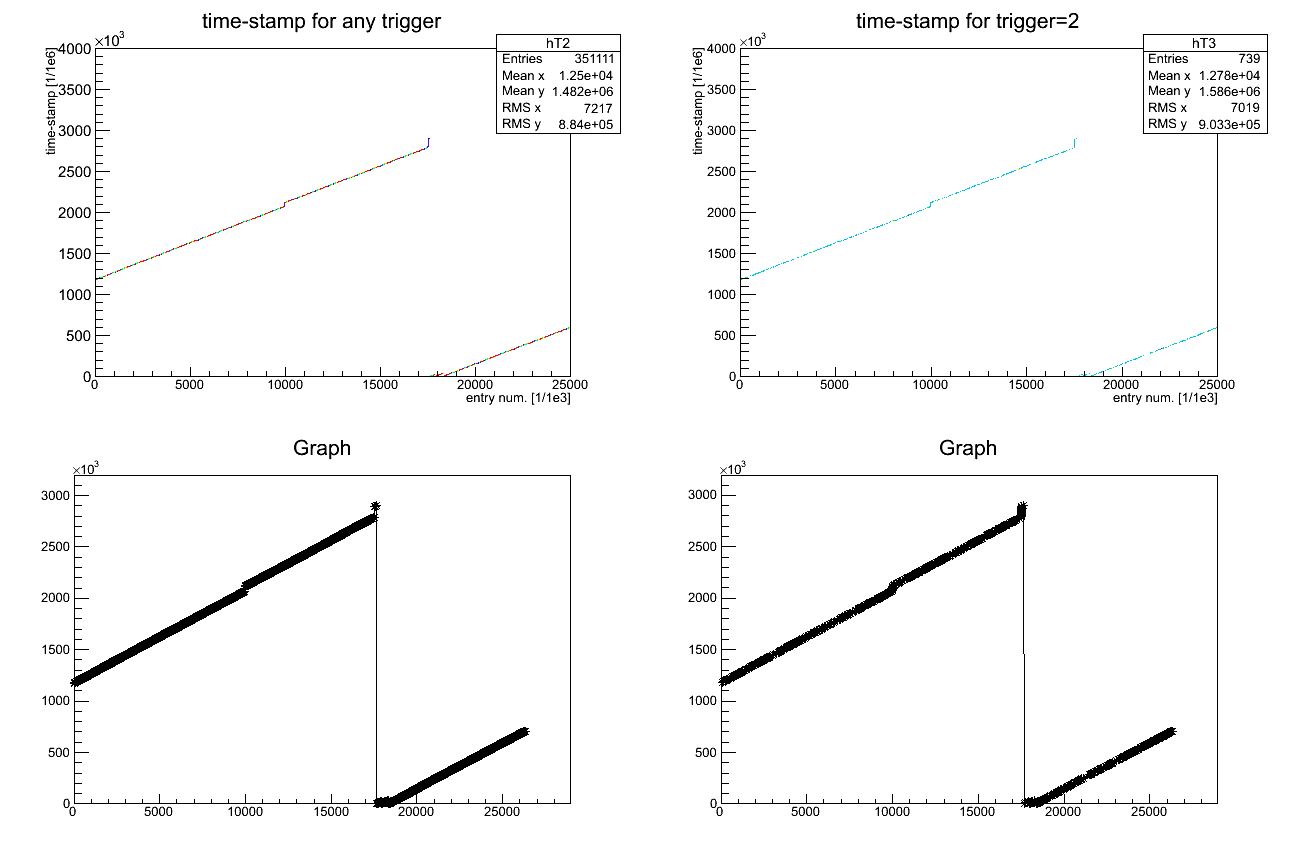
|
| Attachment 5: scaler_r3042_3050.png
|
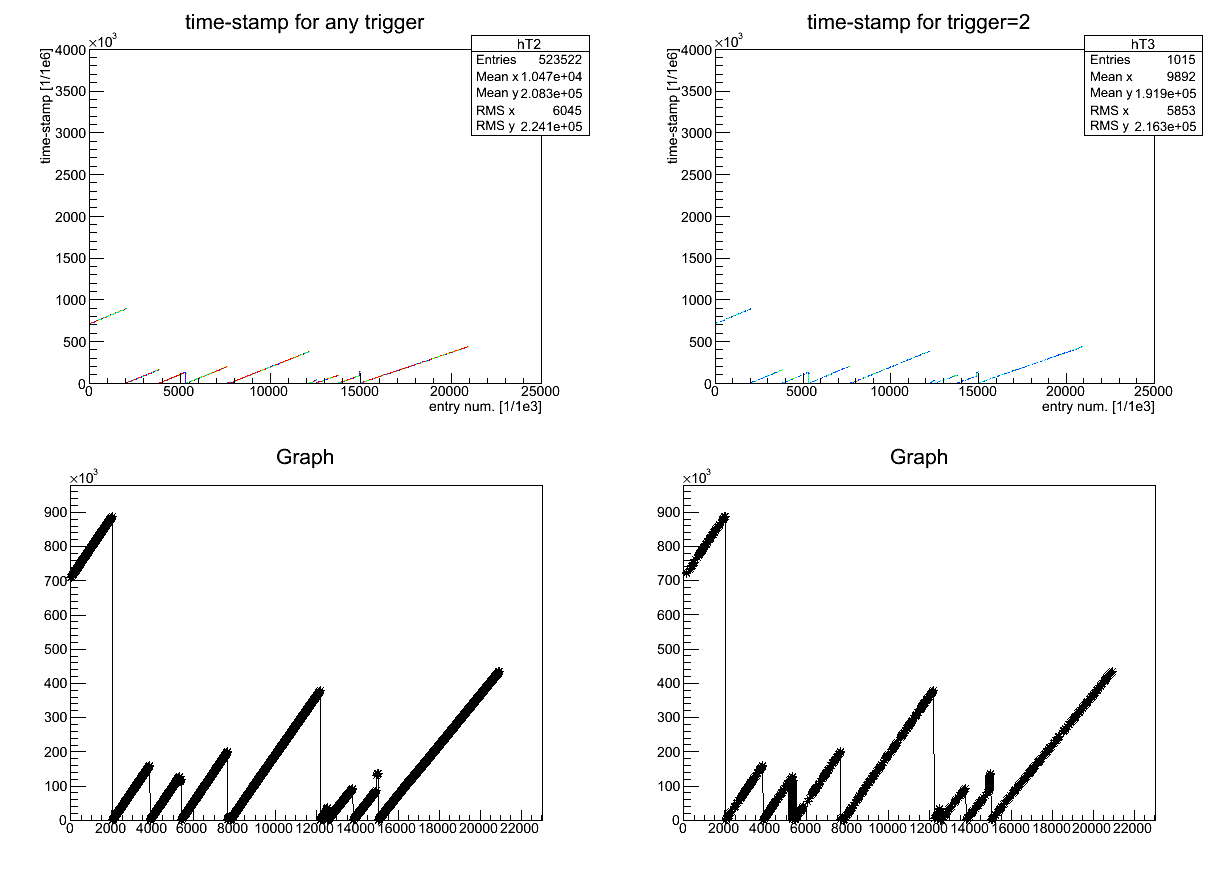
|
| Attachment 6: PlotRIBF.C
|
#include <bitset>
#include <fstream>
#include <iostream>
#include <stdio.h>
#include <sstream>
#include <string>
#include <TFile.h>
#include <TTree.h>
#include <TH1.h>
#include <TH2.h>
#include <TCanvas.h>
#include <TGraph.h>
#include <TRandom3.h>
//#include "Common.h"
//using namespace std;
//variables sorted in decreasing oredr of size: from TTree.html
/*
* struct struct_entry_midas{
unsigned long tm_stp_lsb;
unsigned long info_field;
// unsigned short sample_data[4];
unsigned short adc_data;
unsigned short sample_lenght;
unsigned char type;
unsigned char mod_id;
unsigned char ch_id;
unsigned char adc_range;
unsigned char info_code;
};
*/
//void Plot(string runNum, int Nskip=1, long long Nmax=-1, double ts_0= 0, double ts_1= 20e12, double t_ext_0= 0, double t_ext_1= 10e10, double offset_z=20e12, double t_ext_0_z=0, double t_ext_1_z=10e10){
void Plot(int run0, int Nrun, int Nskip=1, long long Nmax=-1, double kentry_max=1000, double ts_0=0, double ts_1= 500000, int Nskip2= 100){
/***********
struct dssd_hits{
Long64_t t;
Long64_t t_ext;
int x;
int y;
int z;
int ex;
int ey;
int flag;
};
struct calib_data_struct{
double time_aida;
double time_disc;
double time_external;
double adc_energy;
int adc_data;
int dssd;
int strip;
unsigned char adc_range;
unsigned char side;
unsigned char module;
unsigned char channel;
unsigned char data_type;
unsigned char info_code;
bool corr_flag; //if we have a good calculation of offset EXT->AIDA
bool disc_flag; //if we have good DISC value for ADC hit
};
struct unpack_data_struct{
unsigned long tm_stp;
unsigned long corr_scaler;
unsigned long tm_stp_lsb; //least significant bits timestamp
unsigned long info_field;
unsigned int adc_data;
unsigned int sample_length;
unsigned char data_type;
unsigned char fee64_id;
unsigned char ch_id;
unsigned char adc_range;
unsigned char info_code;
bool sync_flag;
};
******************/
TFile* input_file1;
TFile* input_file2;
TFile* input_file3;
TTree * tree1;
TTree * tree2;
TTree * tree3;
// unpack_data_struct unpack_data;
// calib_data_struct calib_data;
// dssd_hits event_data;
Long64_t delta_long64;
double delta_double;
Long64_t offset_long64;
//offset_long64= offset_z;
// TFile* input_file;
// TTree * input_tree;
//TH1I * hTs;
//TH2I * hFeeAdc;
//TH2I * hFeeCh;
//TH1I * hAdc[24];
//TH2I * hTsAdc[24];
// TH1I * Hdt_ext;
// TCanvas * c0;
// c0= new TCanvas("c0","c0"); c0->Divide(4,4); //deltaunp
// for(int i=0;i<16;i++){
//
// char my_title[256];
// char my_name[256];
// sprintf(my_name,"hDeltaUnp%d",i);
// sprintf(my_title,"#Delta time-stamp !FEE%d;t_{CORR. SCALER} - t_{AIDA}",i+1);
// hDeltaUnp[i]= new TH1I(my_name, my_title, 2048, t_ext_0, t_ext_1);
// }
ULong64_t my_tm_stp;
UInt_t my_bit;
Float_t my_Z;
ULong64_t a_tm_stp[1];
UInt_t a_bit[1];
Float_t a_Z[10];
string runName;
string path="/Disk/ds-sopa-personal/aestrade/rootfiles/AIDA/May2015/";
char pid_file[1024];
//number of data points in TTree
long long n_entries;
long long n_max;
long long n_entries_sum=0;
long long delta_ts;
double t3[10001];
double x3[10001];
double t2[10001];
double x2[10001];
int n3=0;
int n2=0;
// int Nskip2=100; //take 1/100 points for any trigger type
TH2I * hT3= new TH2I("hT3","time-stamp for trigger=2;entry num. [1/1e3];time-stamp [1/1e6]",1000,0,kentry_max,1000,ts_0,ts_1);
TH2I * hT2= new TH2I("hT2","time-stamp for any trigger;entry num. [1/1e3];time-stamp [1/1e6]",1000,0,kentry_max,1000,ts_0,ts_1);
/********/
const Int_t kMaxEventInfo = 1;
const Int_t kMaxBigRIPSRaw = 10;
Int_t EventInfo_;
Int_t BigRIPSRaw_;
ULong64_t EventInfo_timestamp[kMaxEventInfo]; //[EventInfo_]
UInt_t EventInfo_fBit[kMaxEventInfo]; //[EventInfo_]
Float_t BigRIPSRaw_Zed_F11[kMaxBigRIPSRaw]; //[BigRIPSRaw_]
TBranch *b_EventInfo_; //!
TBranch *b_BigRIPSRaw_; //!
TBranch *b_EventInfo_timestamp; //!
TBranch *b_EventInfo_fBit; //!
TBranch *b_BigRIPSRaw_Zed_F11; //!
cout << endl << endl;
for(int k=0;k<Nrun;k++){
sprintf(pid_file,"/Disk/ds-sopa-group/np/RIKEN/May2015/PID_data/go4_%d.root",run0+k);
input_file1 = new TFile(pid_file,"read");
tree1= (TTree*) input_file1->Get("tree");
if(!tree1){
cout <<"\n\nNOOOOOOOOOOOO TREEEEEEEEEEEEEEEEEEEEEEEEE"<<endl;
return;
}
// tree1->Print();
tree1->SetMakeClass(1); // important!
tree1->SetBranchAddress("EventInfo", &EventInfo_, &b_EventInfo_);
tree1->SetBranchAddress("BigRIPSRaw", &BigRIPSRaw_, &b_BigRIPSRaw_);
// tree1->SetBranchAddress("EventInfo.timestamp",&my_tm_stp,0);
// tree1->SetBranchAddress("BigRIPSRaw.Zed_F11",&my_Z,0);
// tree1->SetBranchAddress("EventInfo.fBit",&my_bit,0);
// tree1->SetBranchAddress("EventInfo.timestamp",a_tm_stp,0);
//tree1->SetBranchAddress("BigRIPSRaw.Zed_F11",a_Z,0);
// tree1->SetBranchAddress("EventInfo.fBit",a_bit,0);
tree1->SetBranchAddress("EventInfo.timestamp", EventInfo_timestamp, &b_EventInfo_timestamp);
tree1->SetBranchAddress("EventInfo.fBit", EventInfo_fBit, &b_EventInfo_fBit);
tree1->SetBranchAddress("BigRIPSRaw.Zed_F11", BigRIPSRaw_Zed_F11, &b_BigRIPSRaw_Zed_F11);
// tree1->SetBranchAddress("EventInfo.timestamp", EventInfo_timestamp, 0);
// tree1->SetBranchAddress("EventInfo.fBit", EventInfo_fBit, 0);
//tree1->SetBranchAddress("BigRIPSRaw.Zed_F11", BigRIPSRaw_Zed_F11, 0);
// tree1->SetBranchAddress("EventInfo.timestamp", EventInfo_timestamp, 0);
// tree1->SetBranchAddress("EventInfo.fBit", EventInfo_fBit, 0);
// tree1->SetBranchAddress("BigRIPSRaw.Zed_F11", BigRIPSRaw_Zed_F11, 0);
//tree1->SetBranchStatus("EventInfo.timestamp",1);
// tree1->SetBranchStatus("BigRIPSRaw.Zed_F11",1);
// tree1->SetBranchStatus("EventInfo.fBit",1);
n_entries = tree1->GetEntries();
// n_entries_sum+= n_entries;
cout << "Number of entries in PID tree= " << n_entries << " for file "<< pid_file<< " (accumulated= "<<n_entries_sum+n_entries<<")"<<endl;
// int module;
if(Nmax>0 && Nmax<n_entries) n_max= Nmax;
else n_max= n_entries;
int i2=0;
// cout << "\nBIT : TS : Z"<<endl;
for(long long i=0; i< n_max; i=i+Nskip){
//tree1->LoadTree(i);
// cout << "loaded..."<<endl;
tree1->GetEntry(i);
hT2->Fill((i+n_entries_sum)/1e3, EventInfo_timestamp[0]/1e6);
if(n2<10000 && (i2%Nskip2) ==0){
x2[n2]=(i+n_entries_sum)/1e3;
t2[n2]= EventInfo_timestamp[0]/1e6;
n2++;
}
i2++;
if(EventInfo_fBit[0]==3){
hT3->Fill((i+n_entries_sum)/1e3, EventInfo_timestamp[0]/1e6);
if(n3<10000){
x3[n3]=(i+n_entries_sum)/1e3;
t3[n3]= EventInfo_timestamp[0]/1e6;
n3++;
}
}
else if(EventInfo_fBit[0]!=2){
cout<< "i: "<<i<<" \t"<< EventInfo_timestamp[0]<<" \t"; //[EventInfo_]
cout<< EventInfo_fBit[0]<<" \t"; //[EventInfo_]
cout<< BigRIPSRaw_Zed_F11[0]<<endl; //[BigRIPSRaw_]
}
/***************
if(i < 33){
cout<< "i: "<<i<<" \t"<< EventInfo_timestamp[0]<<" \t"; //[EventInfo_]
cout<< EventInfo_fBit[0]<<" \t"; //[EventInfo_]
cout<< BigRIPSRaw_Zed_F11[0]<<endl; //[BigRIPSRaw_]
}
if(EventInfo_fBit[0] != 2){
cout<< "i: "<<i<<" \t"<< EventInfo_timestamp[0]<<" \t"; //[EventInfo_]
cout<< EventInfo_fBit[0]<<" \t"; //[EventInfo_]
cout<< BigRIPSRaw_Zed_F11[0]<<endl; //[BigRIPSRaw_]
}
... 32 more lines ...
|
| Attachment 7: pulser_dts_go4_3022.png
|
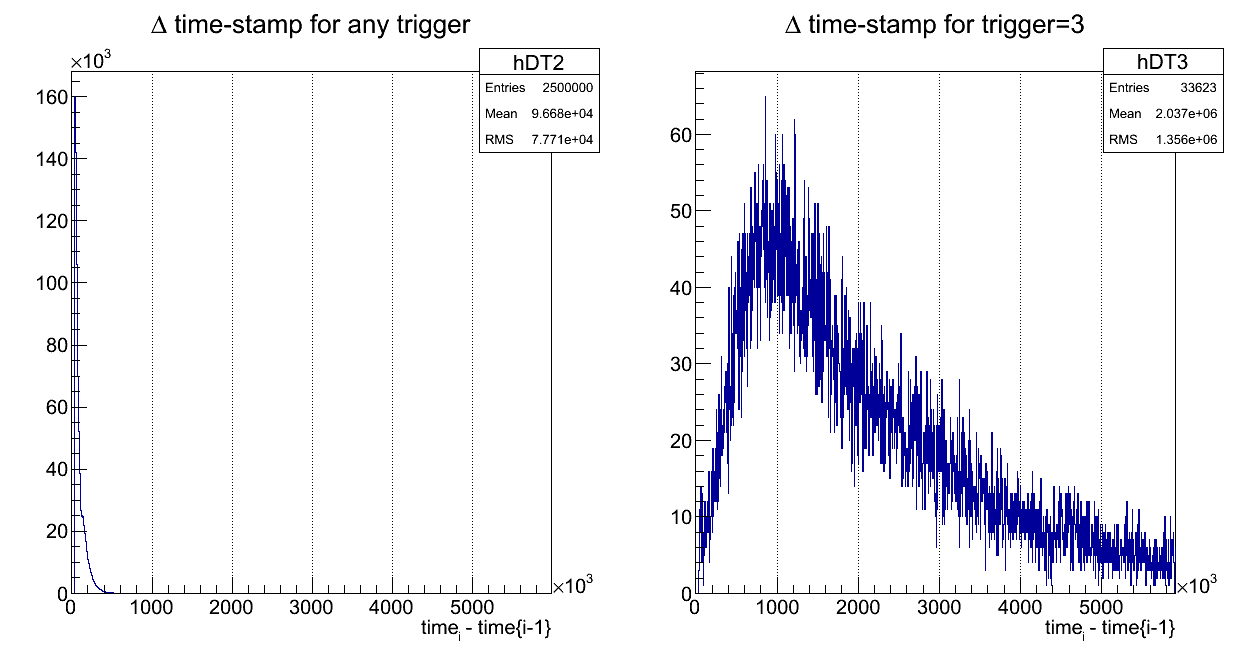
|
| Attachment 8: pulser_dts_go4_3022_Z0.png
|
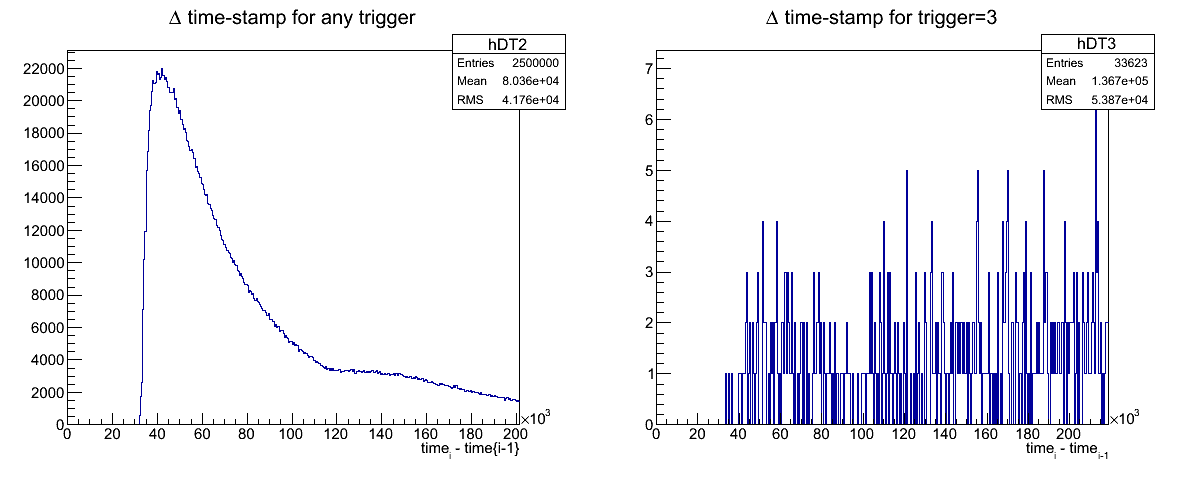
|
| Attachment 9: pulser_dts_go4_3022_Z1.png
|
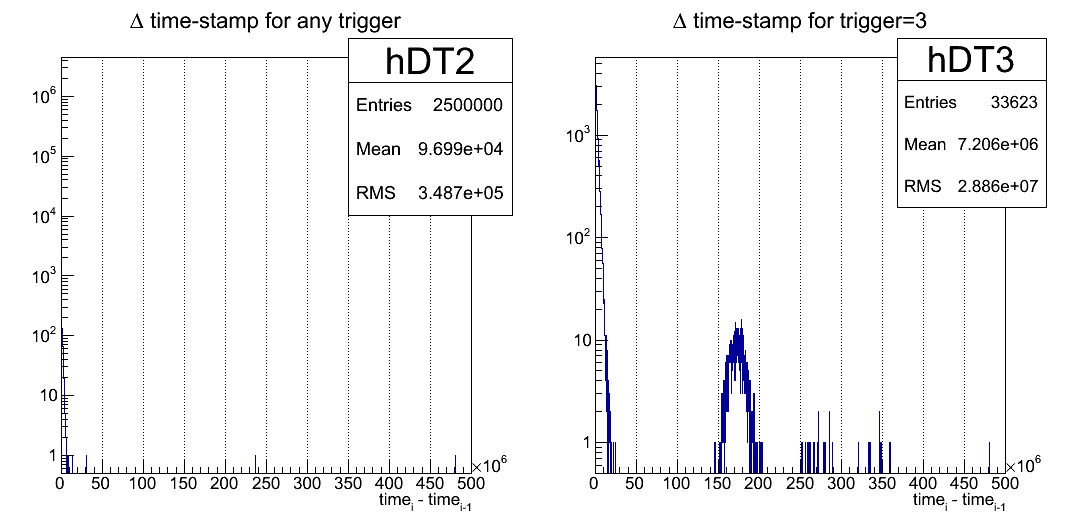
|
| Attachment 10: pulser_dts_aida_r51_3_Z1.png
|
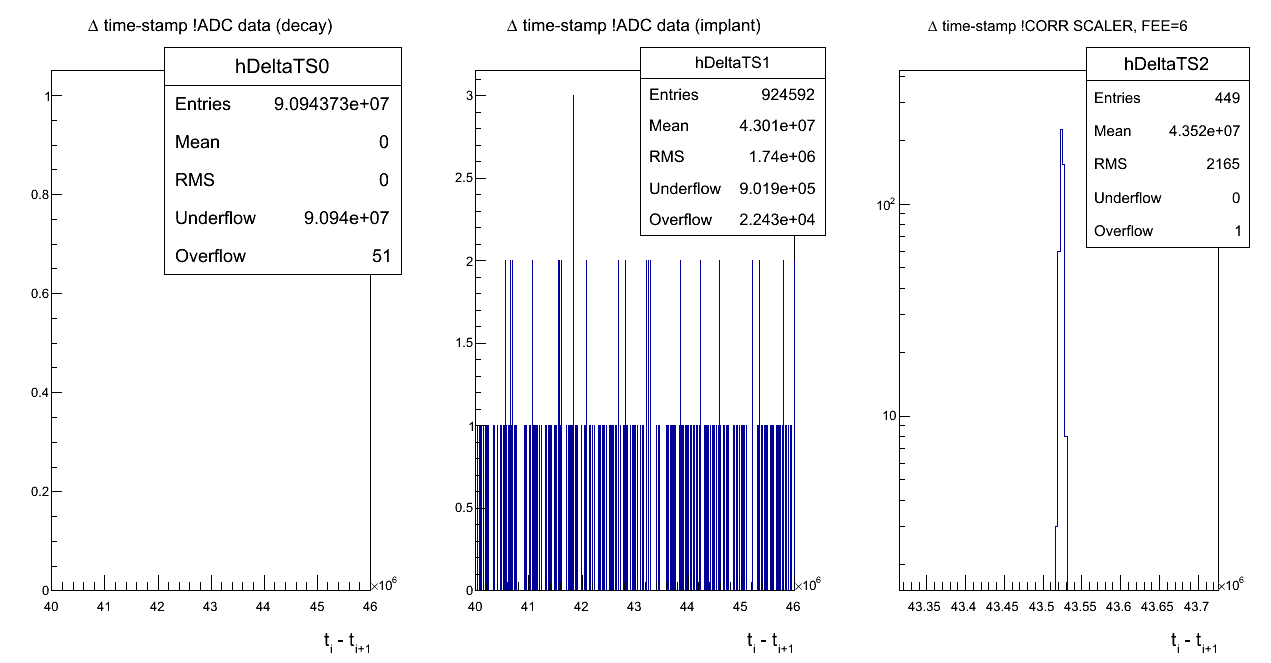
|
|
27
|
Fri Jan 30 13:02:35 2015 |
Alfredo Estrade | [Data] R61 (207Bi source) and R62-R65 (pulser walk-through) | Jan 22, 2015
R61: 207Bi source spectra accumulated during one afternoon. Same settings as in R49 (alpha background run,
elog entry 23)
+ pulser: 0.5V, split and one of the signals inverted, and f=100 Hz.
+ threshold for slow comparators:
- Eth(nnaida11)= 0x16
- Eth(nnaida12)= 0x20
- Eth(nnaida13)= 0x40
- Eth(nnaida14)= 0x16
R62-R65: short runs with different amplitude for pulser (source still in):
+ R62: pulser @ 0.75 V
+ R63: pulser @ 1.00 V
+ R64: pulser @ 0.30 V
+ R65: pulser @ 0.18 V
R61 provides another point @ 0.5. V.
Raw data files saved in external drive (/media/data/TapeData/Test100/), and in UoEdinburgh disk space
(/Disk/ds-sopa-personal/aestrade/data/AIDA/):
-rw------- 1 aestrade root 1177685085 Jan 21 16:55 R61_0.gz
-rw------- 1 aestrade root 1175087265 Jan 21 16:57 R61_1.gz
-rw------- 1 aestrade root 1176655505 Jan 21 17:00 R61_2.gz
-rw------- 1 aestrade root 1173848081 Jan 21 17:02 R61_3.gz
-rw------- 1 aestrade root 1180888194 Jan 21 17:05 R61_4.gz
-rw------- 1 aestrade root 168022642 Jan 21 17:05 R61_5.gz
-rw------- 1 aestrade root 77074827 Jan 22 13:12 R62_0.gz
-rw------- 1 aestrade root 45584289 Jan 22 13:12 R63_0.gz
-rw------- 1 aestrade root 42043231 Jan 22 13:12 R64_0.gz
-rw------- 1 aestrade root 41005241 Jan 22 13:12 R65_0.gz |
|
26
|
Thu Jan 29 15:57:01 2015 |
Patrick Coleman-Smith | [How To] AIDA power supply alteration document | I've added the power supply change document.
Please have a look and let me know if it requires further clarification.
I have ordered some plastic "pot twiddlers".
I have run a simple test with the four FEE64 here + detector.
The sequence was :-
Run the system with filtered PSU and record FWHM for 1.4.L for each of the four FEE64 boards.
Replace the PSU with a standard but with outputs set as per the attachement.
Results were approx 1.5 x worse.
Replace filtered PSU..... back as expected.
Addition: For Filter PSU only :- Set +5v to +6v when the FEE64 is not attached.
This is required as the extar impedance of the filter drops the voltage too much by the time it reaches the FEE64. |
| Attachment 1: Power_Supply_setup_and_options_for_RIKEN_February_2015.pdf
|
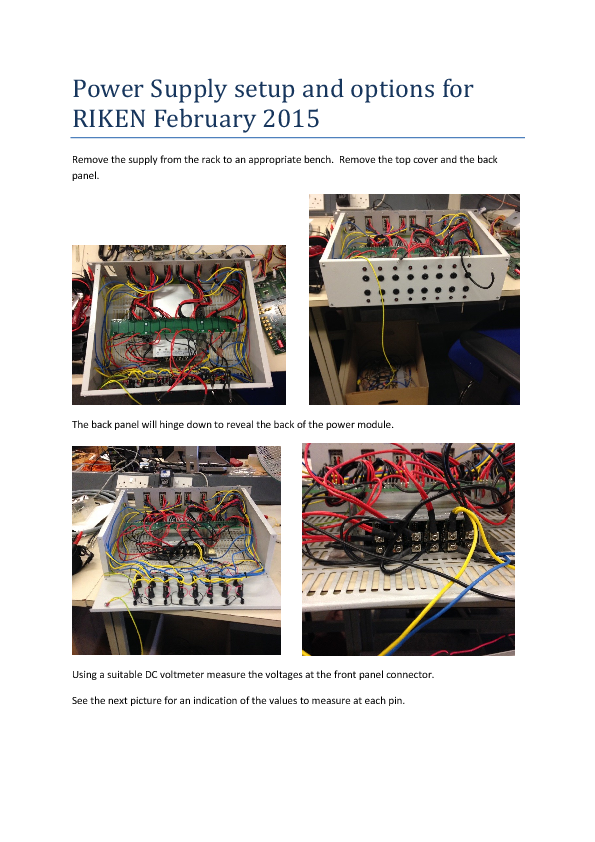
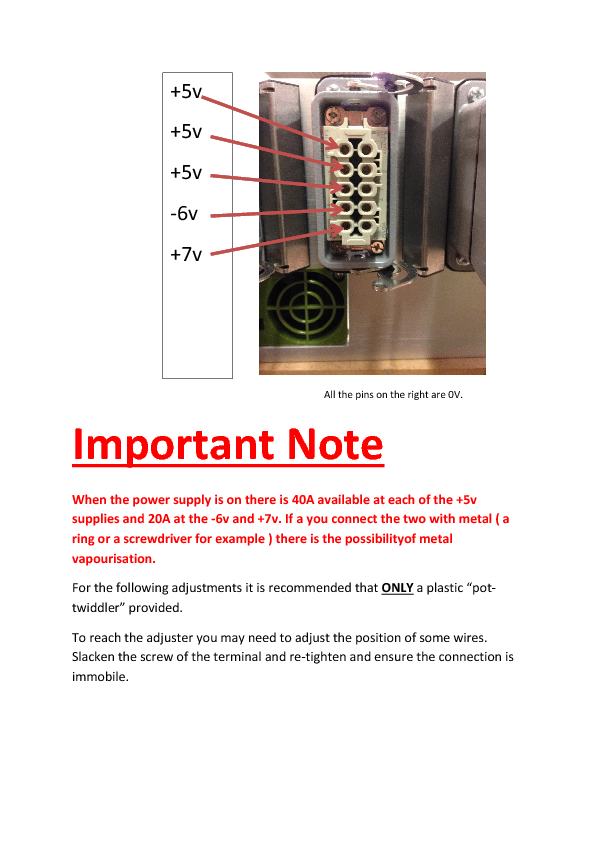
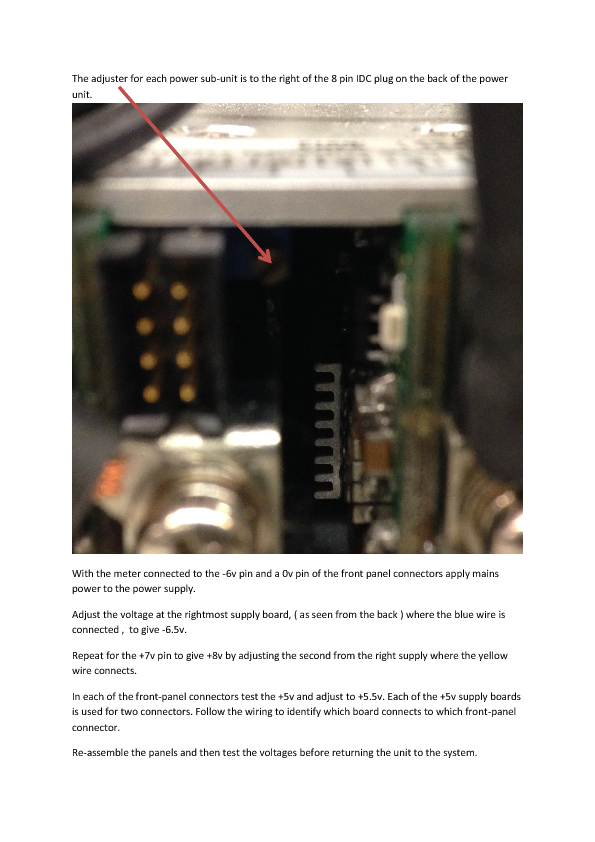
|
|
189
|
Thu Apr 28 07:42:11 2016 |
TD | [How To] Change the AIDA Acquisition Server Configuration |
Edit the file /MIDAS/config/TclHttpd/aidas1/startup.tcl and change the definition of variables
PACQSERVERS, NACQSERVERS, ACQSERVERS (respectively p+n junction strip FEE64s, n+n ohmic strip
FEE64s, and all FEE64s) for example,
variable PACQSERVERS; set PACQSERVERS { nnaida5 nnaida6 nnaida9 nnaida10}
variable NACQSERVERS; set NACQSERVERS { nnaida3 nnaida4 nnaida7 nnaida8}
lappend ACQSERVERS nnaida3
lappend ACQSERVERS nnaida4
lappend ACQSERVERS nnaida5
lappend ACQSERVERS nnaida6
lappend ACQSERVERS nnaida7
lappend ACQSERVERS nnaida8
lappend ACQSERVERS nnaida9
lappend ACQSERVERS nnaida10
You will need to close the web browser running MIDAS, restart the 'Httpd for Acquisition' server,
restart the web browser and start the MIDAS DAQ session.
On the 'Run Control' page, toggle 'Act on ALL Data Acquisition Servers' and select 'Reload' - the
revised acquisition server list should now be shown. |
| Attachment 1: startup.tcl
|
Setting BGColor "BlanchedAlmond"
Setting TextColor "red"
Setting ProjectName AIDA
Setting ProjectImage AIDA.gif
Setting ProjectURL "http://npg.dl.ac.uk/NPG/Projects/Fair.html"
Setting Option1Name STFC
Setting Option1URL "stfc.ac.uk"
Setting Option1Image stfc.jpg
#global MessageLoggerServerHost
# set MessageLoggerServerHost nndhcp077.dl.ac.uk
# package require MessageLoggerClient
Setting Option3Name "Elog Server"
Setting Option3URL "https://elog.ph.ed.ac.uk/AIDA"
# Install required services
package require XAIDAAccessClient ;# for Client end - ie AIDA server workstation sets MIDAS_XAIDAAccessClient_Exists (SOAP)
package require XAD9252AccessClient ;# for Client end - ie AIDA server workstation sets MIDAS_XAD9252AccessClient_Exists (SOAP)
namespace eval DataAcquisition {
variable ACQSERVERS; set ACQSERVERS {}
#variable PACQSERVERS; set PACQSERVERS { nnaida1 nnaida2 nnaida5 nnaida6 nnaida9 nnaida10 nnaida13 nnaida14 nnaida17 nnaida18}
#variable NACQSERVERS; set NACQSERVERS { nnaida3 nnaida4 nnaida7 nnaida8 nnaida11 nnaida12 nnaida15 nnaida16 nnaida19 nnaida20}
variable PACQSERVERS; set PACQSERVERS { nnaida5 nnaida6 nnaida9 nnaida10}
variable NACQSERVERS; set NACQSERVERS { nnaida3 nnaida4 nnaida7 nnaida8}
lappend ACQSERVERS nnaida3
lappend ACQSERVERS nnaida4
lappend ACQSERVERS nnaida5
lappend ACQSERVERS nnaida6
lappend ACQSERVERS nnaida7
lappend ACQSERVERS nnaida8
lappend ACQSERVERS nnaida9
lappend ACQSERVERS nnaida10
#3 5 7 9 11 13 15 17
# for {set i 3} {$i <= 10} {incr i} { #****Apr 2016****
# if { $i != 19 & $i != 20 } {
# lappend ACQSERVERS nnaida$i
# }
# }
#********CG added*********Mar2016
# lappend ACQSERVERS nnaida19
# lappend ACQSERVERS nnaida20
# lappend ACQSERVERS nnaida27
# lappend ACQSERVERS nnaida28
#*************************
}
namespace eval DataAcquisition {
variable PROJECT AIDA
}
namespace eval AIDA {
variable ModuleMenu; set ModuleMenu $::DataAcquisition::ACQSERVERS
variable TSMaster; set TSMaster nnaida5
variable FEE64 [first $ModuleMenu]
variable ConfigBase; set ConfigBase [file join $env(MIDASBASE) config TclHttpd]
}
Setting DataBaseRoot "/MIDAS@aidas/DB"
package require DataBaseAccessServer
package require MemSasServer
# Install services for Run Control
package require NetVarsServer 1.1
package require SigTaskServer
namespace eval $::DataAcquisition::PROJECT {
variable DBRootName [file join EXPERIMENTS AIDA]
variable DBNodeBase 2012
}
package require AIDARunControl
Setting Option7Name "Project Home Page"
Setting Option7URL "http://npg.dl.ac.uk/NPG/Projects/Fair.html"
Setting Option8Name "Server Software Home Page"
Setting Option8URL "http://npg.dl.ac.uk/MIDAS/download/WebServices.html"
|
|
227
|
Sat May 14 11:27:09 2016 |
AE, VP | [How To] DAQ correlation monitor (June16 campaign) | The program for online monitoring the correlation of the DAQ systems (AIDA-EURICA-BigRIPS) through a common scaler is SyncCheck (J.
Agramunt).
The code runs in the d05 server, receiving data transferred to a DataSink from each of the individual DAQs. The data transfer is
done with the DataRelayFilter code for AIDA (AE), and the euricatssender and ribftssender (Baba-san) codes for EURICA and RIBFdaq,
respectively.
The attached screenshots show how to setup these programs. Follow these steps:
1) Log in to d05 as user 'aida'. Start an instance of the DataSink code with option -i 3 (3 data stream, which will use ports 10305
to 10307). The code is saved in /home/aida/DataPackage/DataSink/Linux64
2) In the d05 server start the following codes: euricatssender (in /home/aida/ribfts/euricatssender/ directory), and ribftssender
(in /home/aida/ribfts/ribftssender/ directory). If you give the codes dummy command line option (e.g. -X) the value of transferred
timestamps will be printed to screen as diagnostics.
3) In the AIDA computer (aidas1), start the DataRelayFilter program (will work from any directory). As command line arguments
provide the IP address of d05, and the TCP port and id of the data stream for the DataSink program: DataRelayFilter -n 10.32.0.12 -
p 10307 -I 2
Only the master FEE will produce correlation scalar items (?). The code has as default NNAIDA5 for the module where to search for the Corr Scaler
items; if this has to be changed use command line option -m X (where X is NNAIDAX number for new master FEE)
4) Back in the d05 server start the SyncCheck program, in the directory /home/aida/SyncCheck/. You can give as an argument the ID
of the Master data stream for the synchronization check, through "-M ID" (should be done if one of the three data streams is down).
For example "SynCheck -M 2" will use AIDA as the master timestamp.
5) Perform a manual correlation reset request to synchronize the value of the correlation scaler in all three DAQs. This is done with the
button 'Force Correlation Reset' of the AIDA "Correlation Status & Control" webpage (attachment 2), which can be accessed from the MIDAS web-
based control of AIDA.
The SyncCheck code will display a few spectra for onine monitoring of DAQ correlation (attachment 3, shown only with AIDA and EURICA running).
A peak will appear showing the offset in the correlation scaler between the different DAQs. The counts in the peak should increase
continuously, and its position should not change. If it doesn't, try sending a Correlation Reset signal (step 5). If this does not fix the
monitor, report a correlation error!
Further information on the scheme for data synchronization is here:
https://elog.ph.ed.ac.uk/BRIKEN/6
https://elog.ph.ed.ac.uk/BRIKEN/5 |
| Attachment 1: sync2.png
|
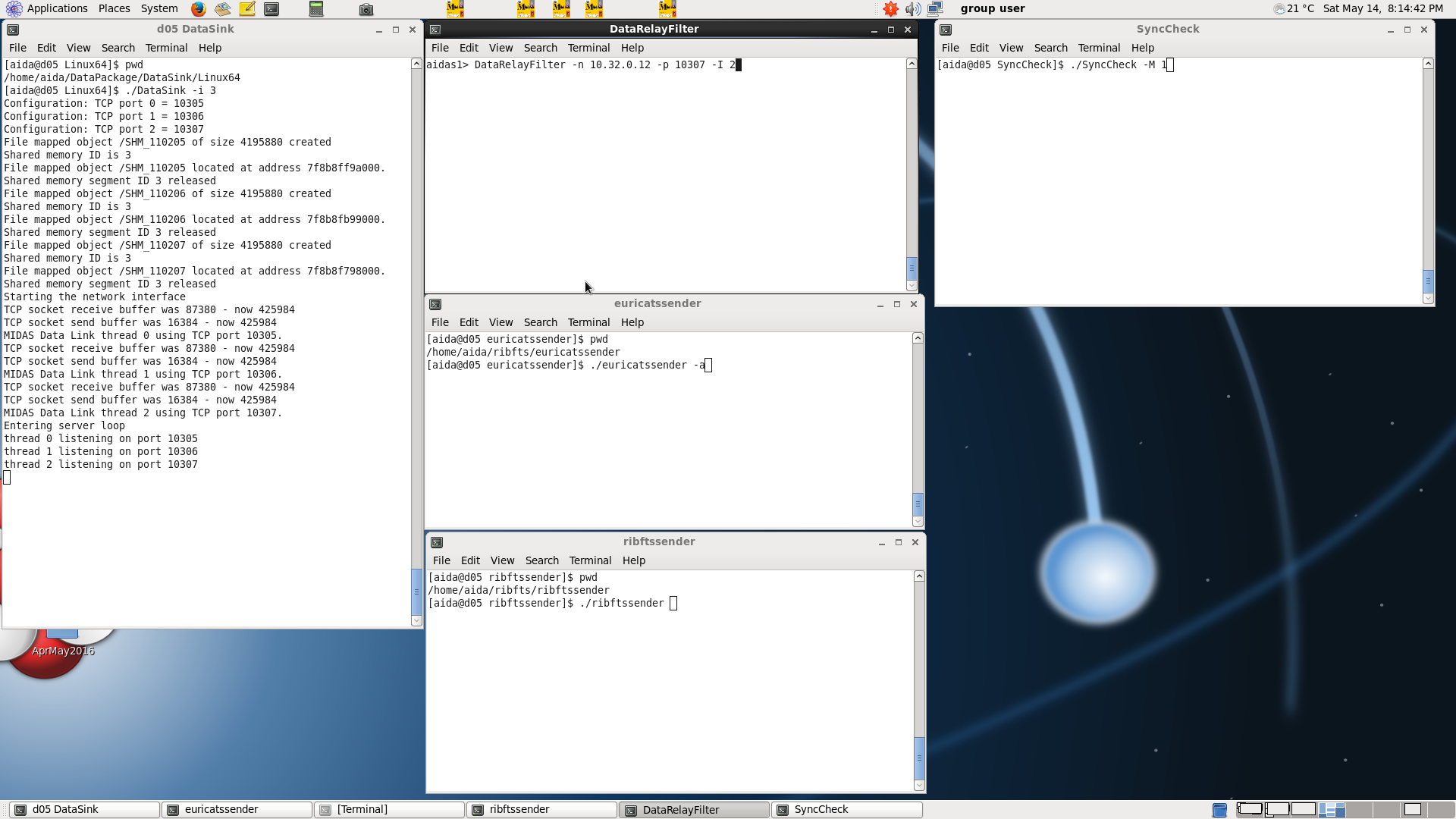
|
| Attachment 2: sync3.png
|
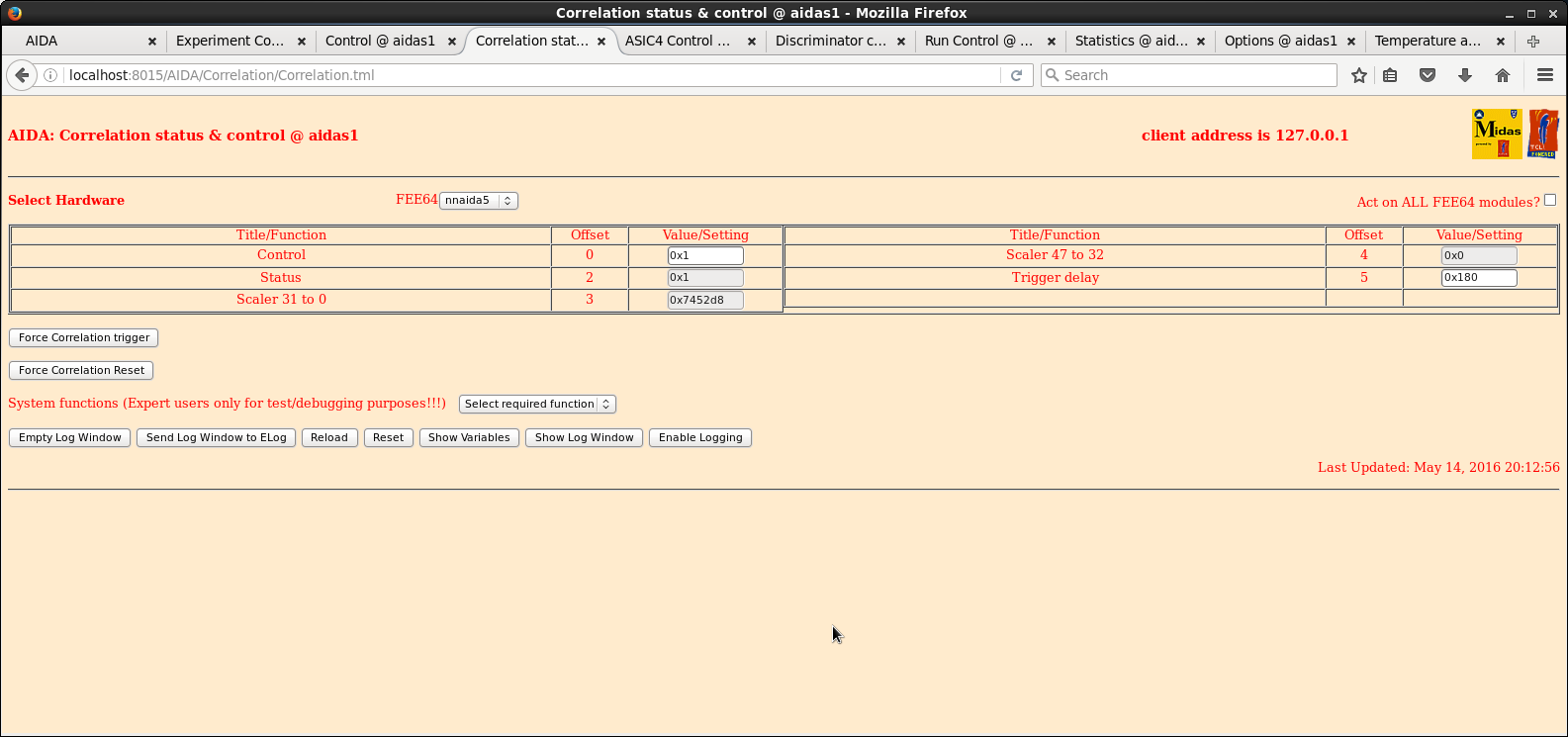
|
| Attachment 3: sync5.png
|
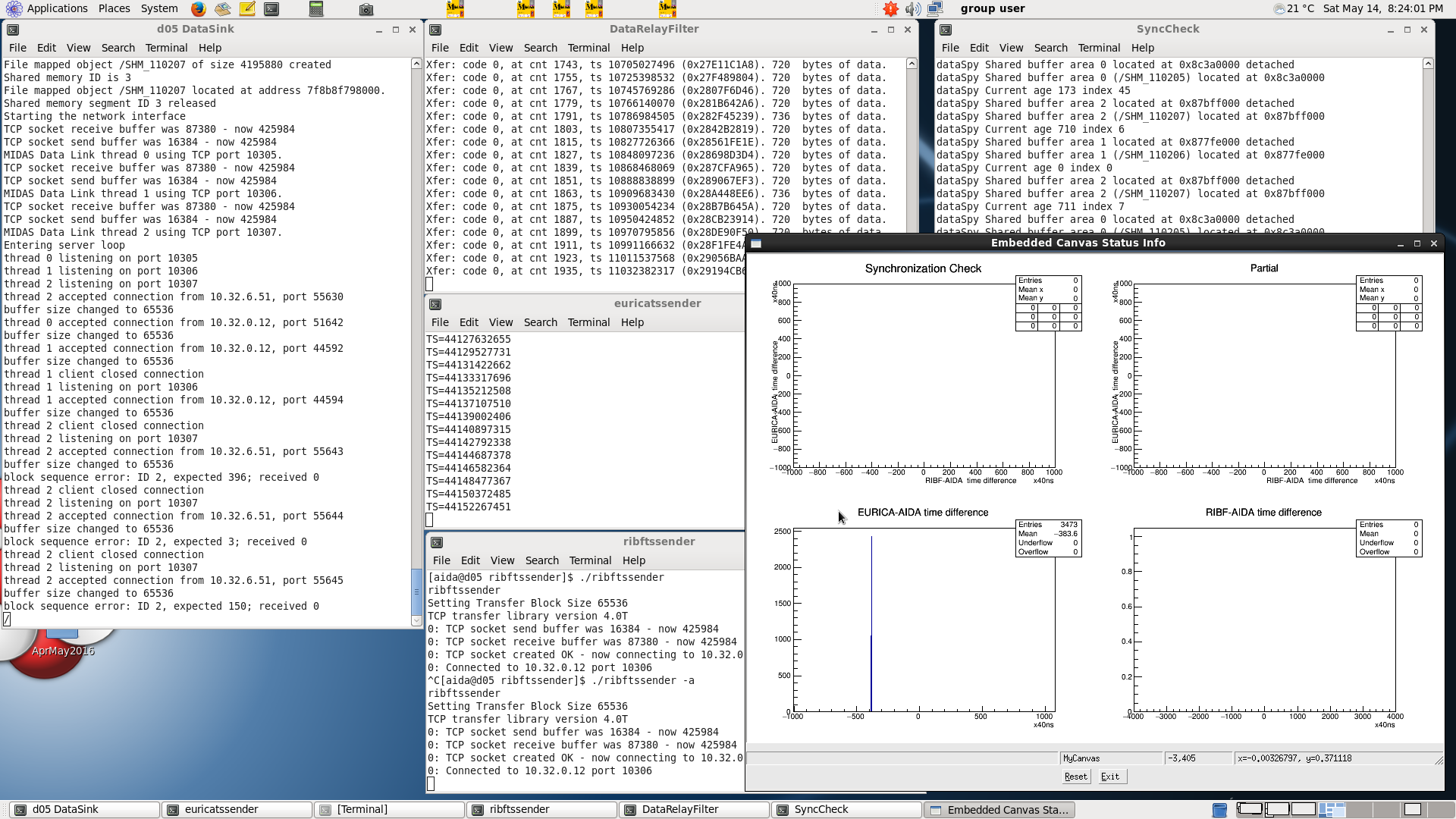
|
| Attachment 4: sync6.png
|
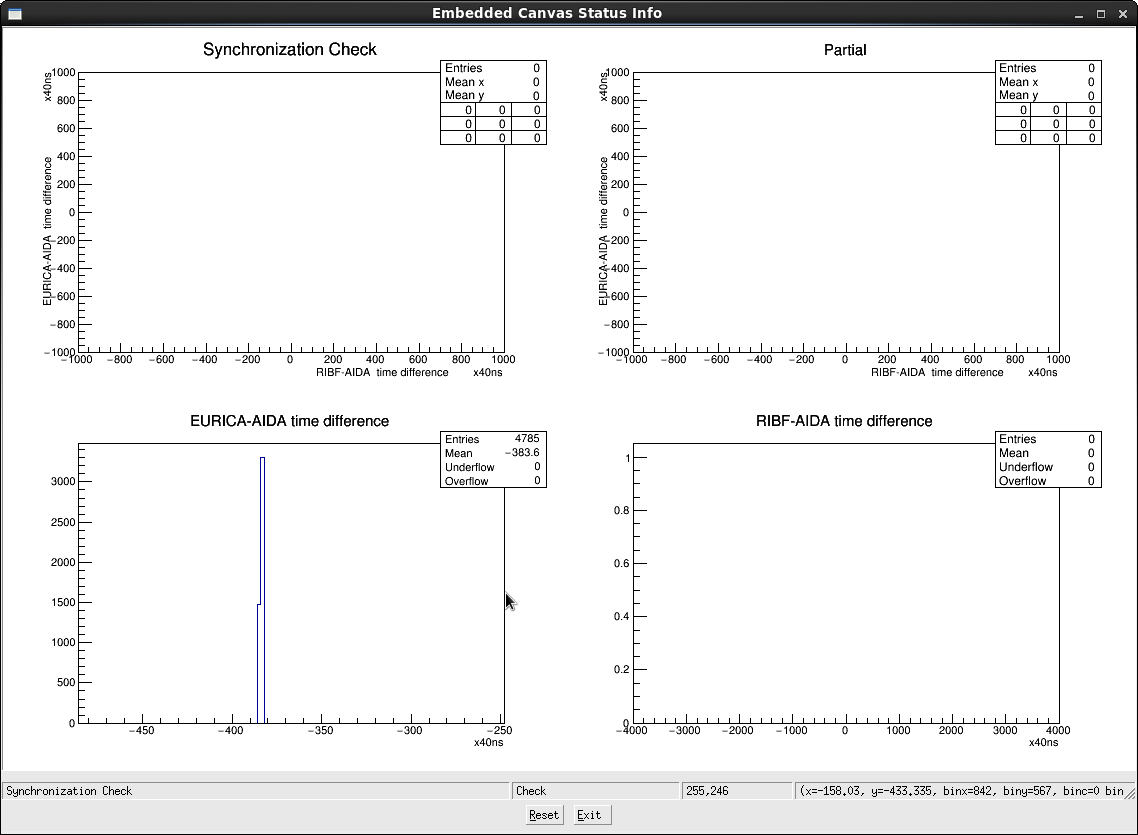
|
|
25
|
Wed Jan 28 16:19:05 2015 |
Patrick Coleman-Smith | [How To] Loading new firmware into a FEE64 | Log into the FEE64 module using telnet.
use root
enter => /usr/sbin/flash_unlock /dev/mtd2
enter => /usr/sbin/flashcp -v /MIDAS/Aida/< filename>.bin /dev/mtd2
then logout when done.
The flashcp program will erase the existing contents, then write the new file and finally verify the result.
Power cycle the FEE64 will load the new firmware.
The -v flag after the flashcp command ensures you can see what is going on.
There is a script in the /MIDAS/Aida directory called FlashPgm.csh which contains these commands and is used by the global re-programming command from the "Expert" menu on the RunControl page.
If you wish to program a lot of modules then alter the filename in the flashcp command in this script.
Please let me know if you see errors in this description.
|
|
211
|
Thu May 5 08:47:49 2016 |
TD | [How To] Mask Fast Discriminators | From the 'AIDA Control' tab select 'Discriminator control'
From the 'Discriminator controls' tab
select 'Reload'
select FEE64 required
select (or deselect) 'Act on ALL FEE64 modules?' as required
select ASIC channel(s) to mask
The current default value (set by AIDA Settings) is 0x0 (no fast discriminator masks defined)
ASIC channels commonly masked include #2 (AS0 01) and #55 (AS3 06) |
| Attachment 1: 305.png
|
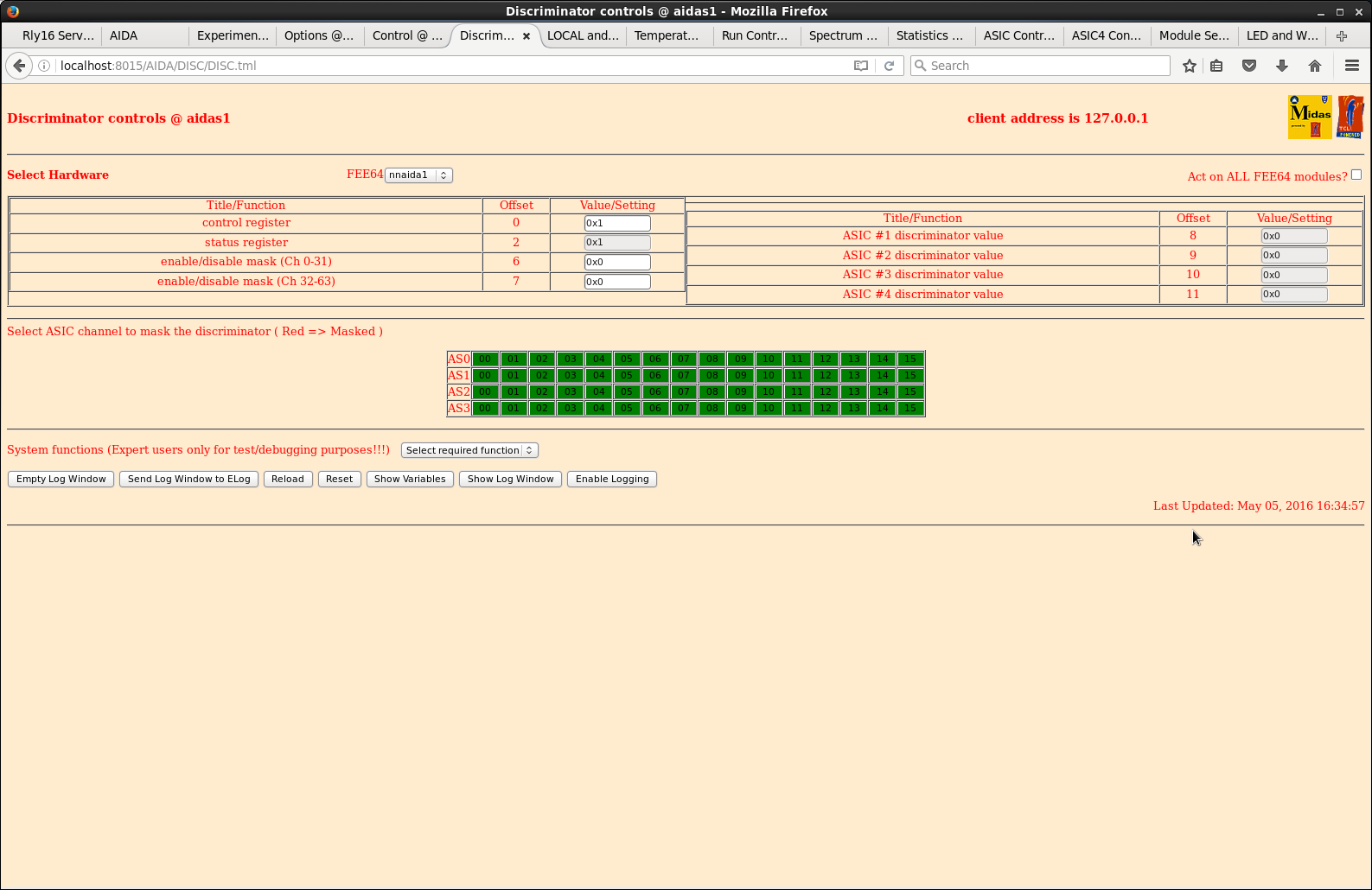
|
|
308
|
Sat Jun 11 15:48:49 2016 |
TD | [How To] Monitor Pause-Resume Times | The basic GREAT data format analyser will report per FEE cumulative
pause-resume times which should be << timestamp elapsed time (which
is time taken to write the data file analysed).
aidas1> ~/td/GREAT/analyser2 /TapeData/NP1512/AIDA40_52
*** GREAT format 3.2.0 analyser - TD - May 2014
*** ERROR: READ I/O error: 5002
blocks: 32000
ADC data format: 147698907 ( 924090.7 Hz)
Other data format: 113421093 ( 709628.6 Hz)
Sample trace data format: 0 ( 0.0 Hz)
Undefined format: 0 ( 0.0 Hz)
Other data format type: PAUSE: 6592 ( 41.2 Hz)
RESUME: 6592 ( 41.2 Hz)
SYNC100: 60971 ( 381.5 Hz)
FEE64 disc: 112649552 ( 704801.4 Hz)
MBS info: 697386 ( 4363.3 Hz)
Other info: 0 ( 0.0 Hz)
ADC data range bit set: 312853 ( 1957.4 Hz)
Timewarps: ADC: 0 ( 0.0 Hz)
PAUSE: 0 ( 0.0 Hz)
RESUME: 0 ( 0.0 Hz)
SYNC100: 1 ( 0.0 Hz)
FEE64 disc: 0 ( 0.0 Hz)
MBS info: 0 ( 0.0 Hz)
Undefined: 0 ( 0.0 Hz)
Sample trace: 0 ( 0.0 Hz)
Timestamp elapsed time: 159.832 s
FEE module #: 1 elapsed dead time 0.030 s
FEE module #: 2 elapsed dead time 0.291 s
FEE module #: 3 elapsed dead time 0.029 s
FEE module #: 4 elapsed dead time 0.000 s
FEE module #: 5 elapsed dead time 0.132 s
FEE module #: 6 elapsed dead time 0.078 s
FEE module #: 7 elapsed dead time 0.000 s
FEE module #: 8 elapsed dead time 0.000 s
FEE module #: 9 elapsed dead time 0.041 s
FEE module #: 10 elapsed dead time 0.000 s
FEE module #: 11 elapsed dead time 0.099 s
FEE module #: 12 elapsed dead time 0.038 s
FEE module #: 13 elapsed dead time 0.000 s
FEE module #: 14 elapsed dead time 0.008 s
FEE module #: 15 elapsed dead time 0.074 s
FEE module #: 16 elapsed dead time 1.036 s
FEE module #: 17 elapsed dead time 0.000 s
FEE module #: 18 elapsed dead time 0.026 s
FEE module #: 19 elapsed dead time 0.000 s
FEE module #: 20 elapsed dead time 0.247 s
FEE module #: 21 elapsed dead time 0.421 s
FEE module #: 22 elapsed dead time 0.024 s
FEE module #: 23 elapsed dead time 1.628 s
FEE module #: 24 elapsed dead time 0.493 s
FEE module #: 25 elapsed dead time 0.000 s
FEE module #: 26 elapsed dead time 0.000 s
FEE module #: 27 elapsed dead time 0.000 s
FEE module #: 28 elapsed dead time 0.000 s
FEE module #: 29 elapsed dead time 0.000 s
FEE module #: 30 elapsed dead time 0.000 s
FEE module #: 31 elapsed dead time 0.000 s
FEE module #: 32 elapsed dead time 0.000 s
*** Program elapsed time: 26.523s ( 1206.480 blocks/s, 75.405 Mb/s) |
|
309
|
Sat Jun 11 16:06:16 2016 |
TD | [How To] Monitor per FEE64 Activity |
Launch terminal and enter commands
setenv MIDASBASE /MIDAS@aidas.240215
setenv PATH $MIDASBASE/bin_Linux64:$PATH
MIDAS64-session
From the pop-up select 'MIDAS Data Analysis'
From 'MIDAS Base Frame' select 'Sort Tool'
From 'MIDAS Sort (64 bit) Control Frame' select 'Browse' and select 'sort2b.f' from the pop-up
From 'MIDAS Sort (64 bit) Control Frame' select 'Compile Sortfile'
From 'MIDAS Sort (64 bit) Control Frame' select 'Disk Info'
From 'MIDASsort Disk Info' select 'Browse' and select the latest complete file from the current
run from the data dietcory (currently /TapeData/NP1512)
From 'MIDASsort Disk Info' select 'Add'
From 'MIDASsort Disk Info' select 'Quit'
From 'MIDAS Sort (64 bit) Control Frame' select 'Start'
The terminal from which MIDAS was launched will report messages from MIDASsort
and end of sort
From 'MIDAS Sort (64 bit) Control Frame' select 'View Spectra'
From 'Sort Spectrum Directory Browser' select spectra s3501-s3524 which display
spectra showing (ADC) timestamps per FEE (s3501 = nnaida1, s3502 = nnaida2 etc)
The 65k spectra are rolling and the scale is 1ch = 0.1s.
Examine the activity of each FEE for extended (>1s) periods of inactivity.
When the sort is complete from 'MIDAS Sort (64 bit) Control Frame' select 'Pause' then 'Kill'
|
|
208
|
Thu May 5 07:55:32 2016 |
TD | [How To] Mount SAS and USB disks |
*******************************************************************************************************
UPDATE 24 May 2016
3x WDC WD30EFRX ATA 3Tb disks added to aidas1 LVM configuration - see https://elog.ph.ed.ac.uk/AIDA/233
*******************************************************************************************************
Reminder
The additional 3x 3Tb disks (and the USB 8Tb disk currently attached to
aidas1) are not included in the aidas1 /etc/fstab file and do *not* have
fixed device names, i.e. the device name of each disk can change at each
reboot.
The Fix
To avoid this problem for the 3x 3Tb disks Vic suggests converting them
from ext4 format to lvm format and 'appending' each disk volume to /data10
(which is already lvm). This will require re-formatting disks /data20, 30
& 40. Backups (and checks) have now been performed for /data20, 30 & 40.
I will re-format these disks upon my return to RIKEN May 22.
The Workaround
Mount the disks manually as superuser.
How to work out which device is associated with which disk?
From SL6 window header select Applications -> System Tools -> Disk Utility
N.B. BE VERY CAREFUL USING THIS TOOL!
In the Disk Utility window a list of storage devices will be shown on the
left hand side - you will be interested in the 3x 2.2Tb Hard Disks attached
to the SAS Host Adaptor *and* the USB 8.0Tb Hard Disk attached to peripheral
devices.
Select the required device - drive and volumes information will appear on
the right hand side of the Disk Utility window - check the disk label and
device shown in the volumes section.
For example - if the selected device volume information is label 'data20'
and device '/dev/sdf1' you can mount the disk as superuser with the command
mount -t ext4 /dev/sdf1 /data20
To mount the USB disk (having obtained the device name as above) you can
mount the disk as superuser with, for example, the command
mount -t ntfs-3g /dev/sda2 /ntfs |
| Attachment 1: 301.png
|
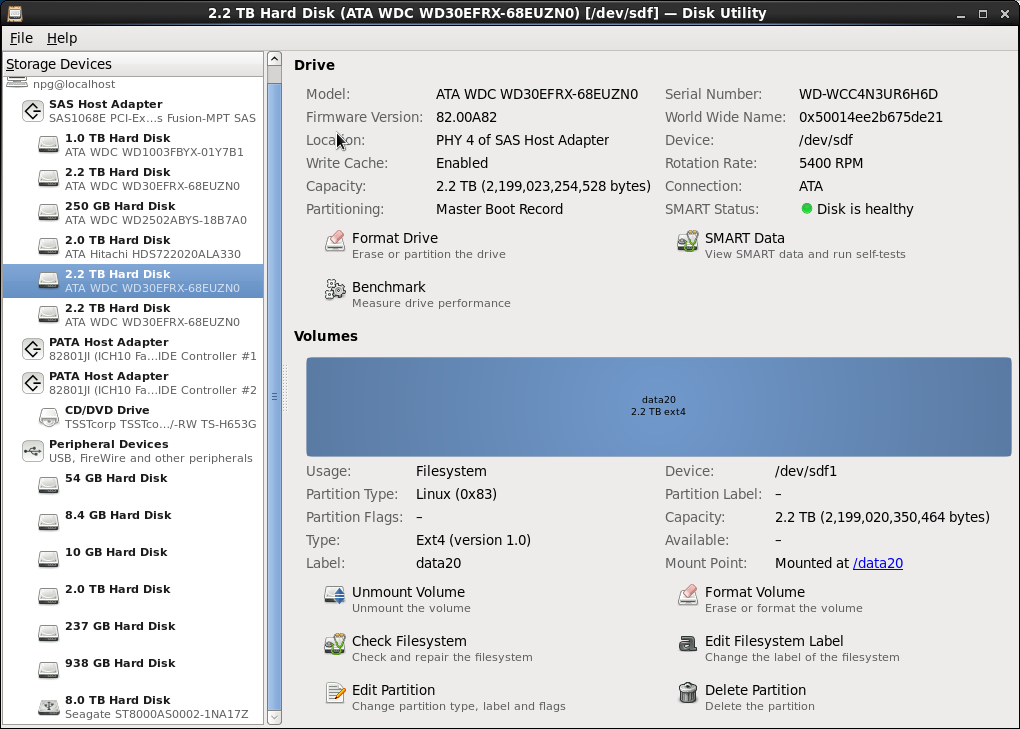
|
| Attachment 2: 302.png
|
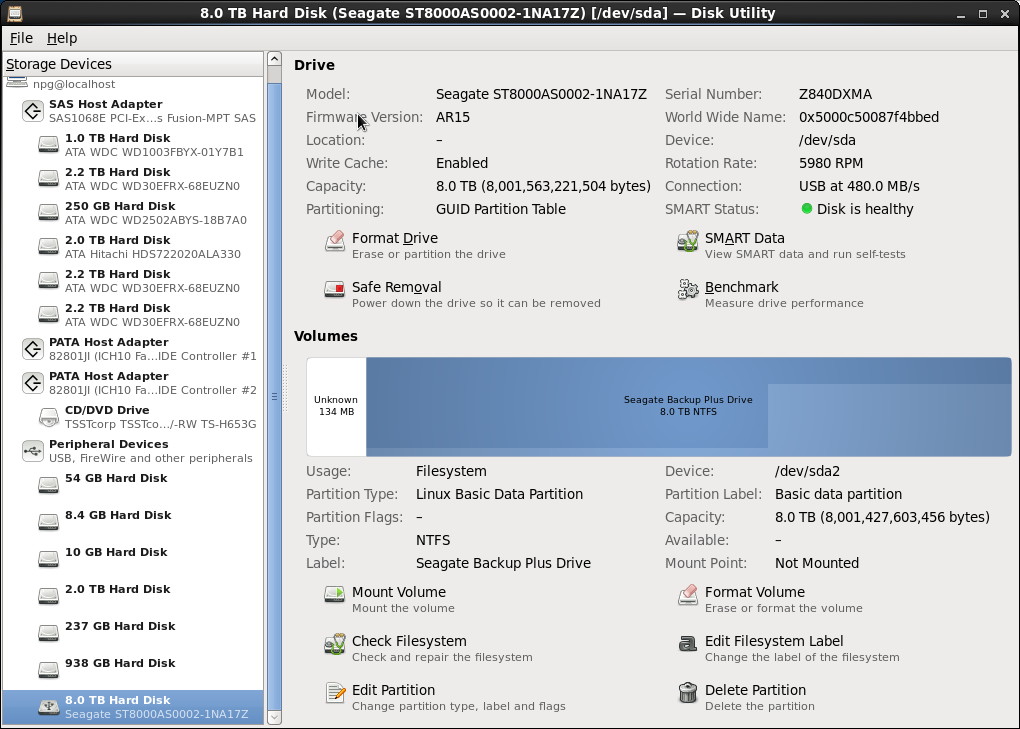
|
|